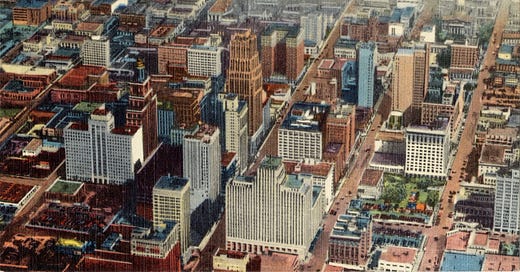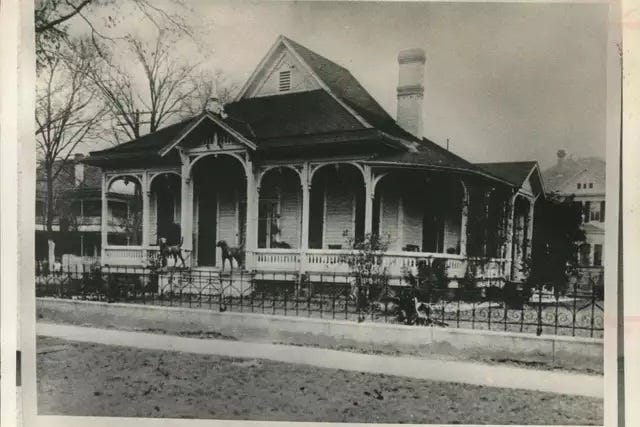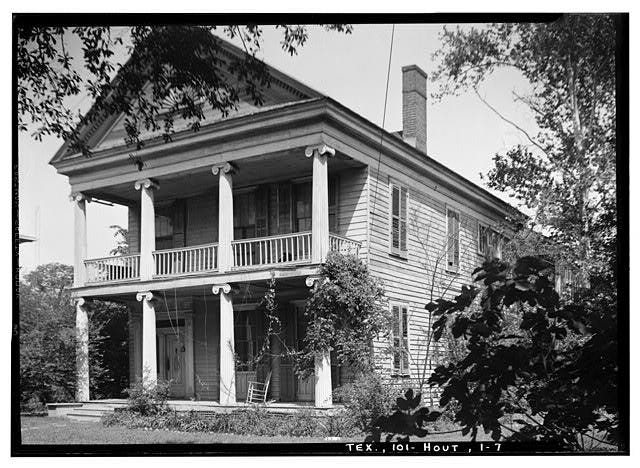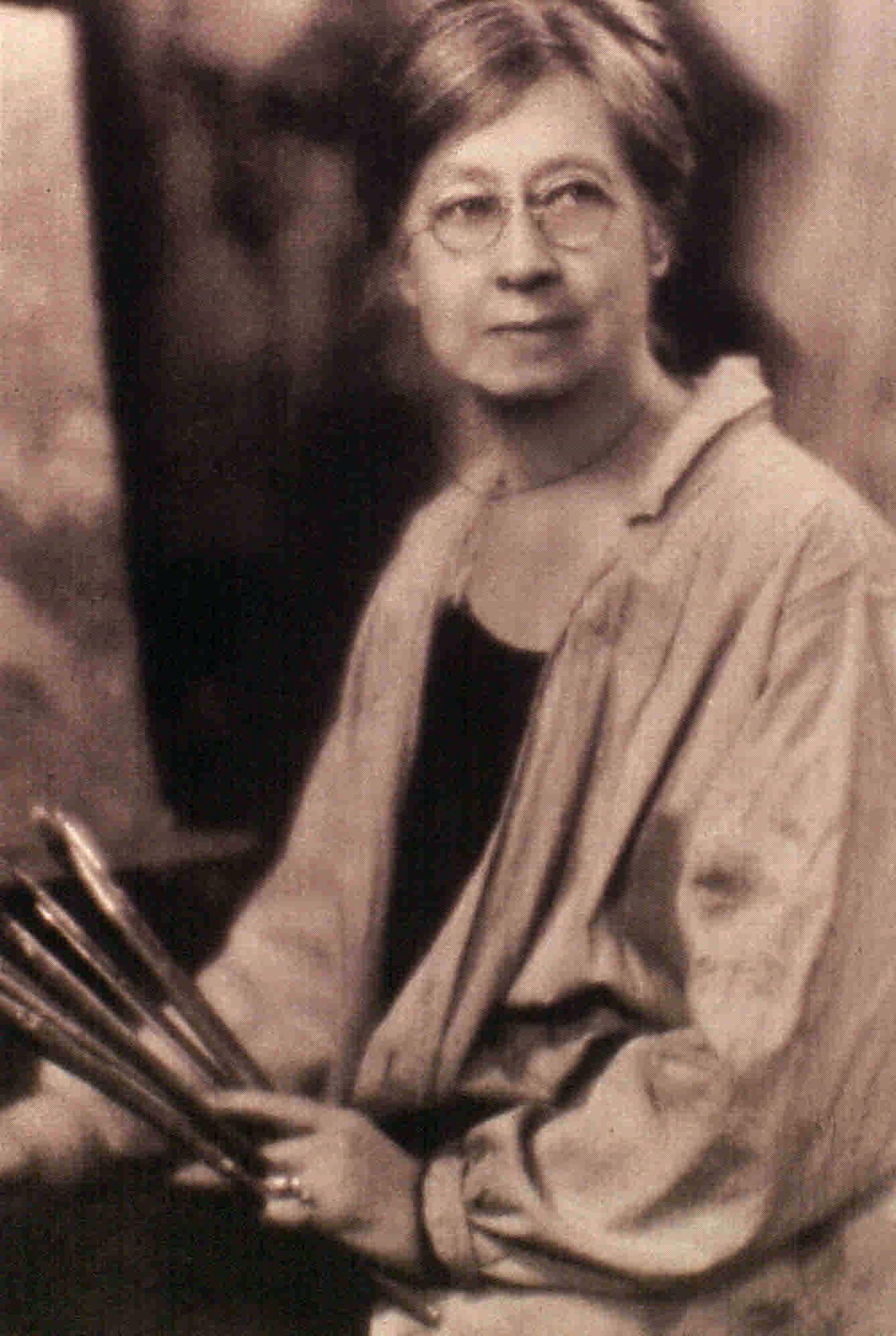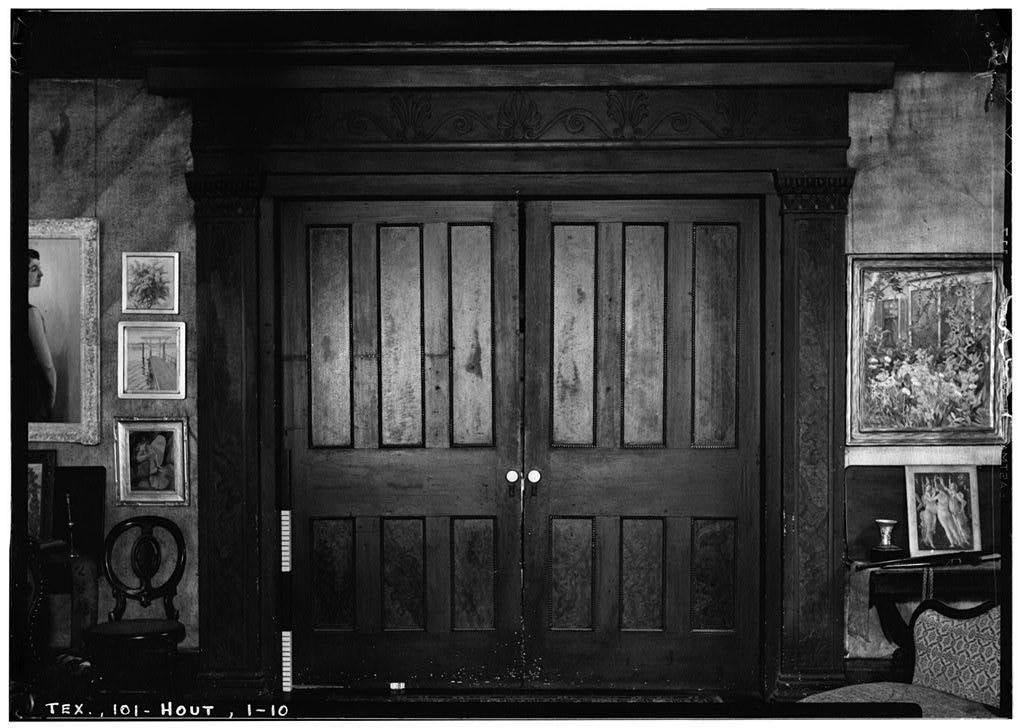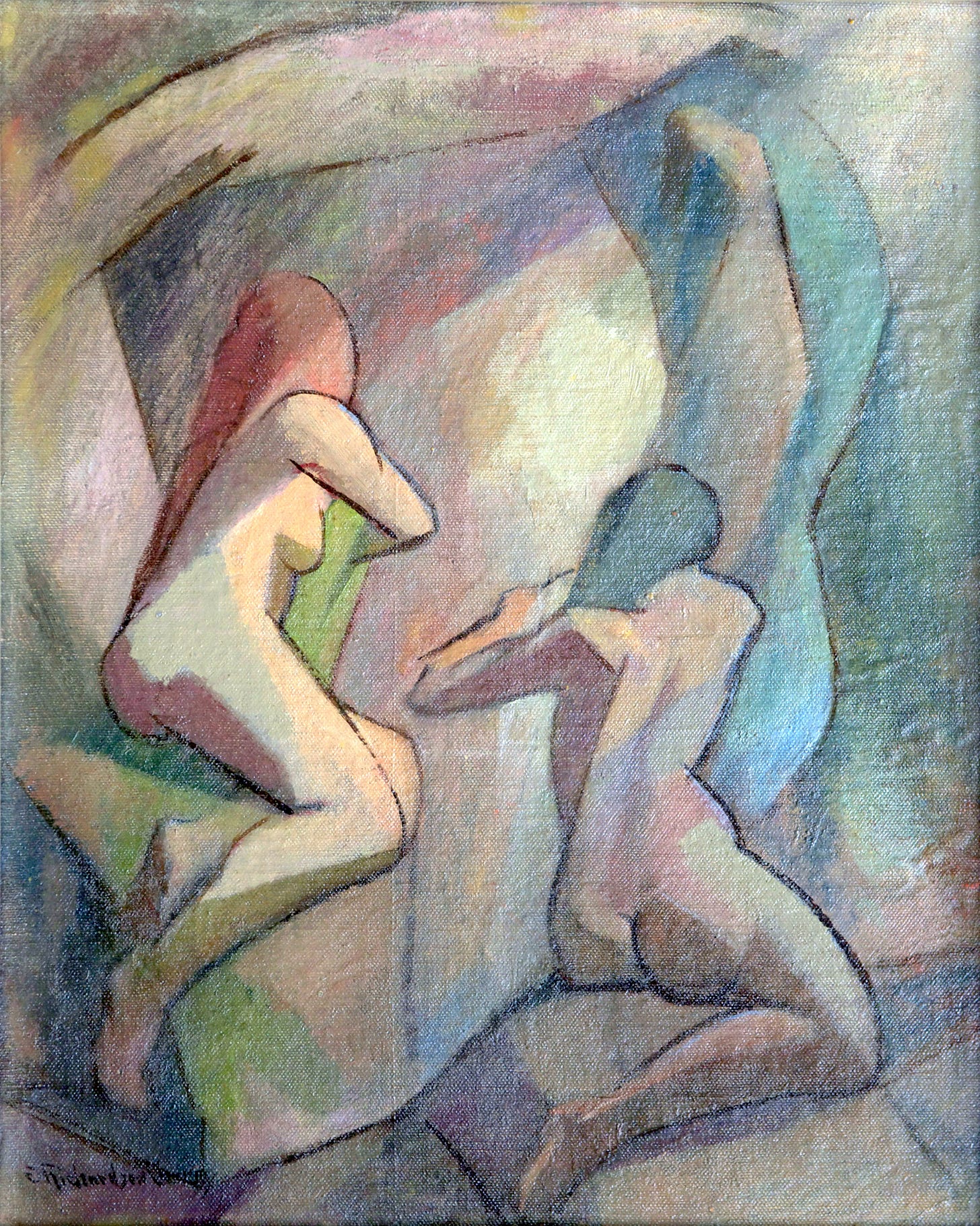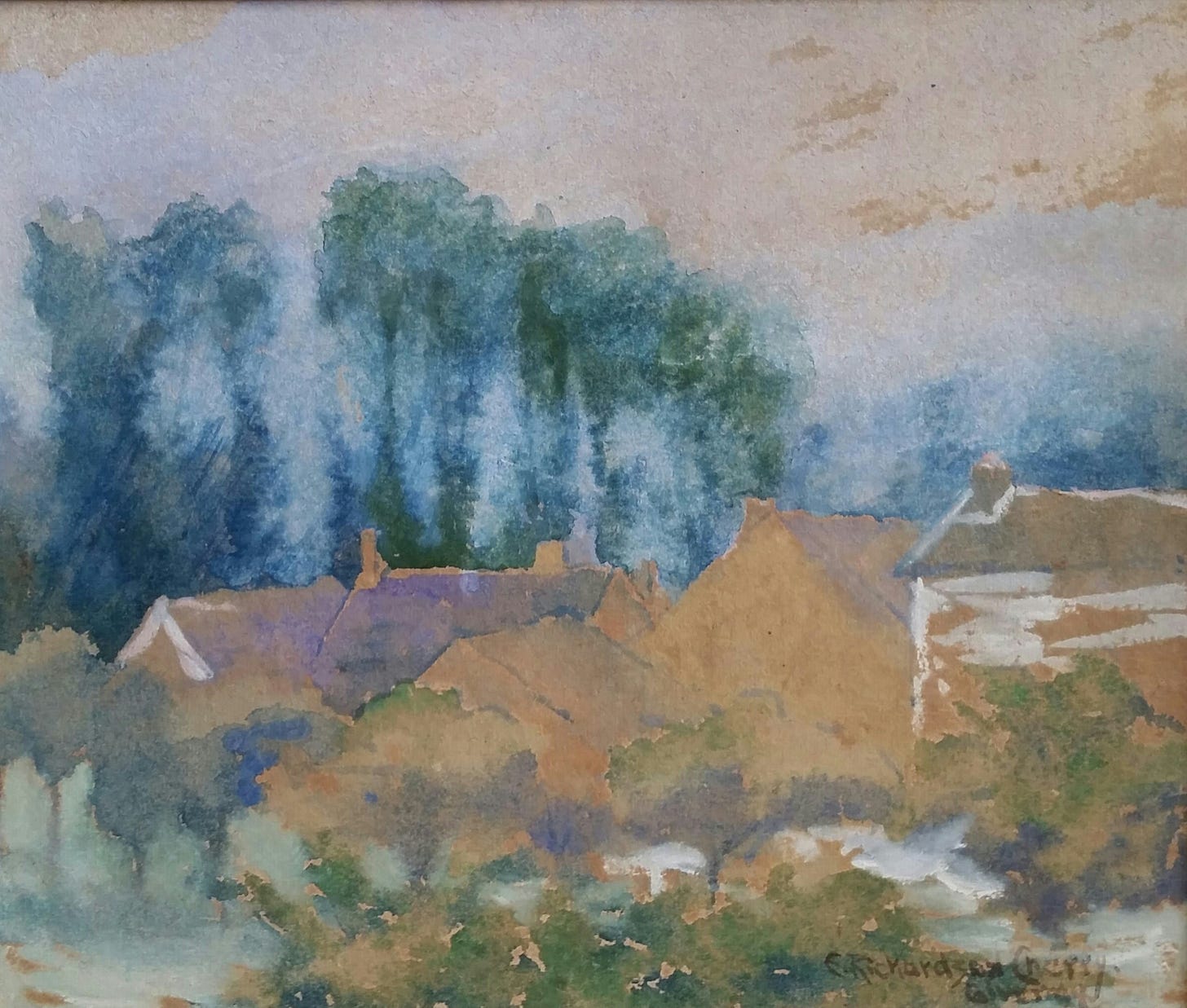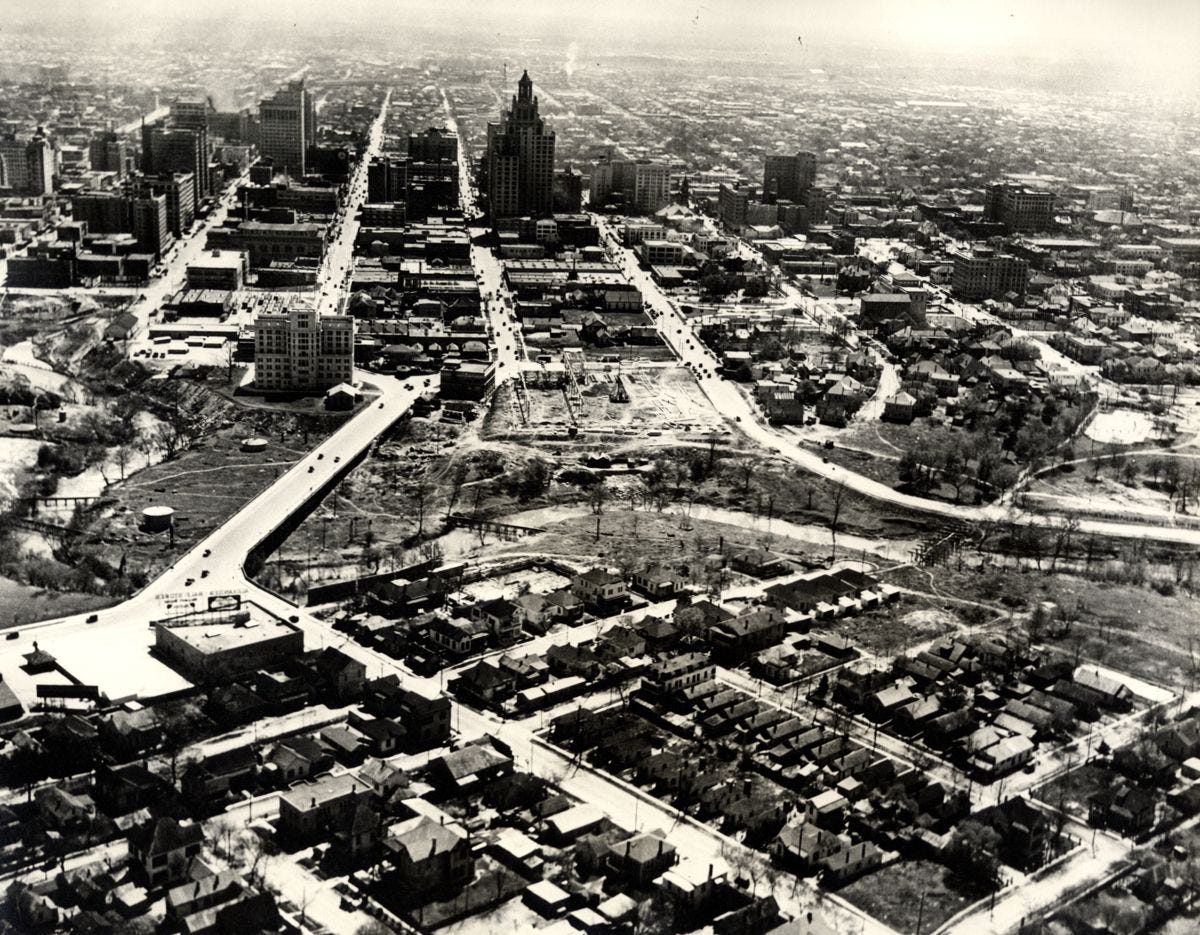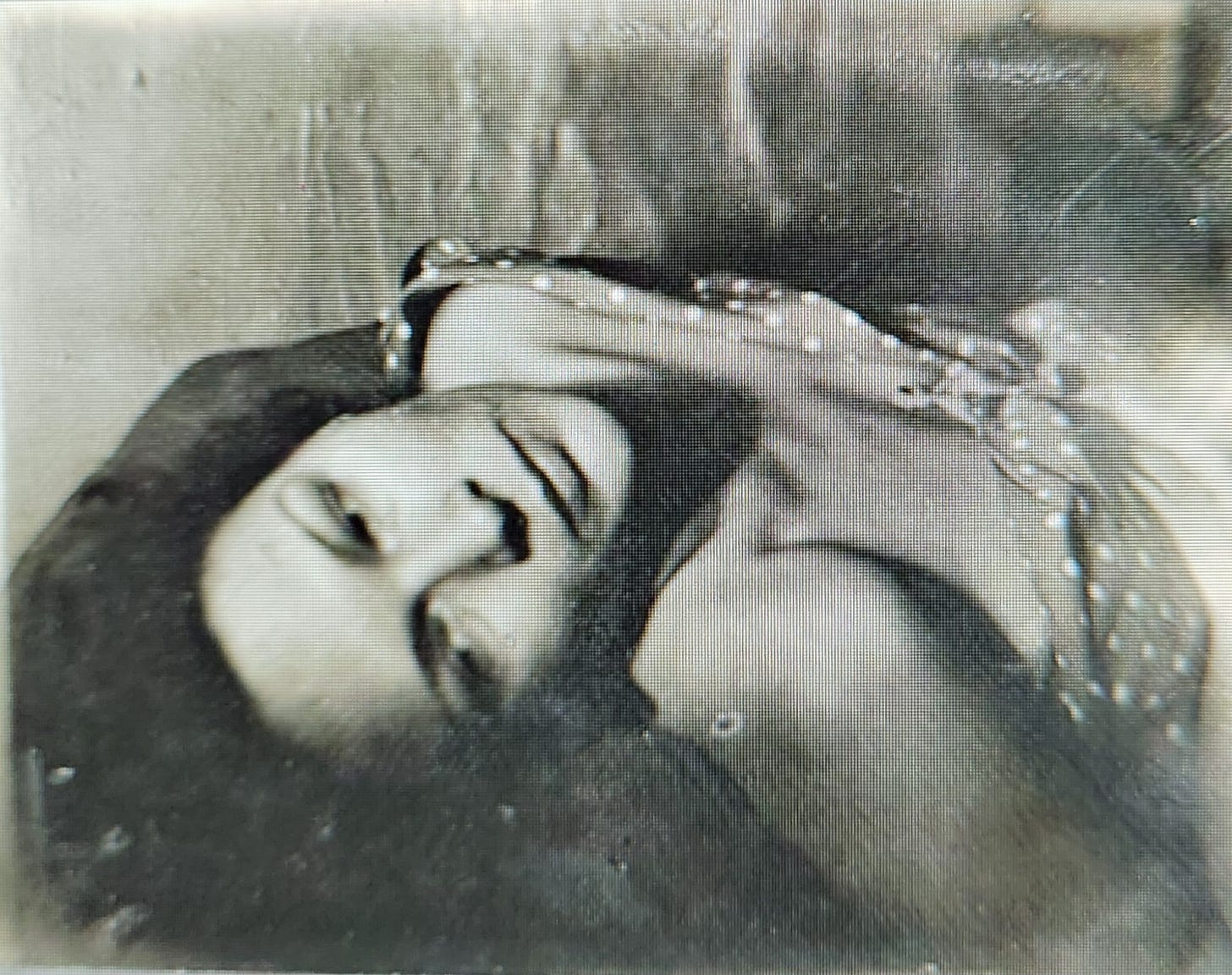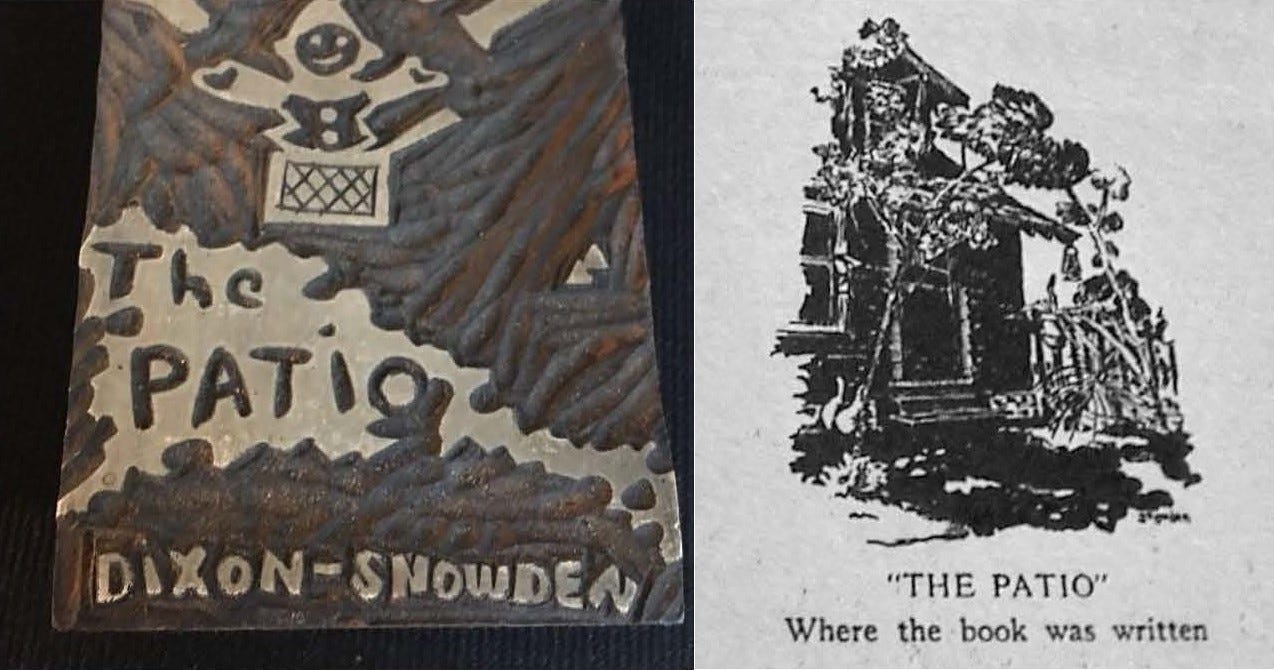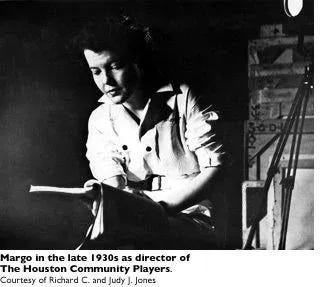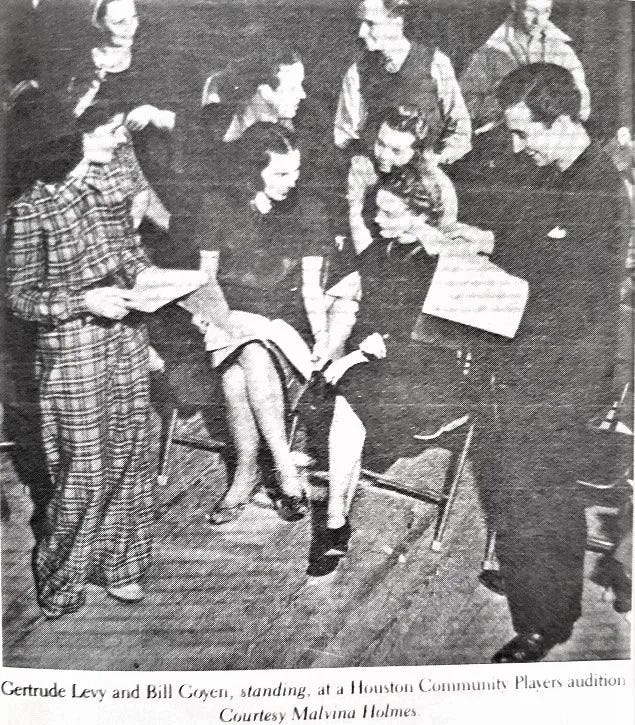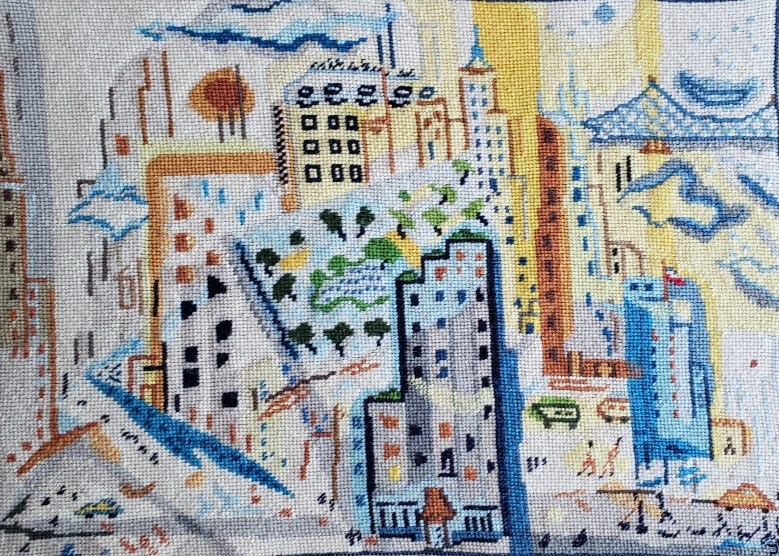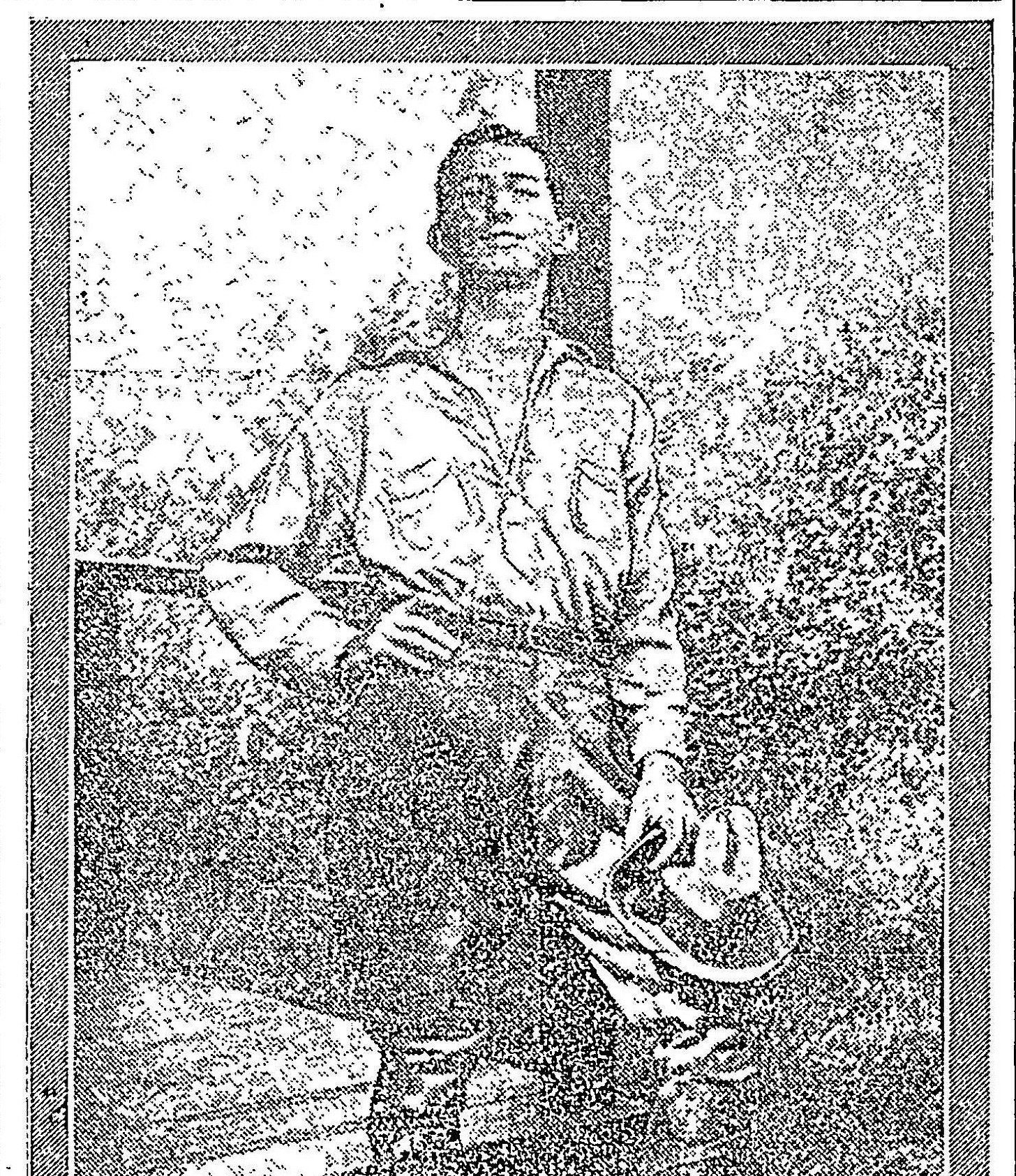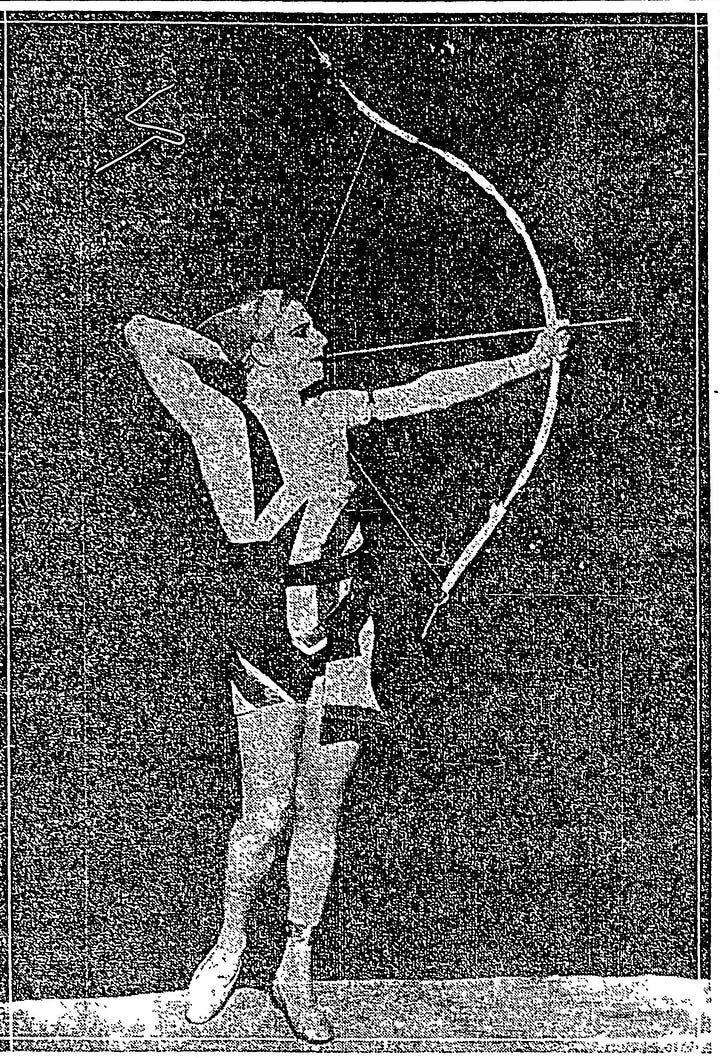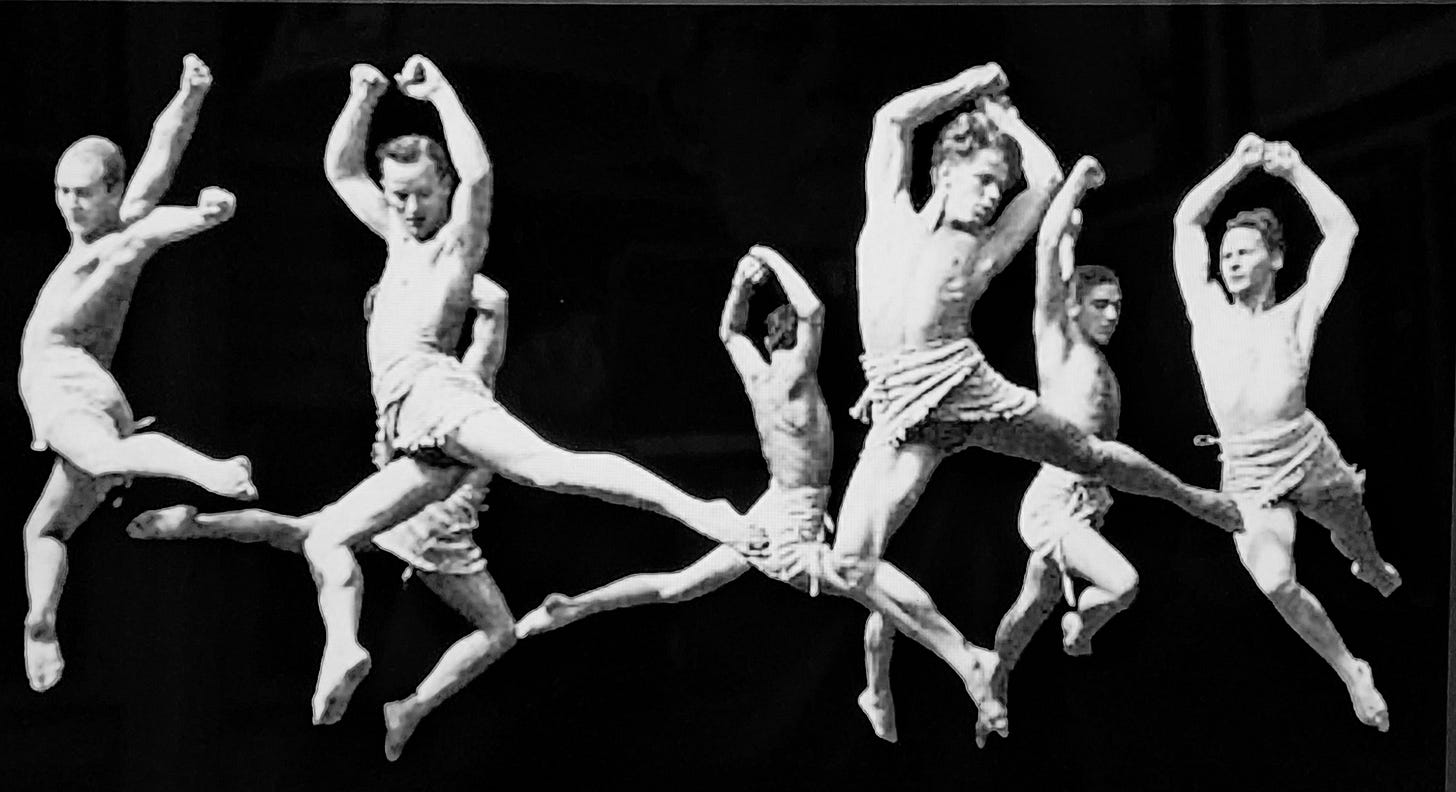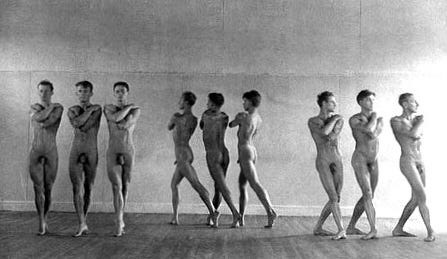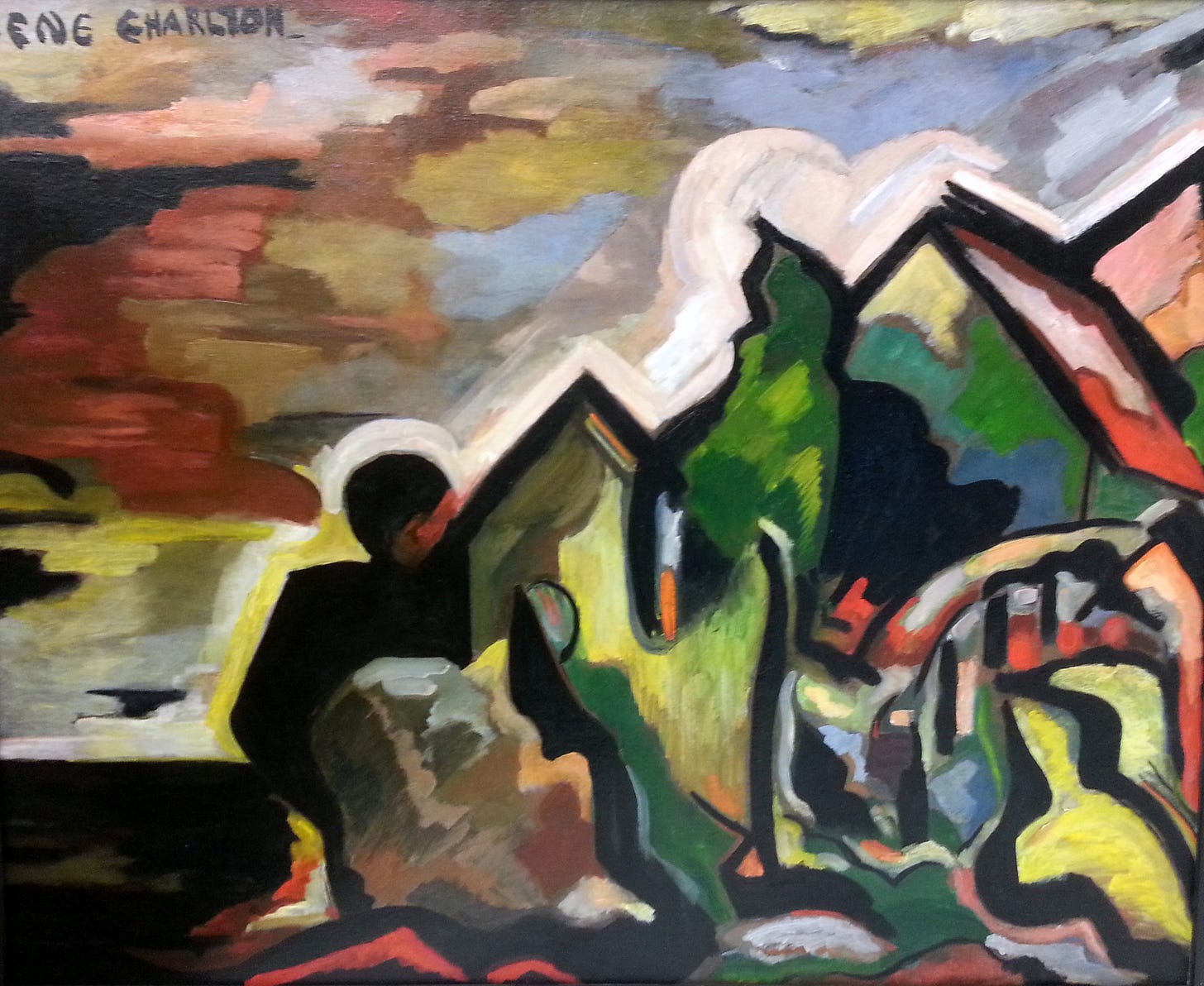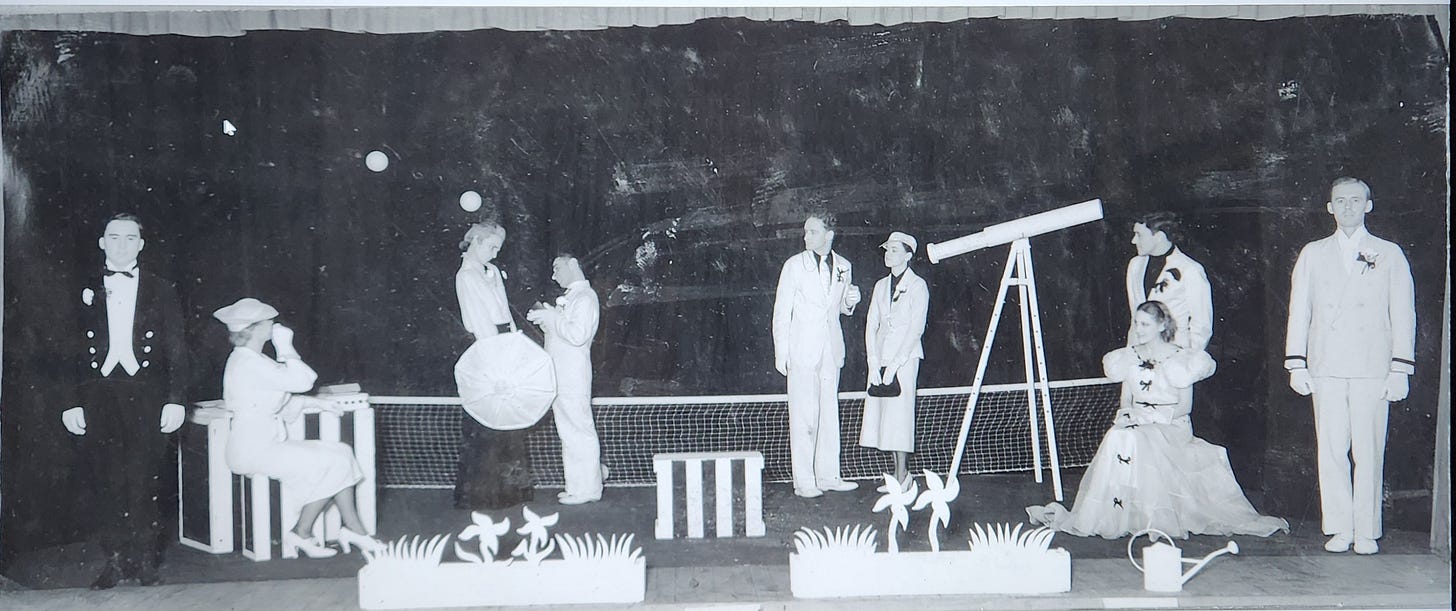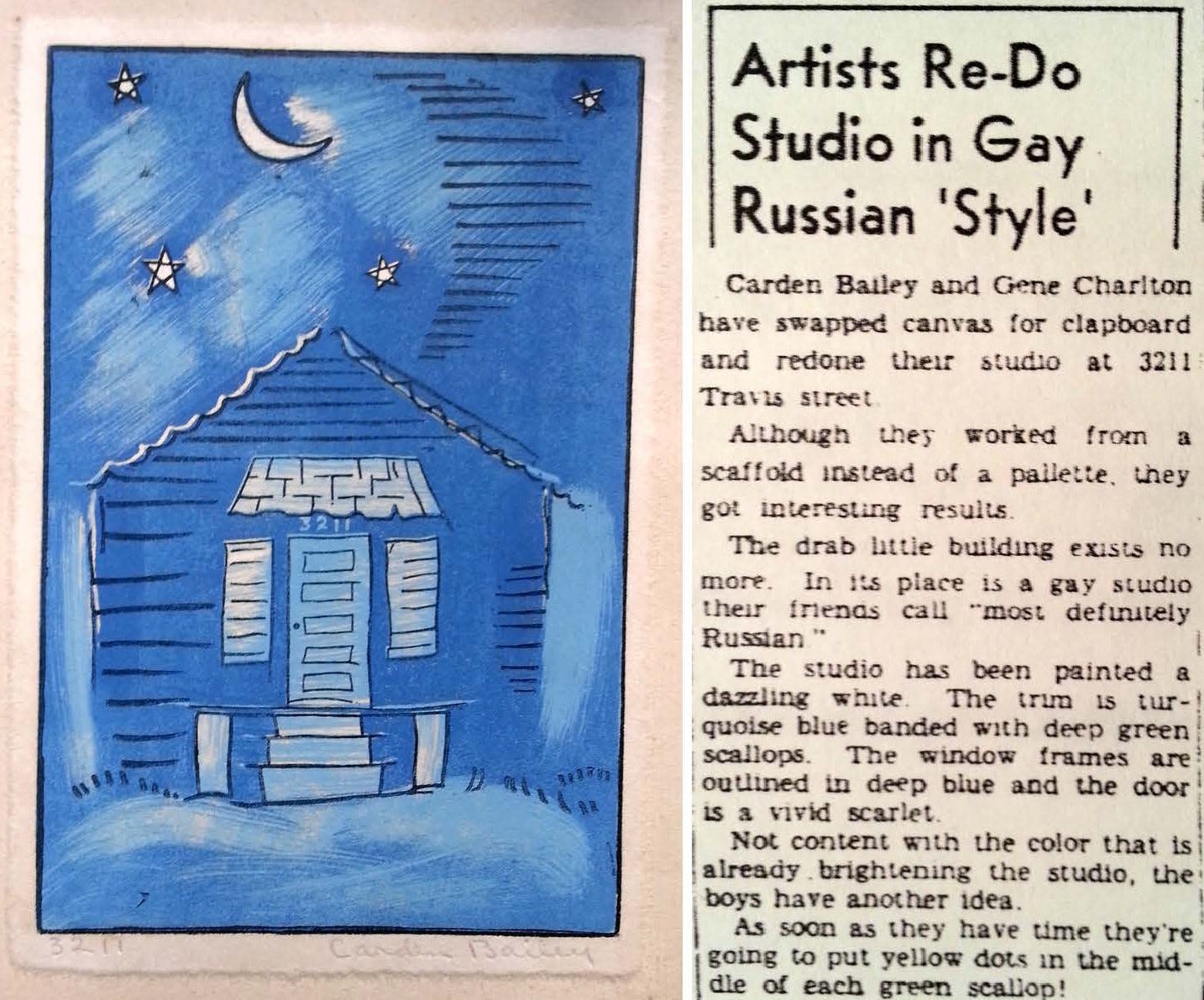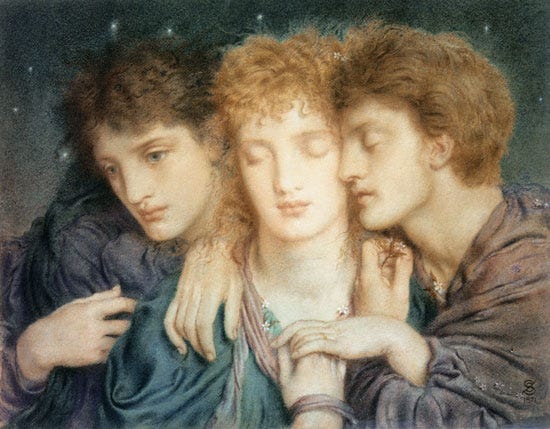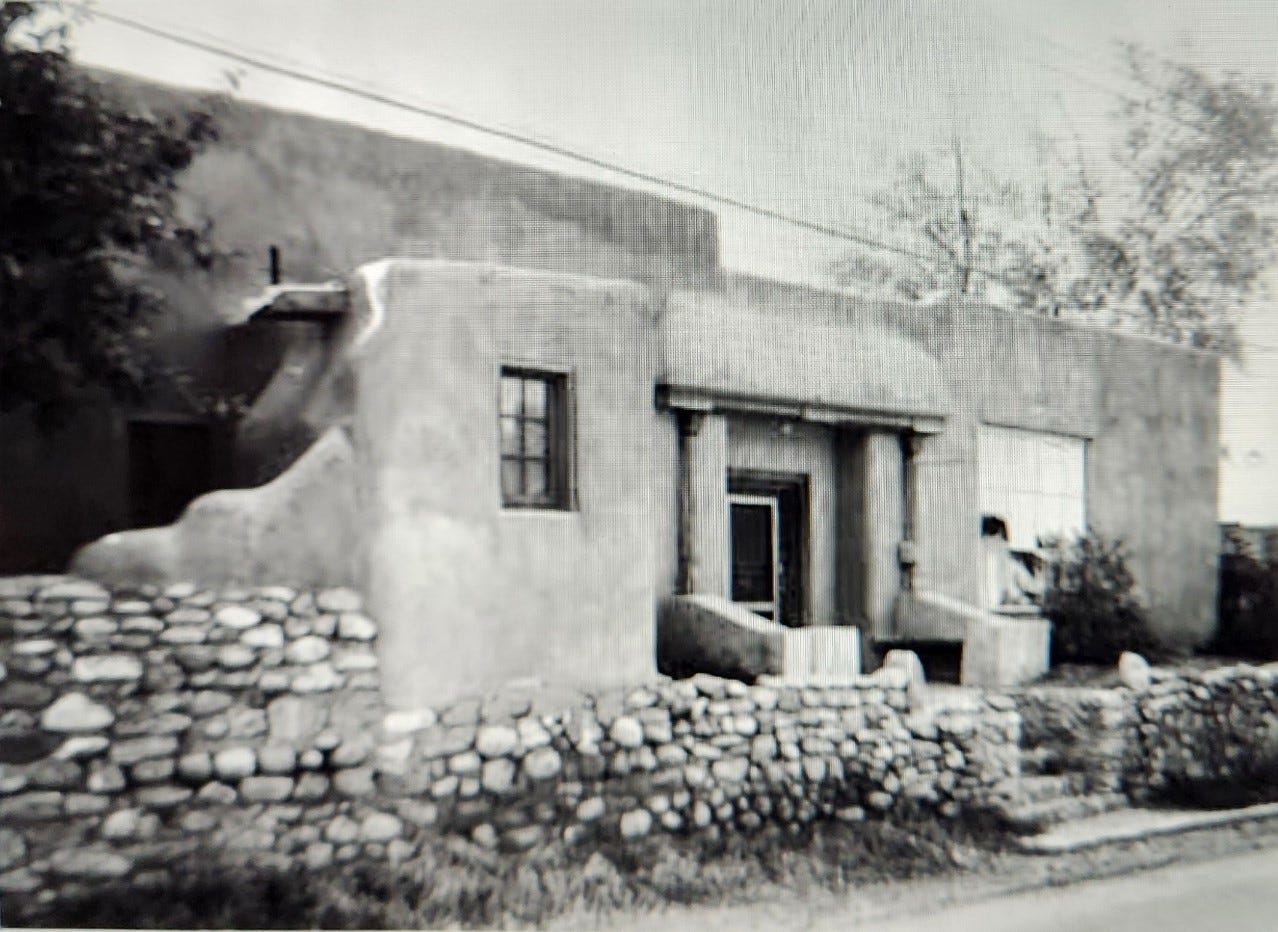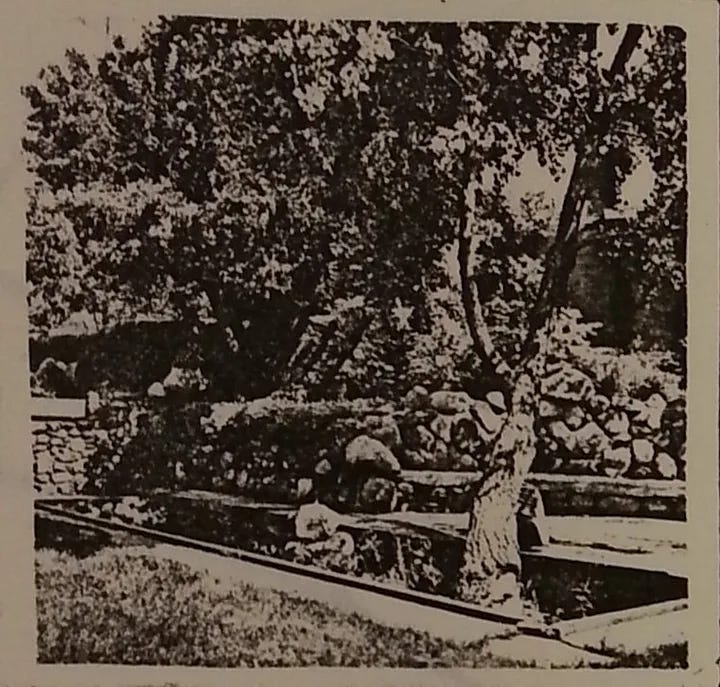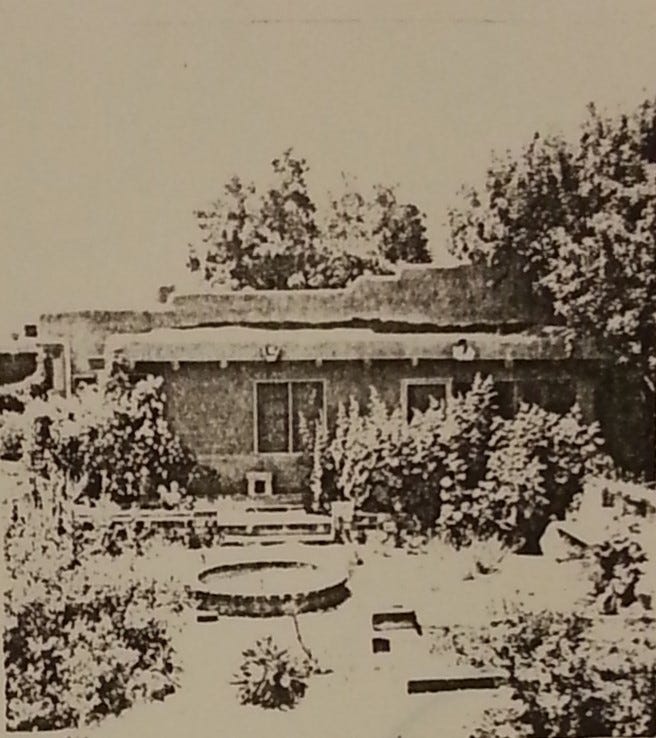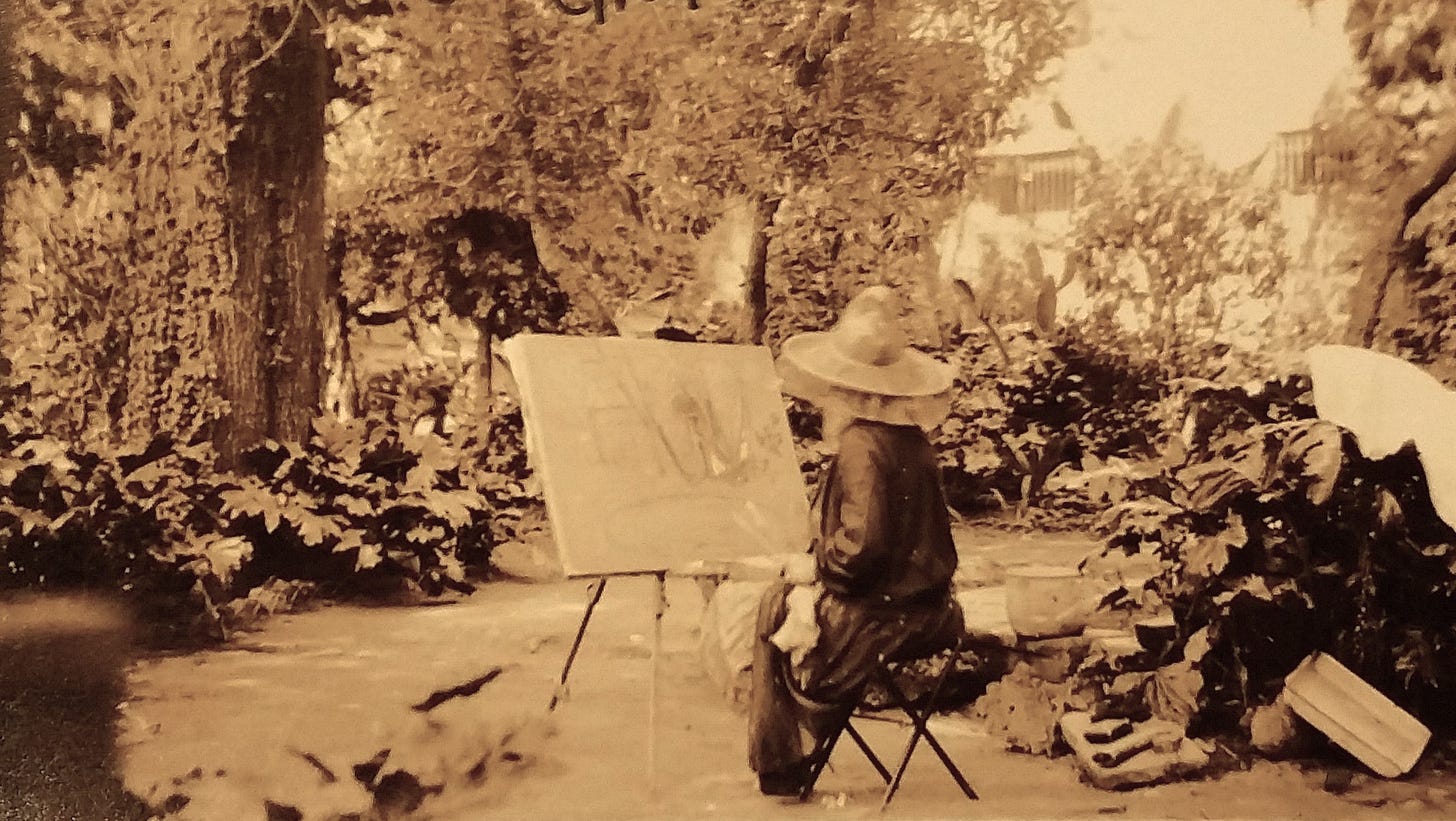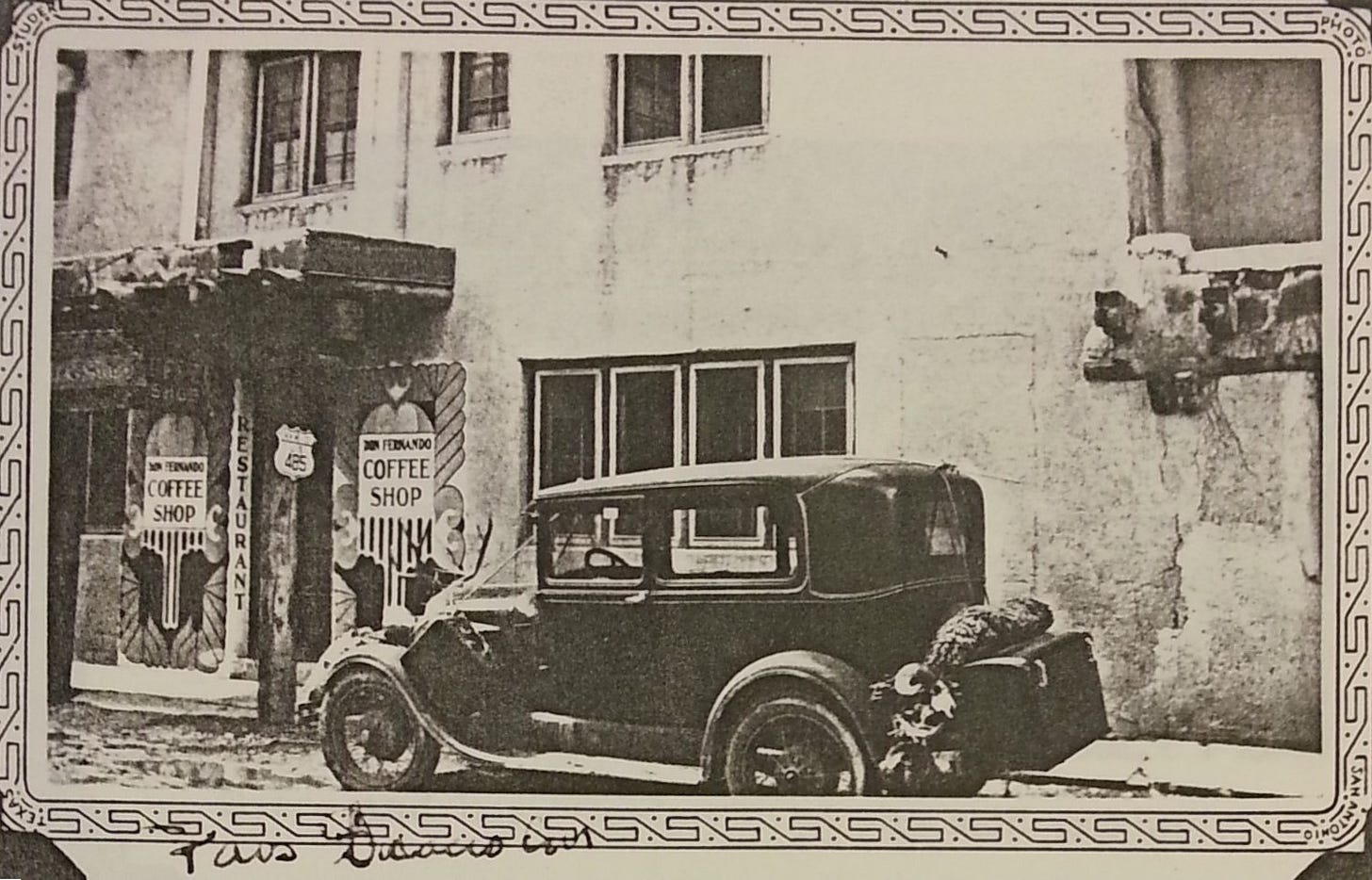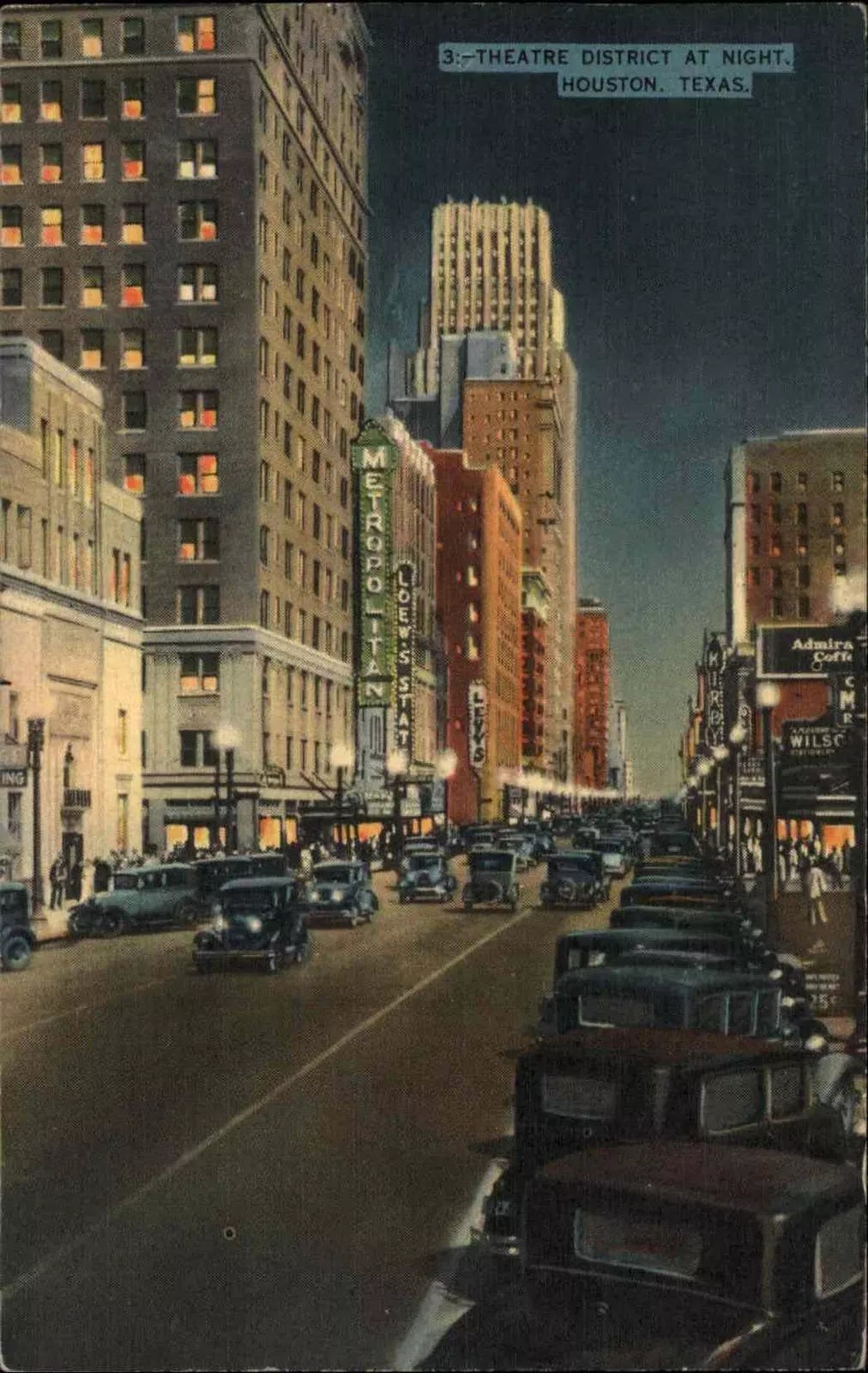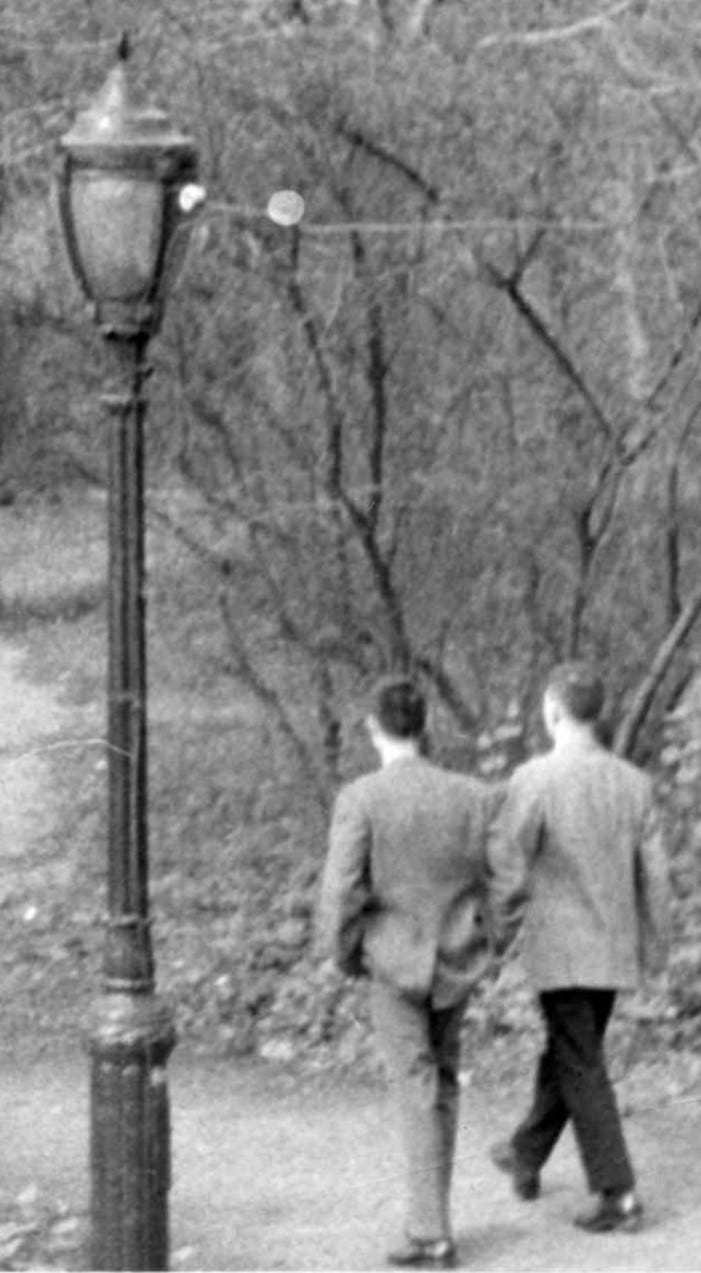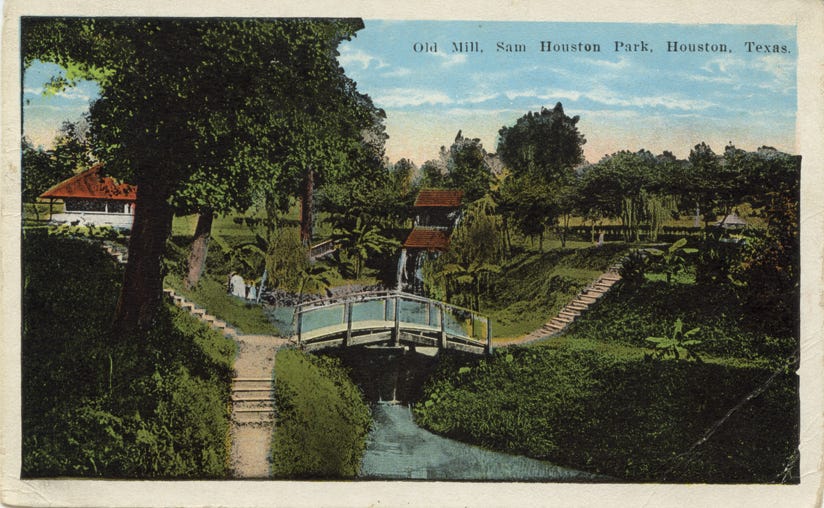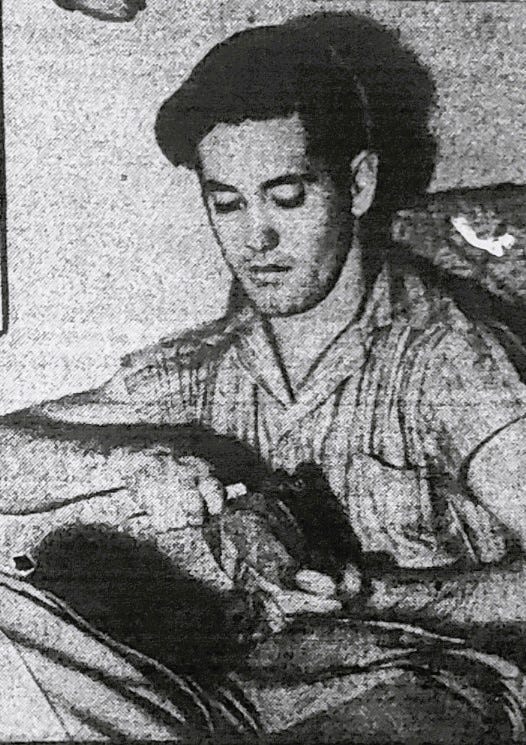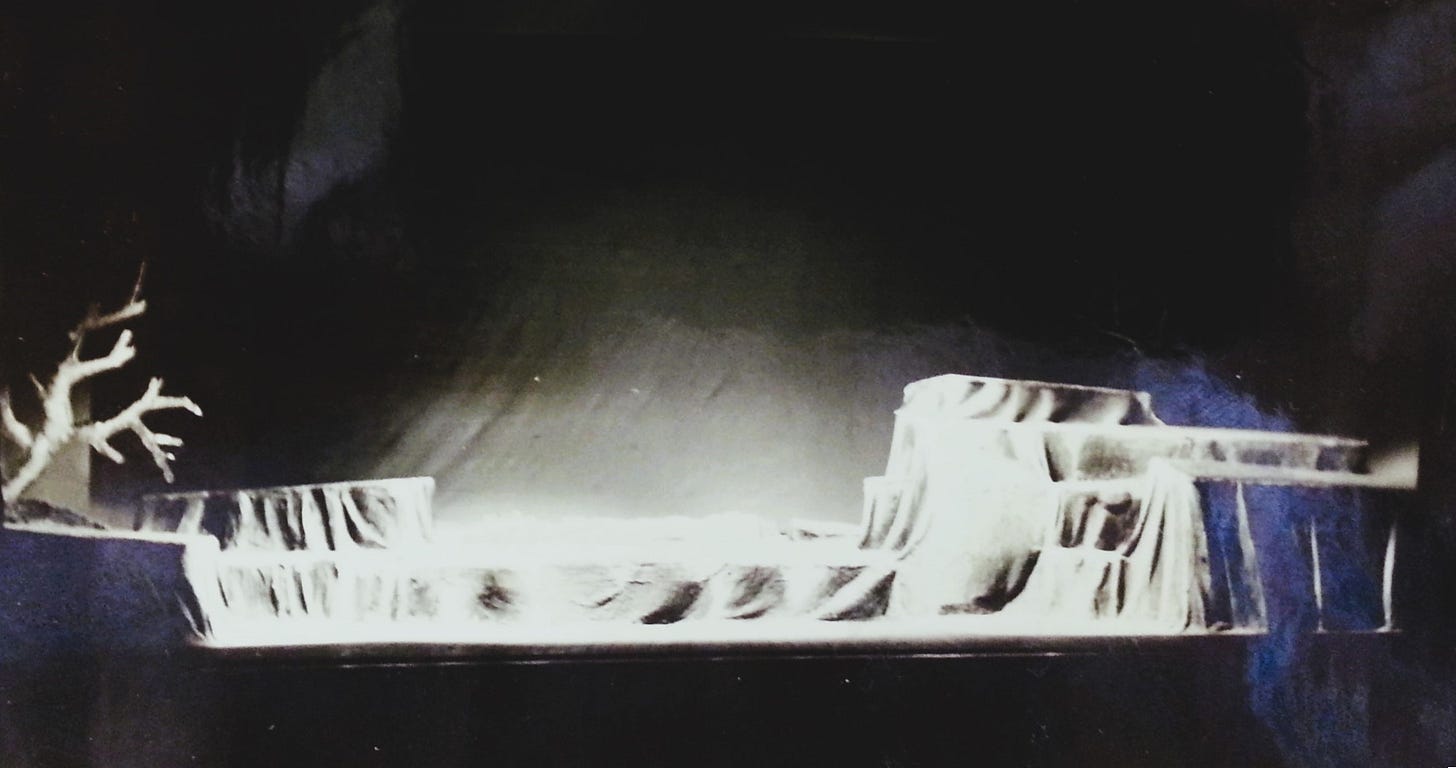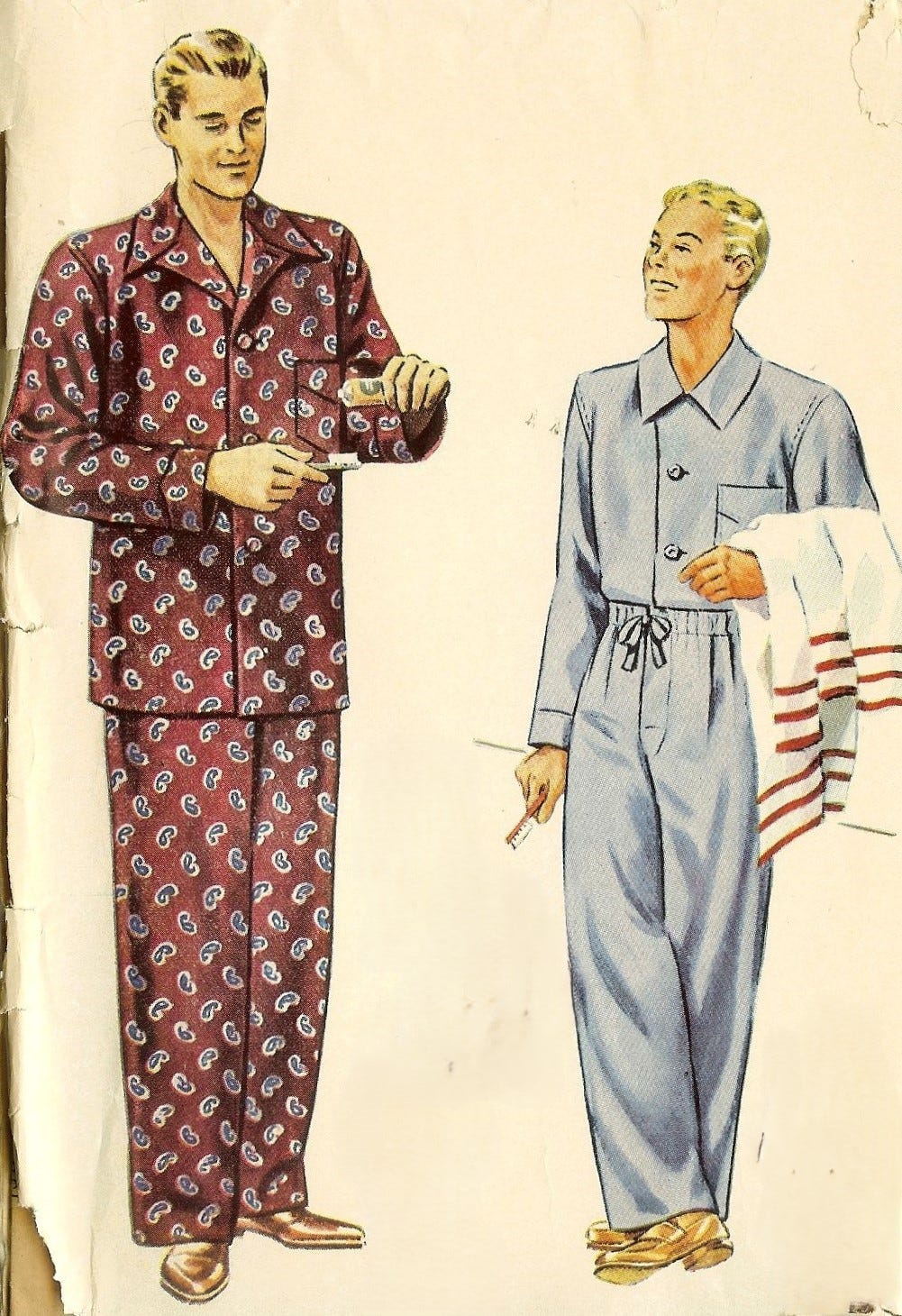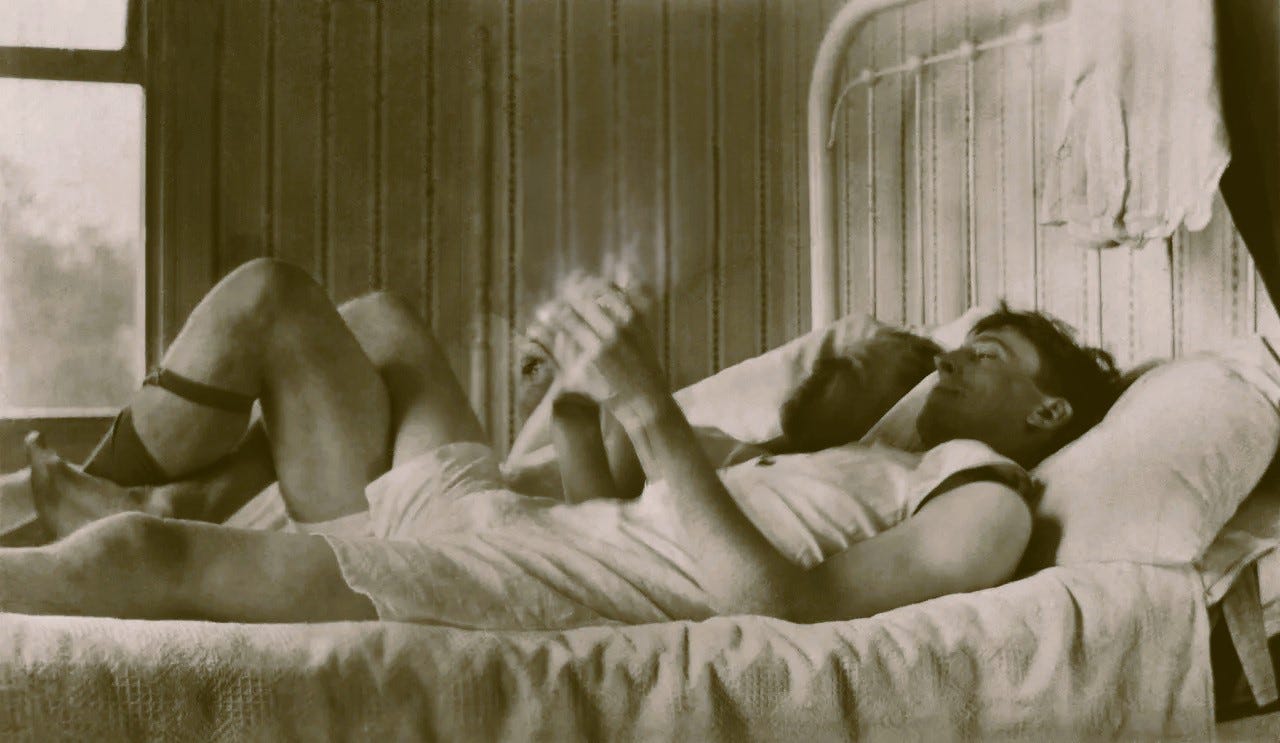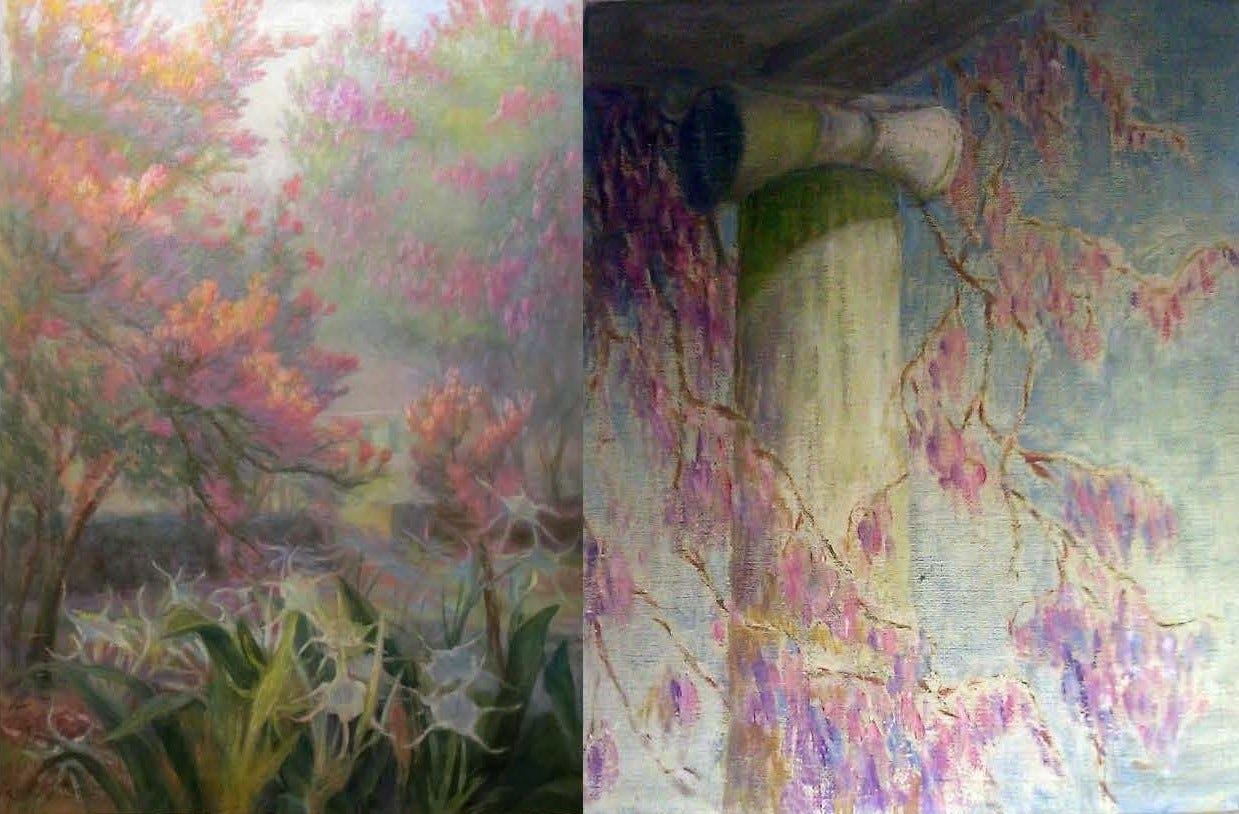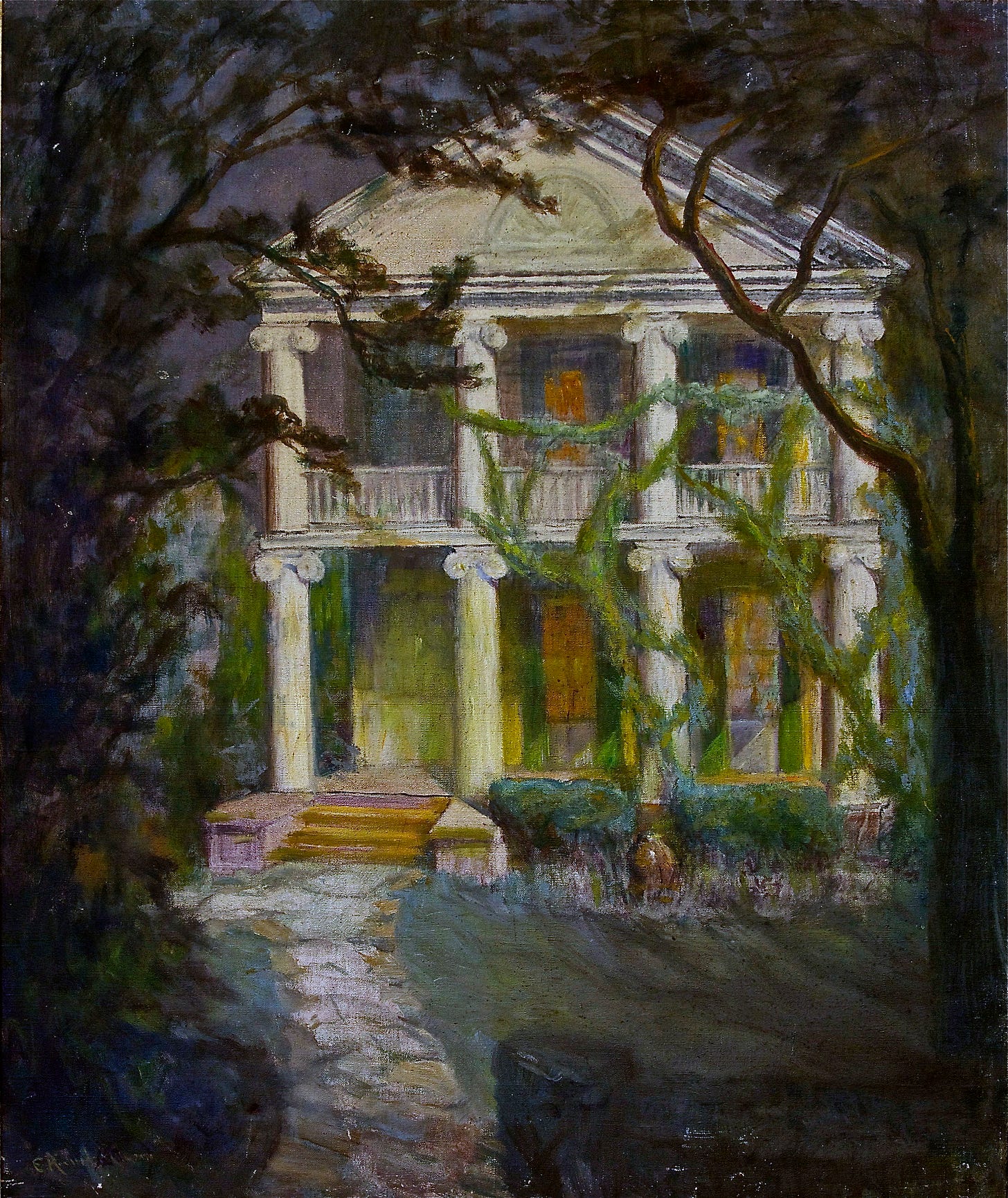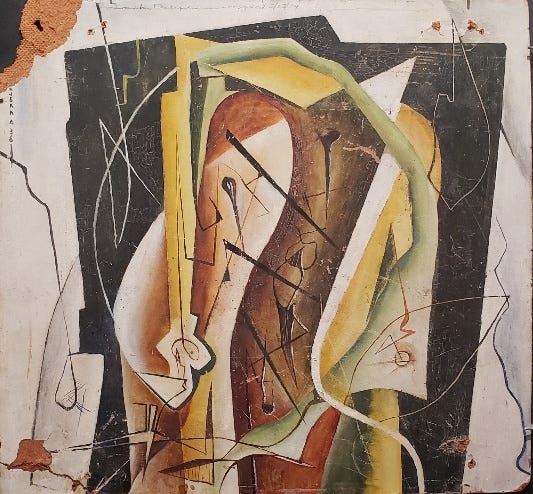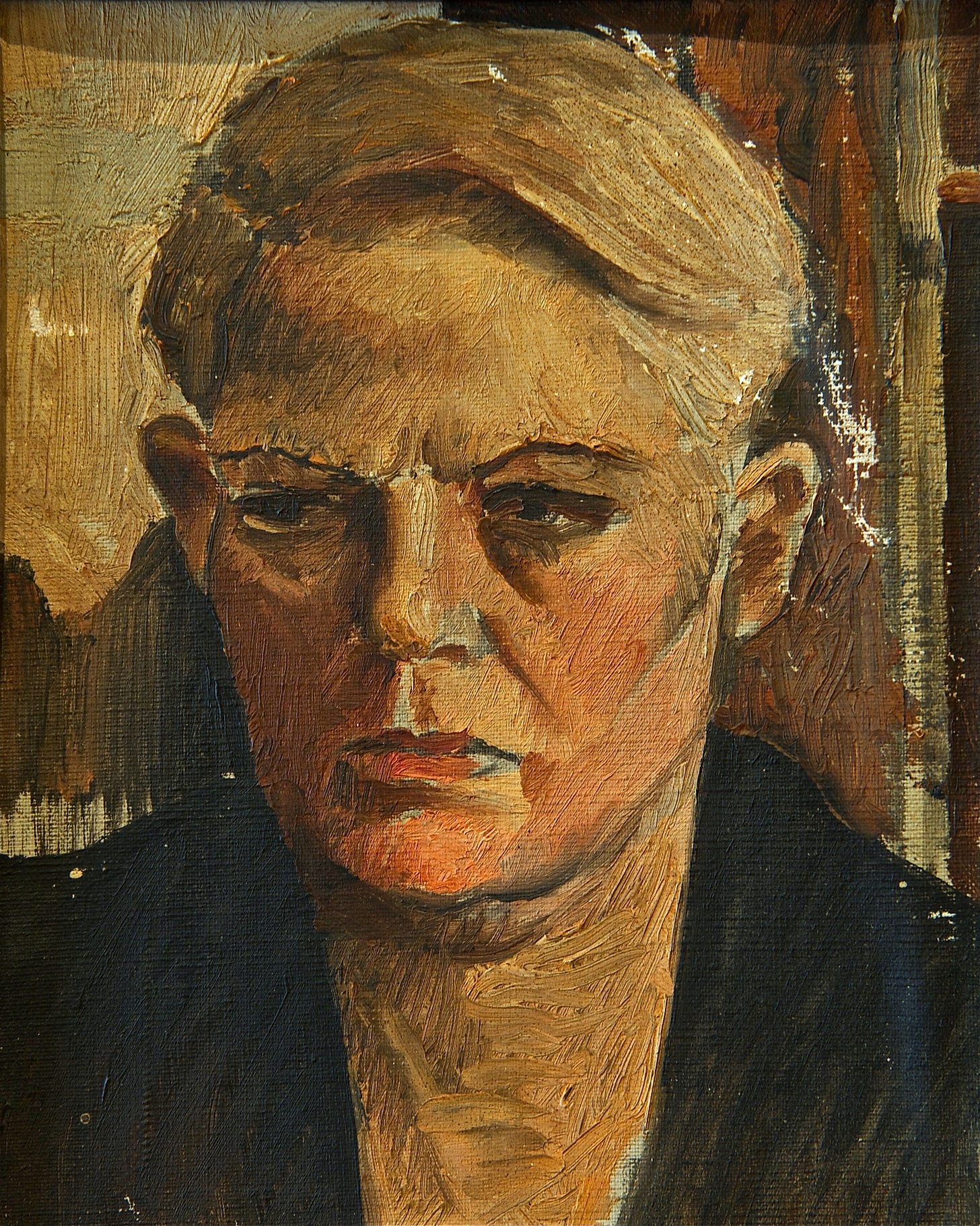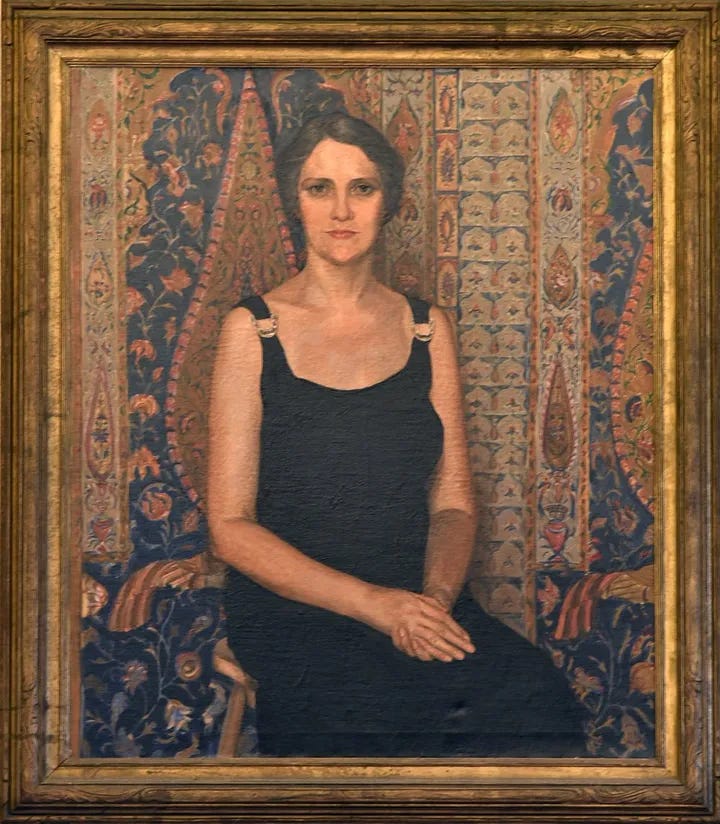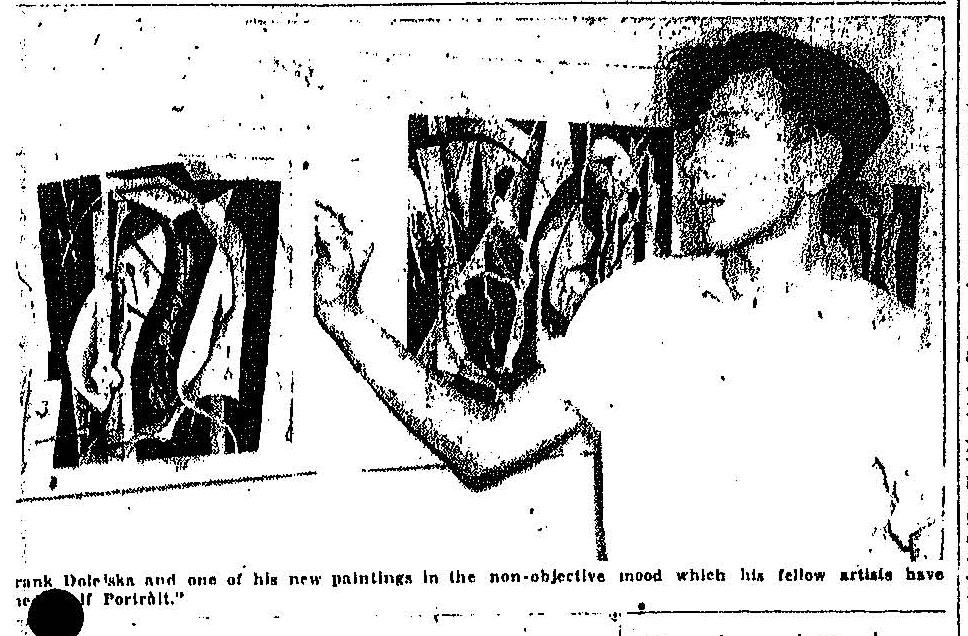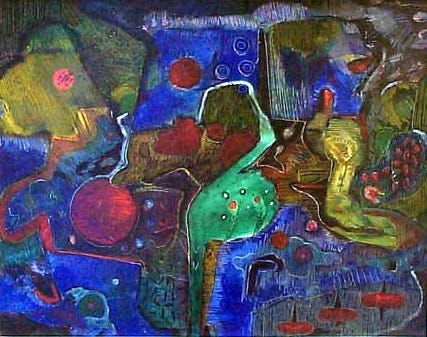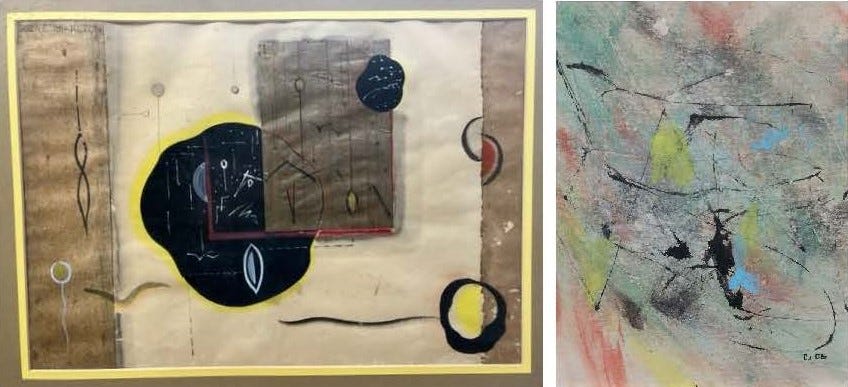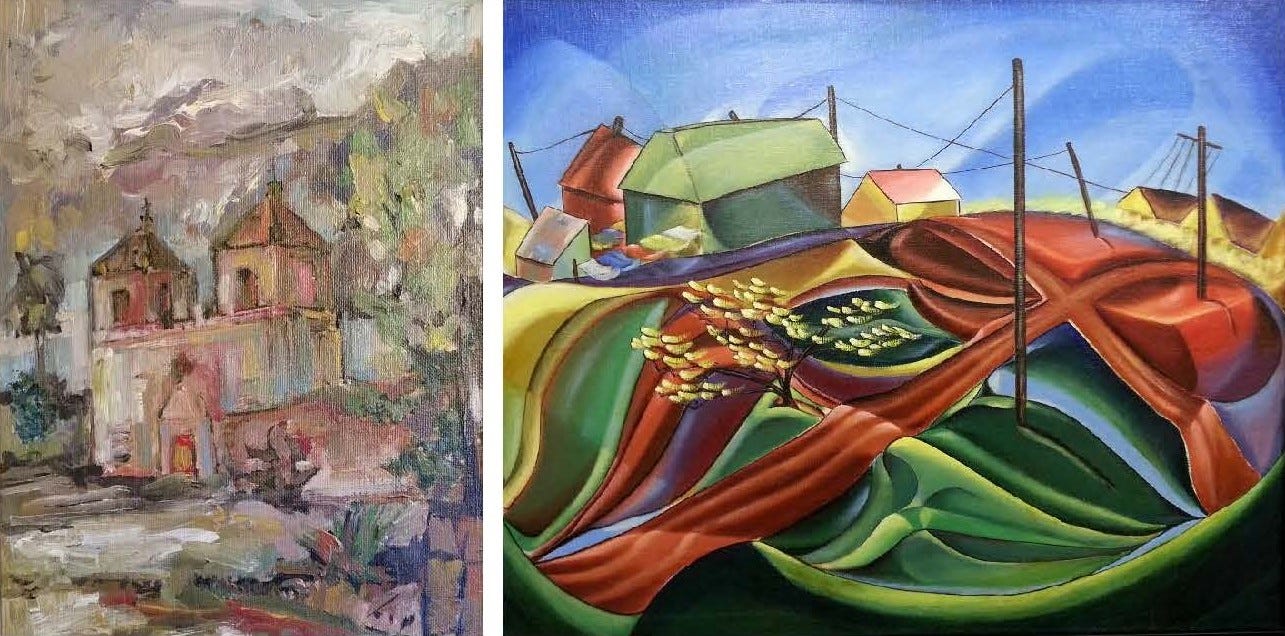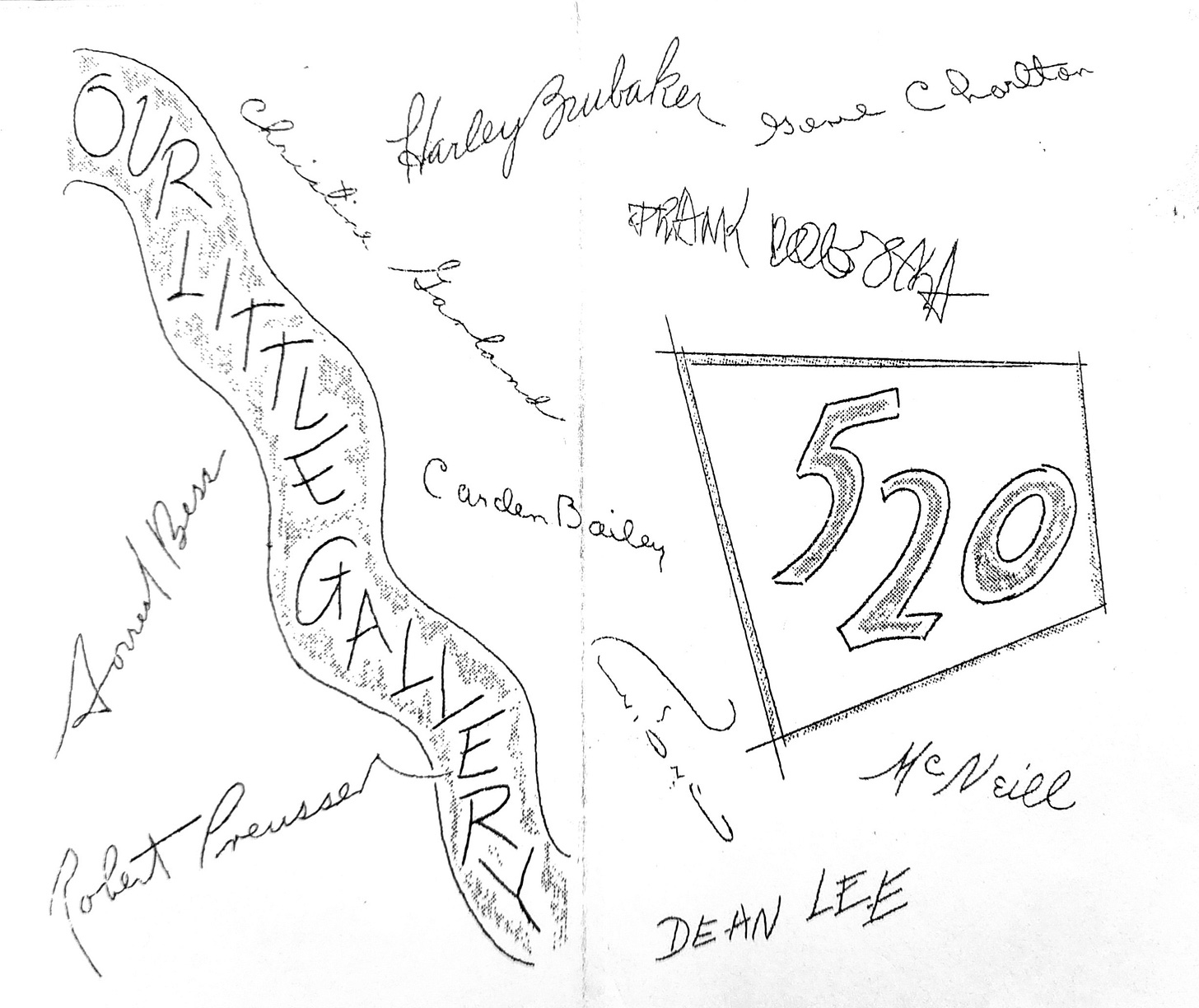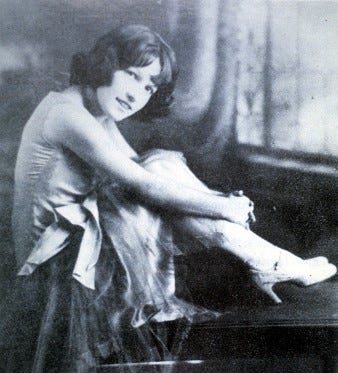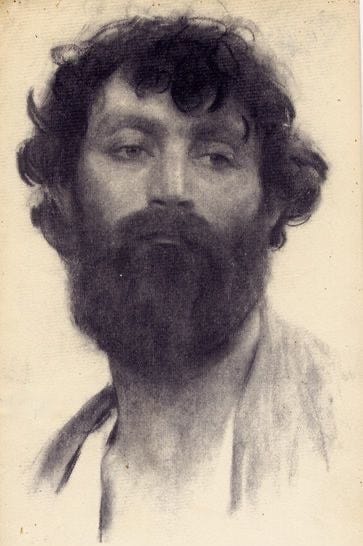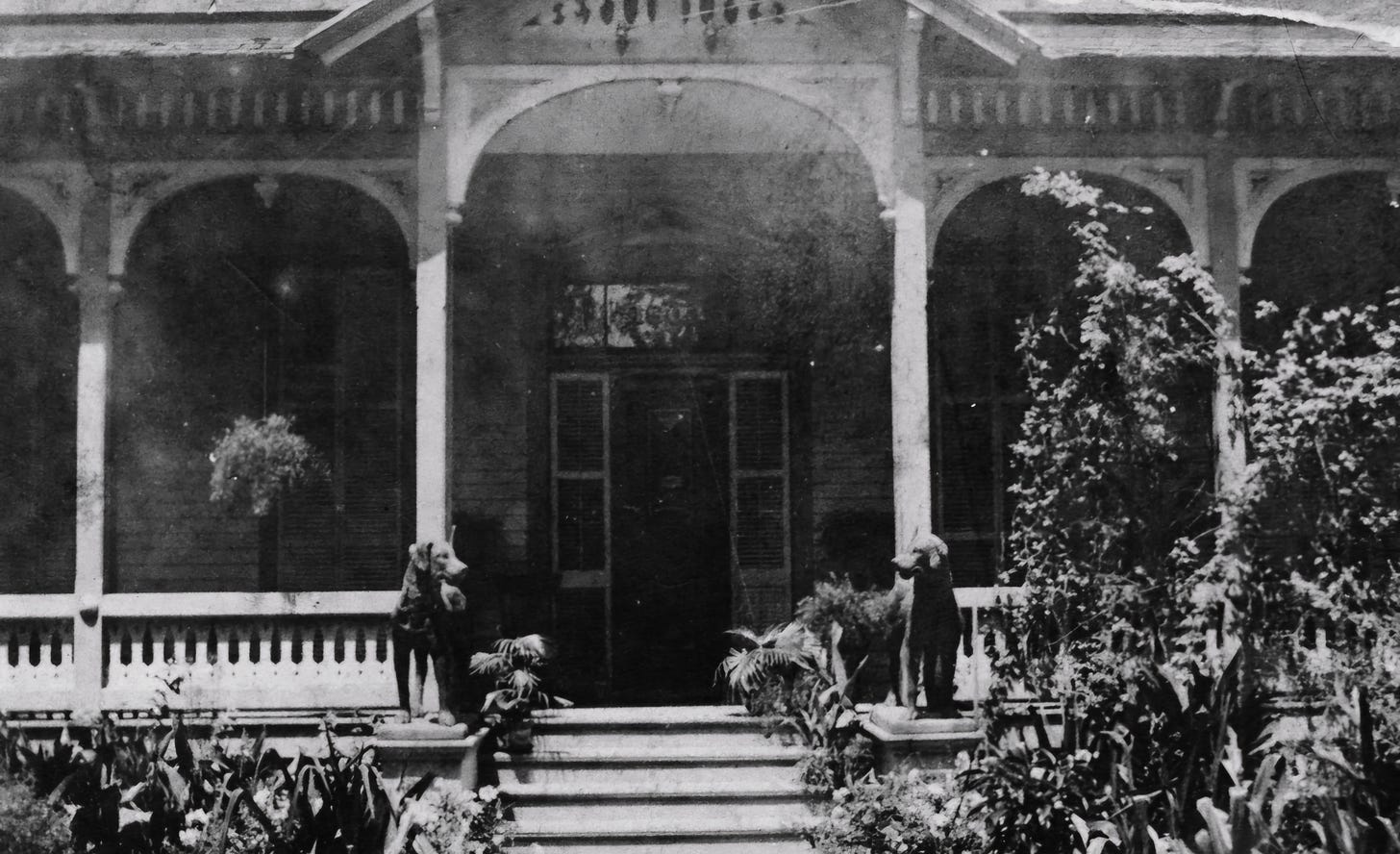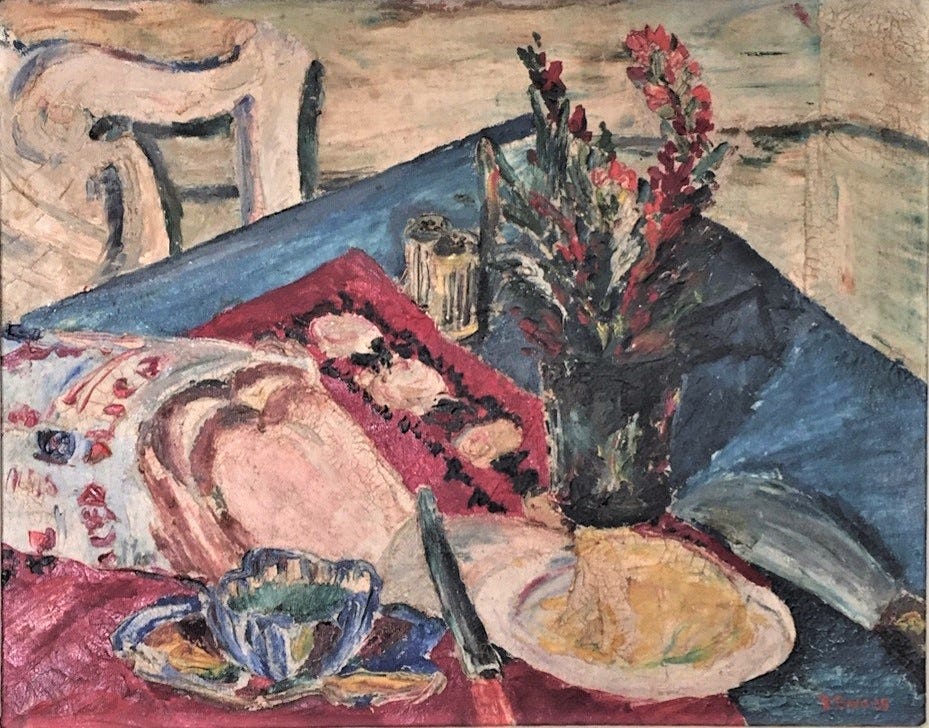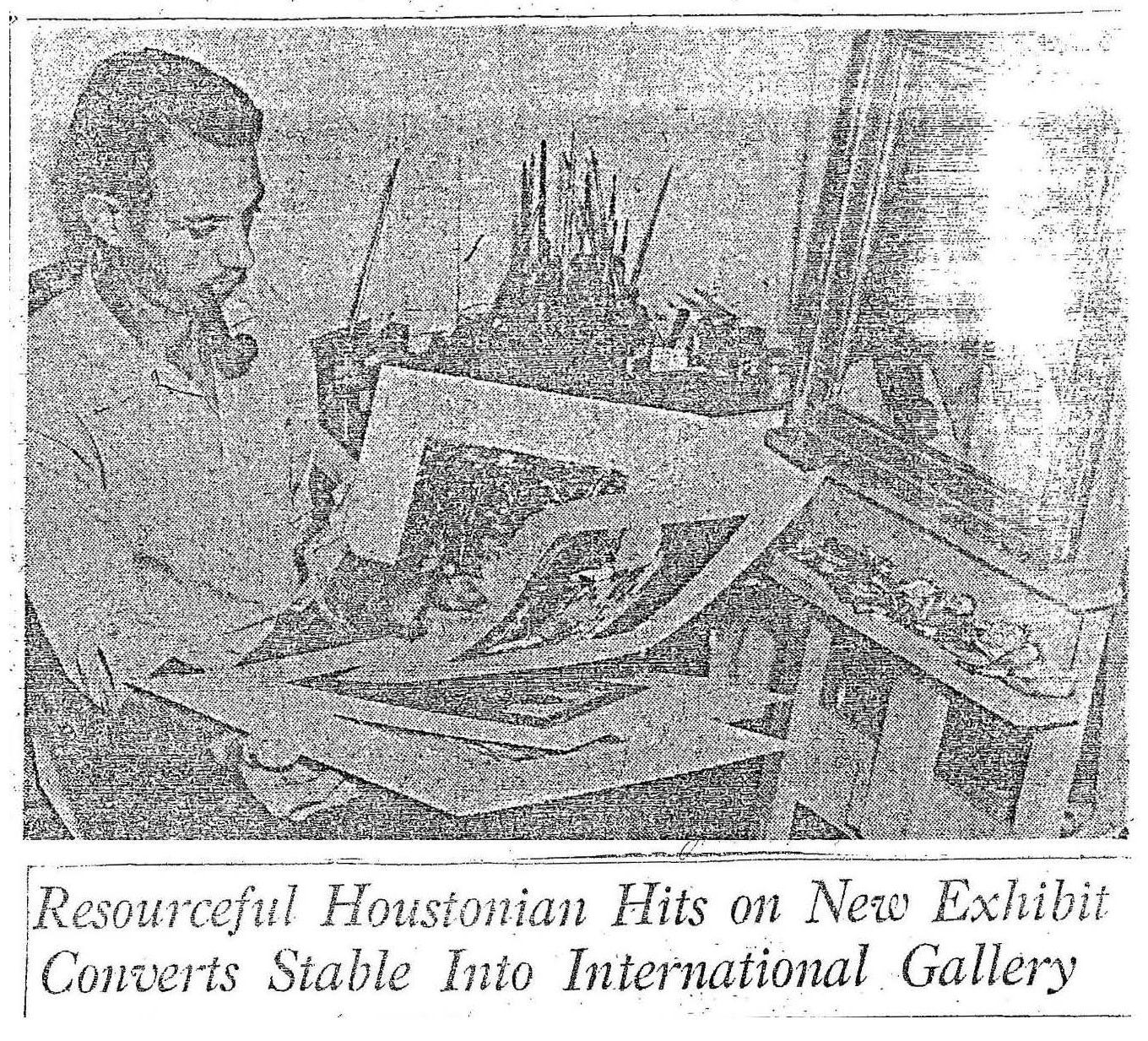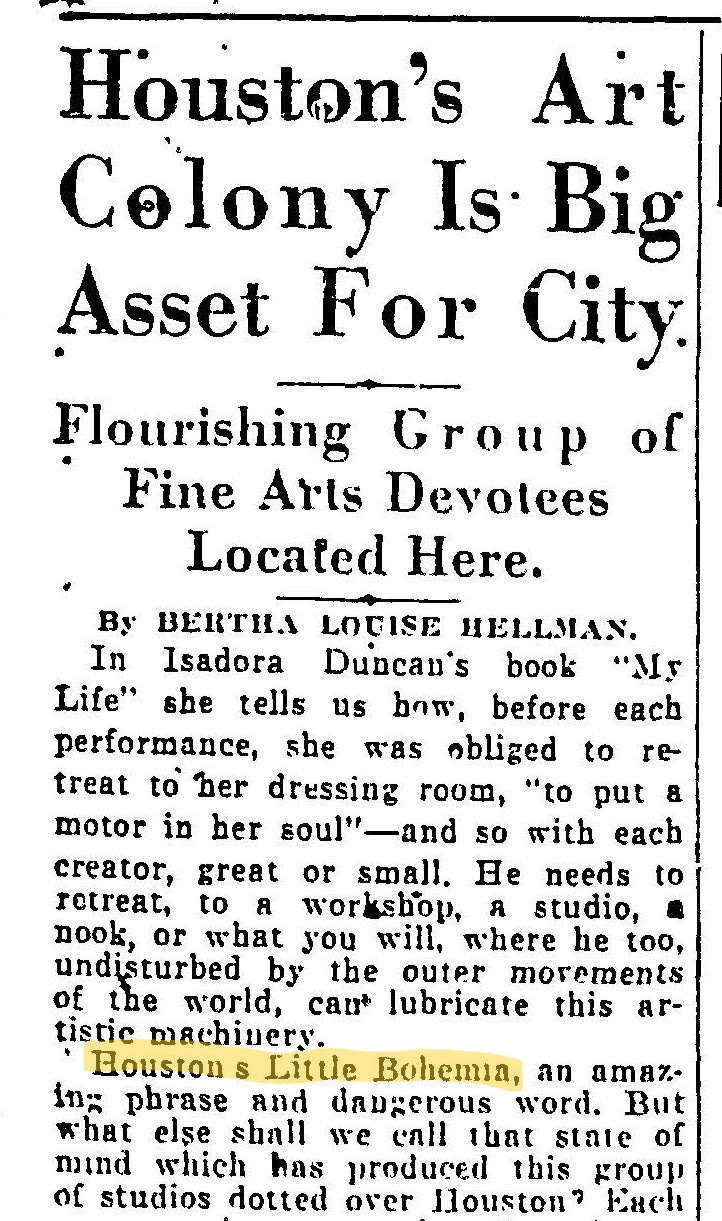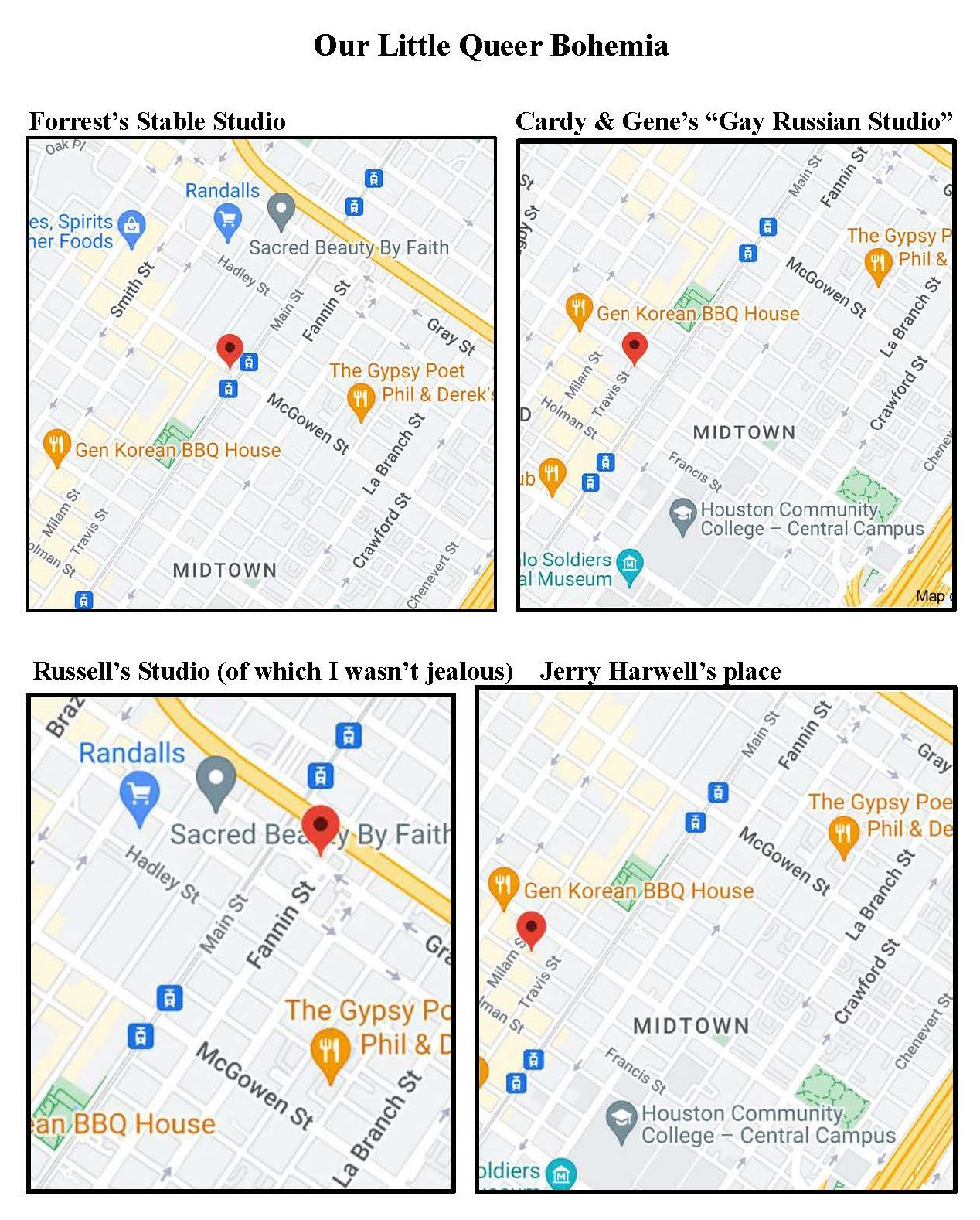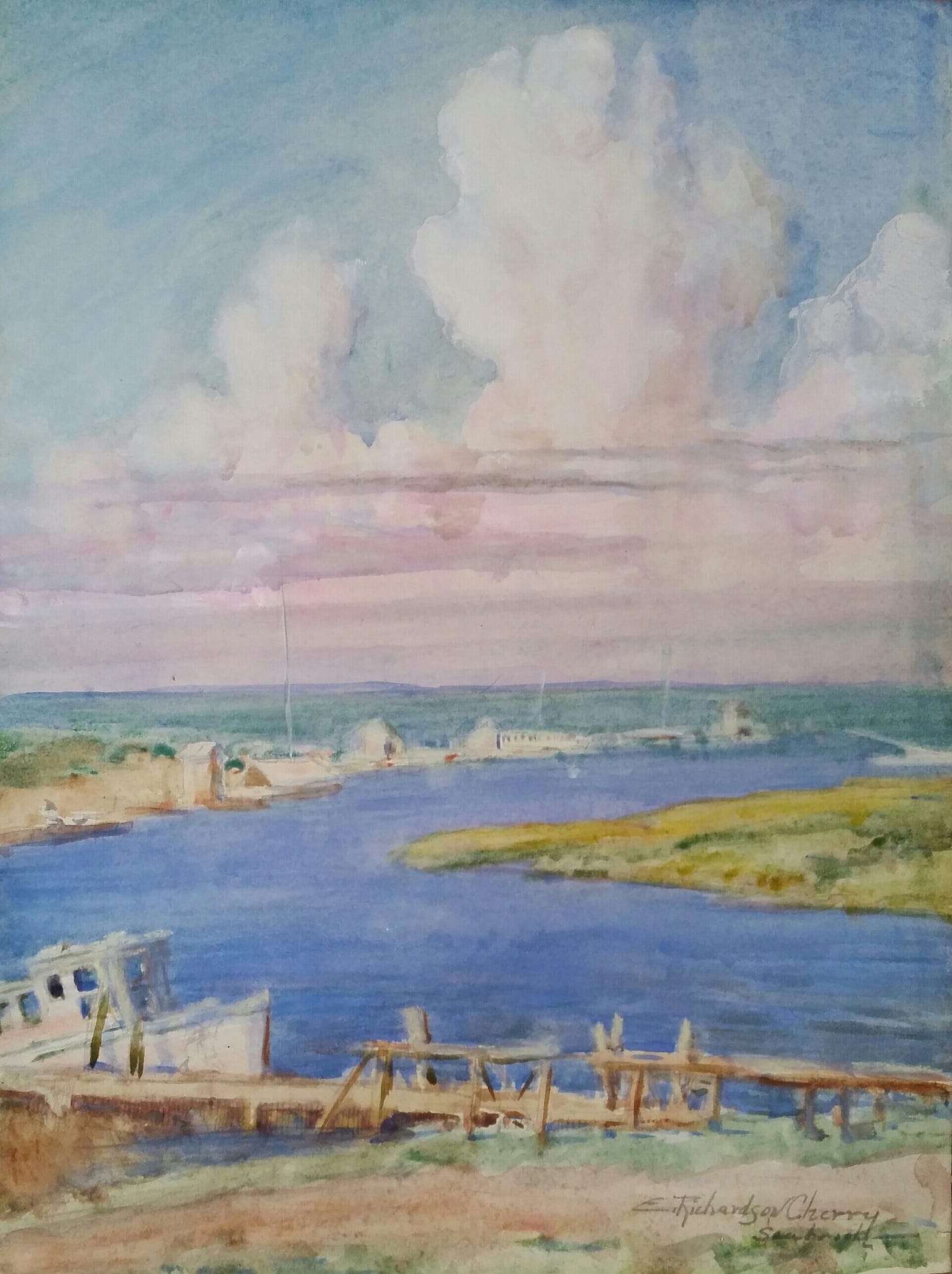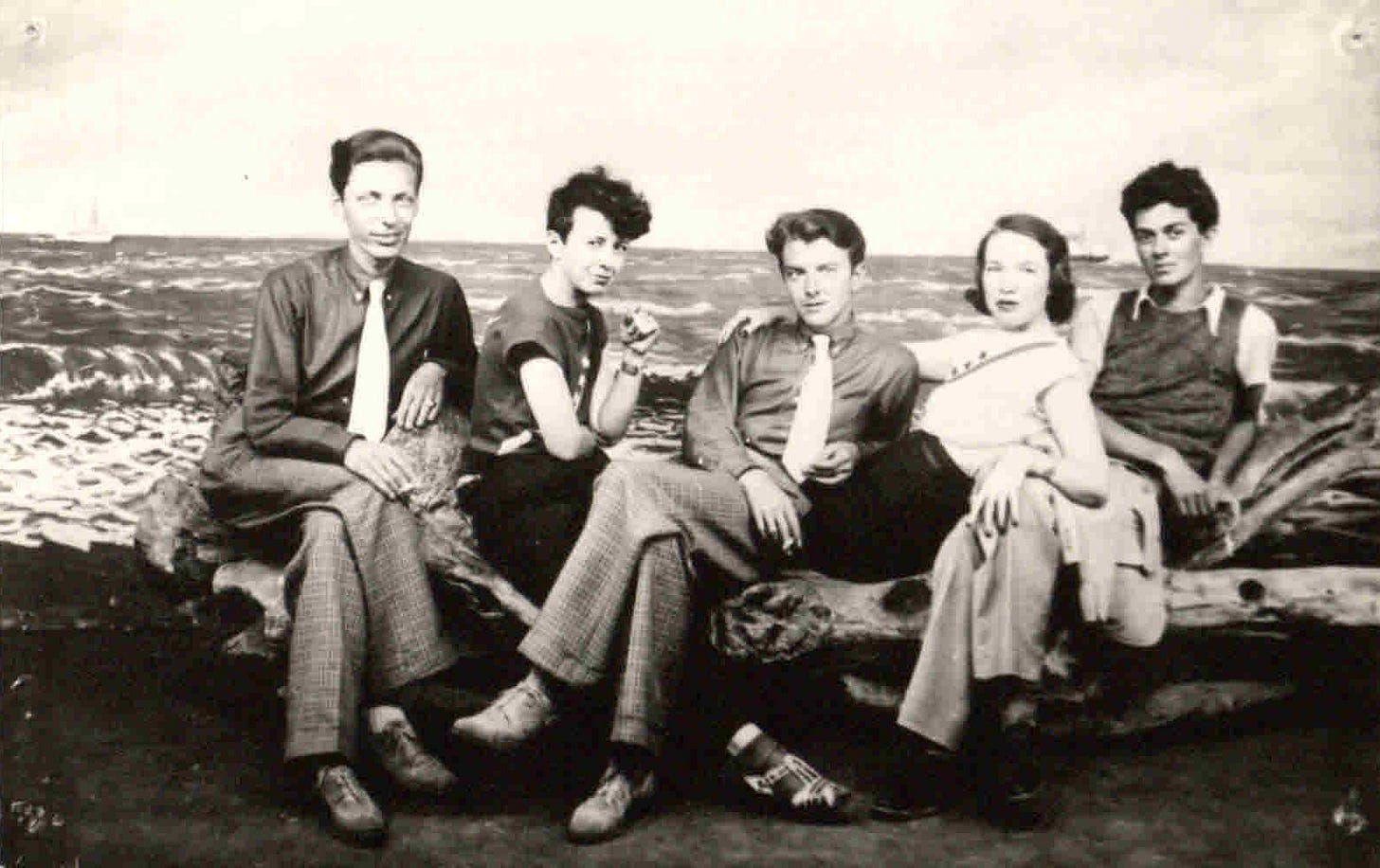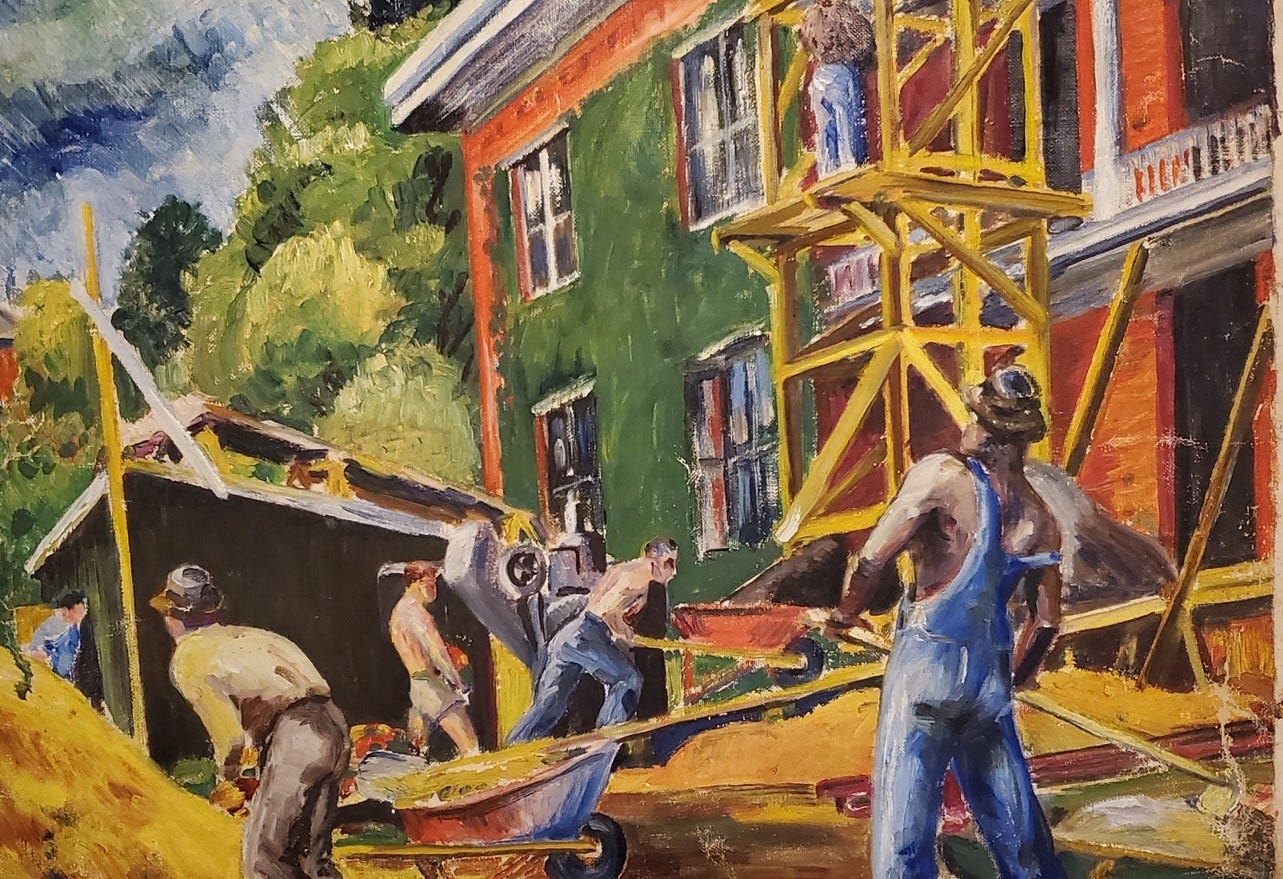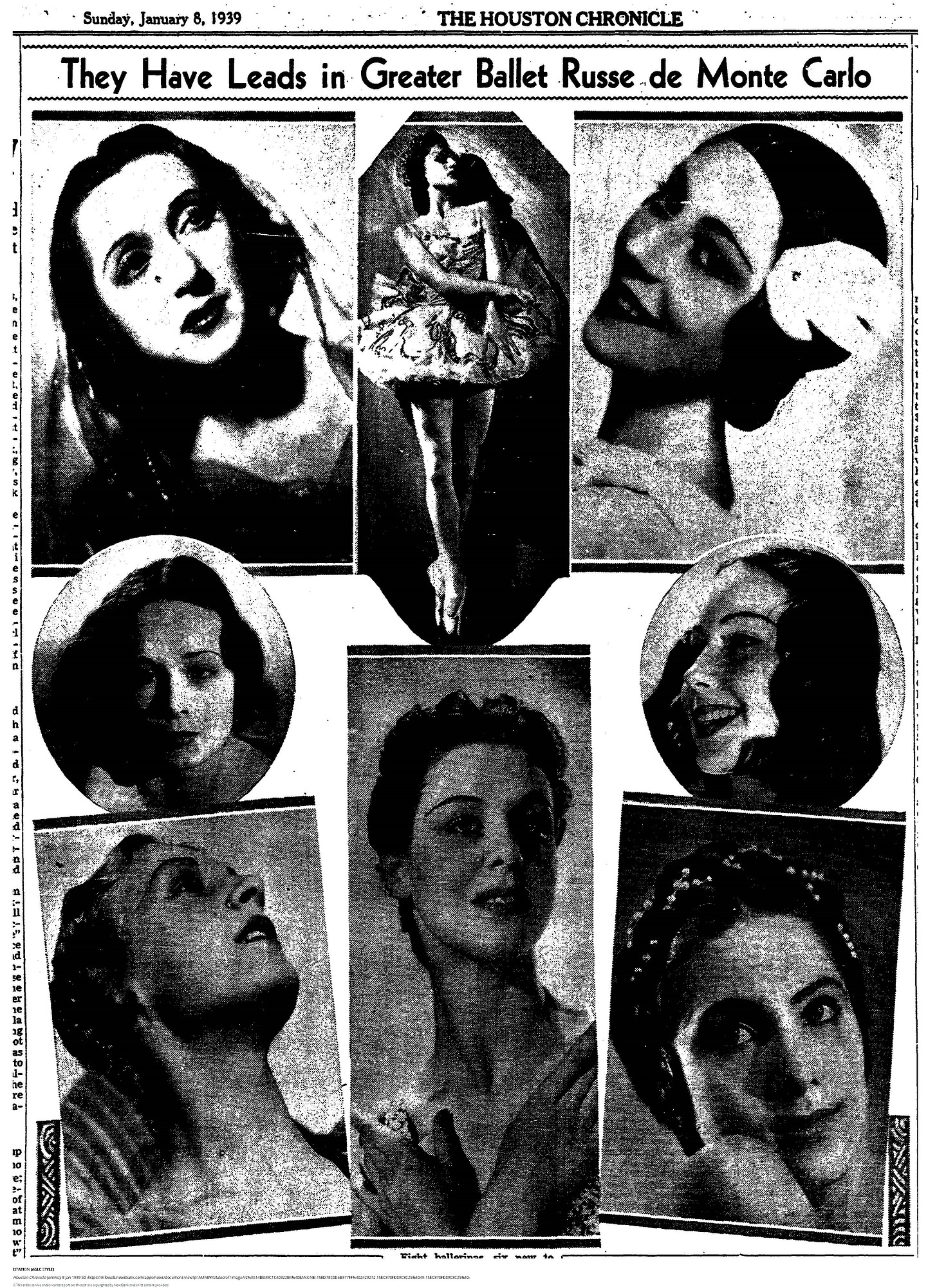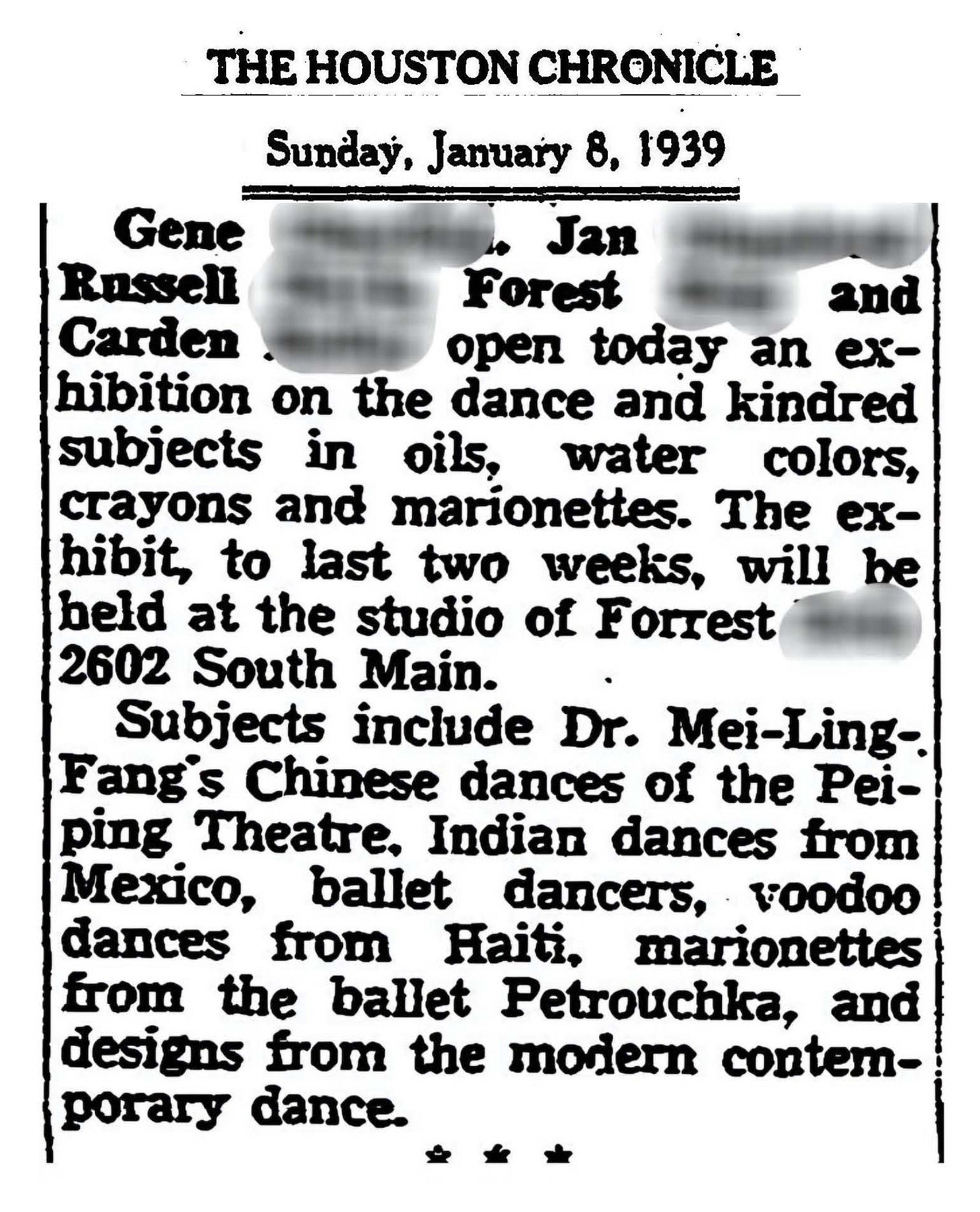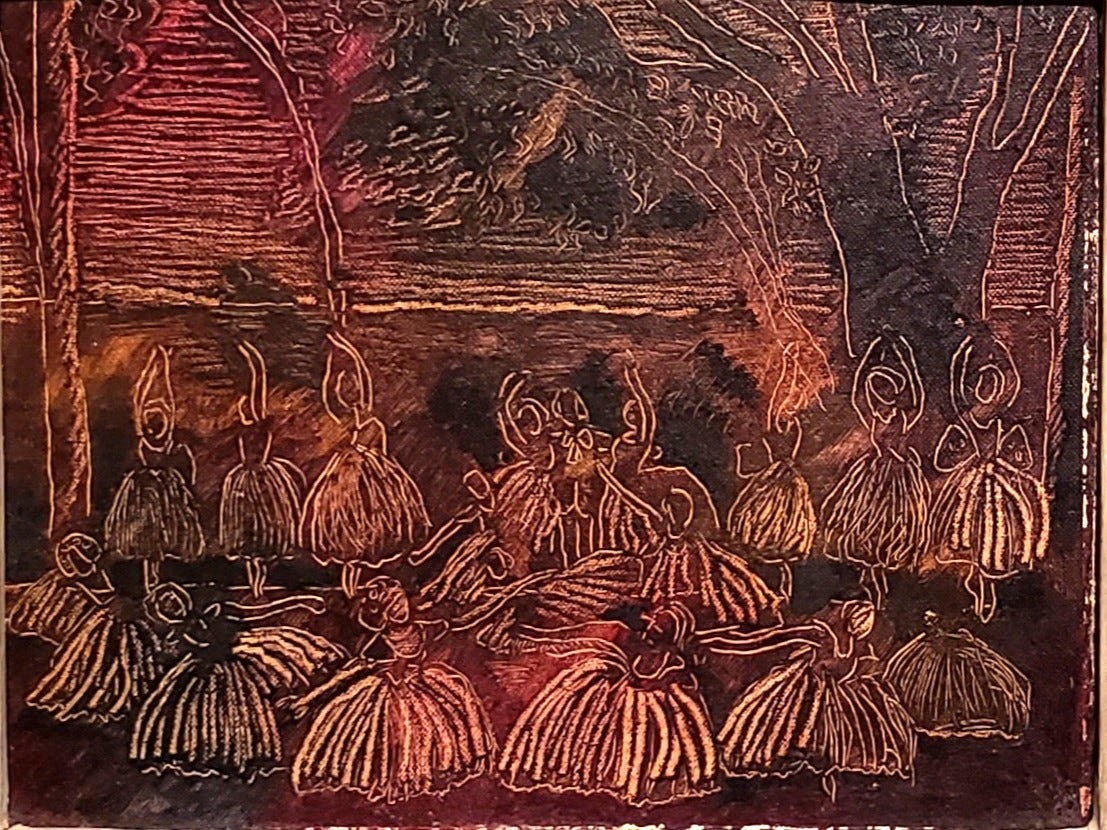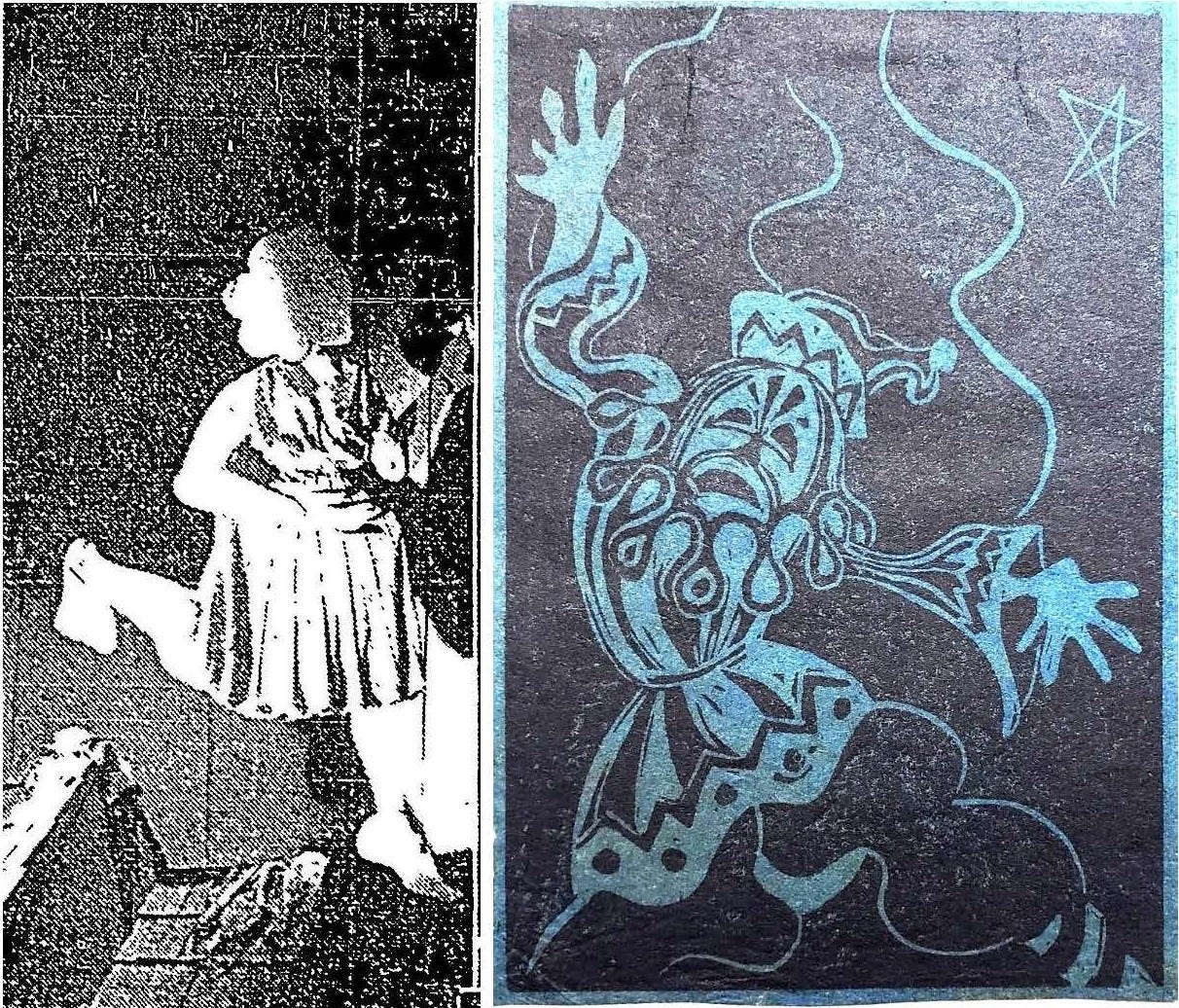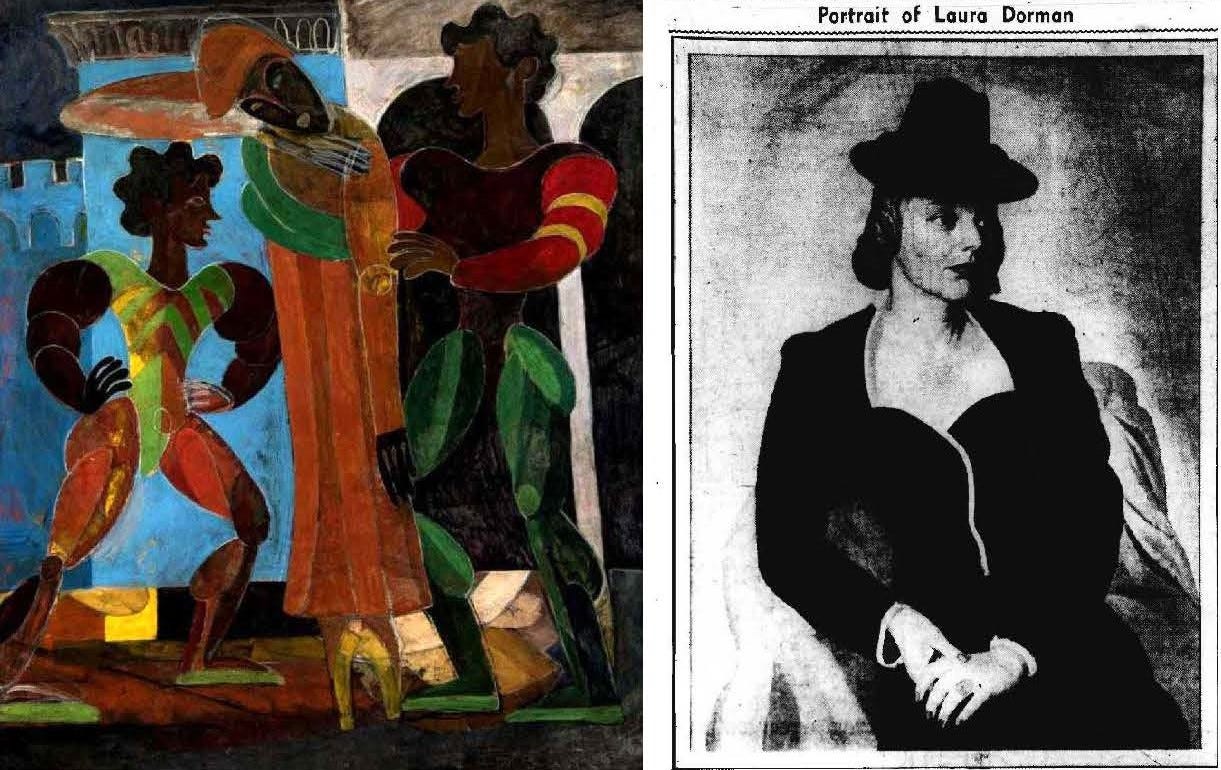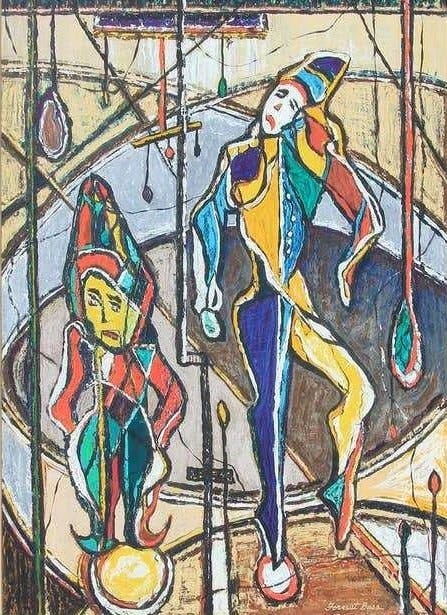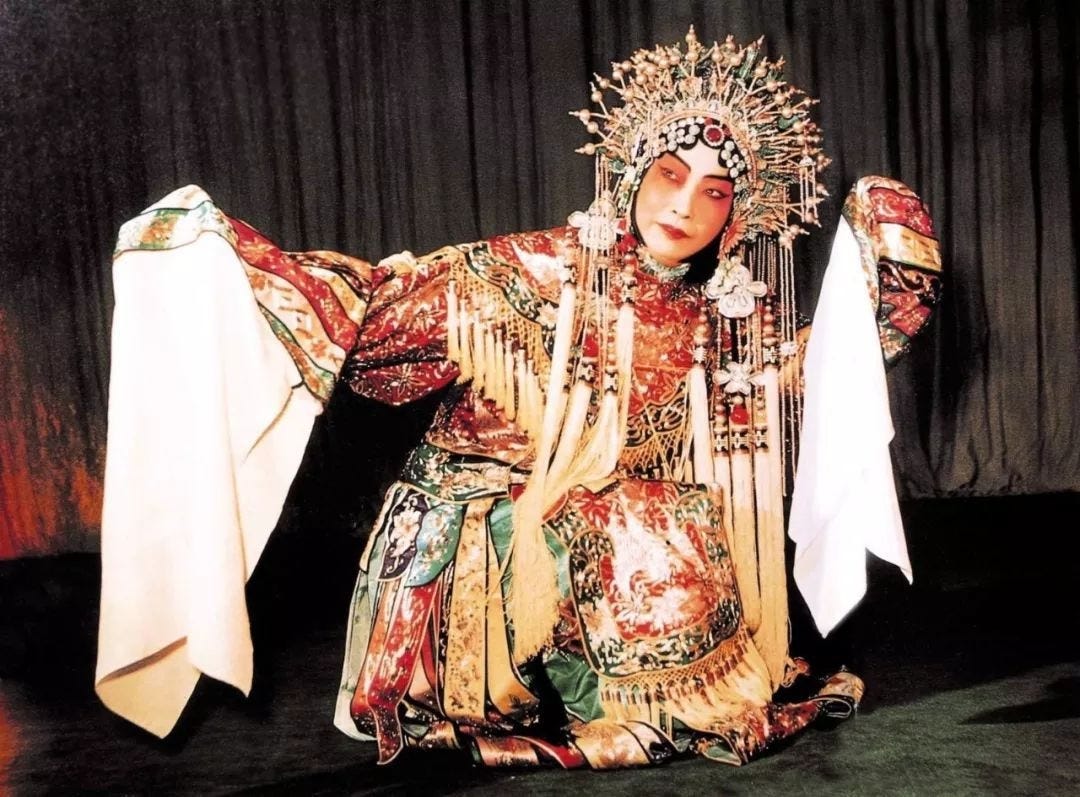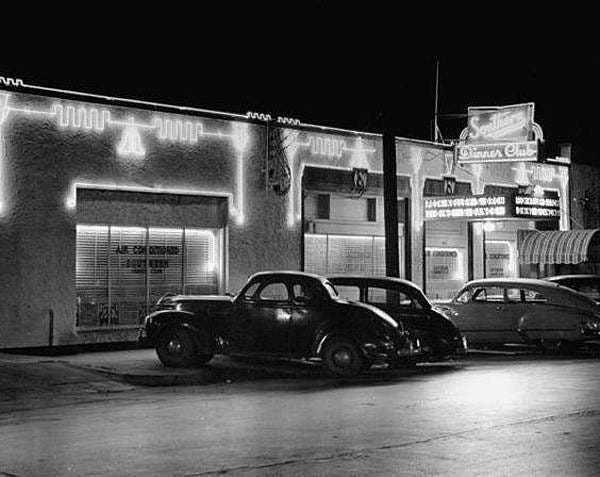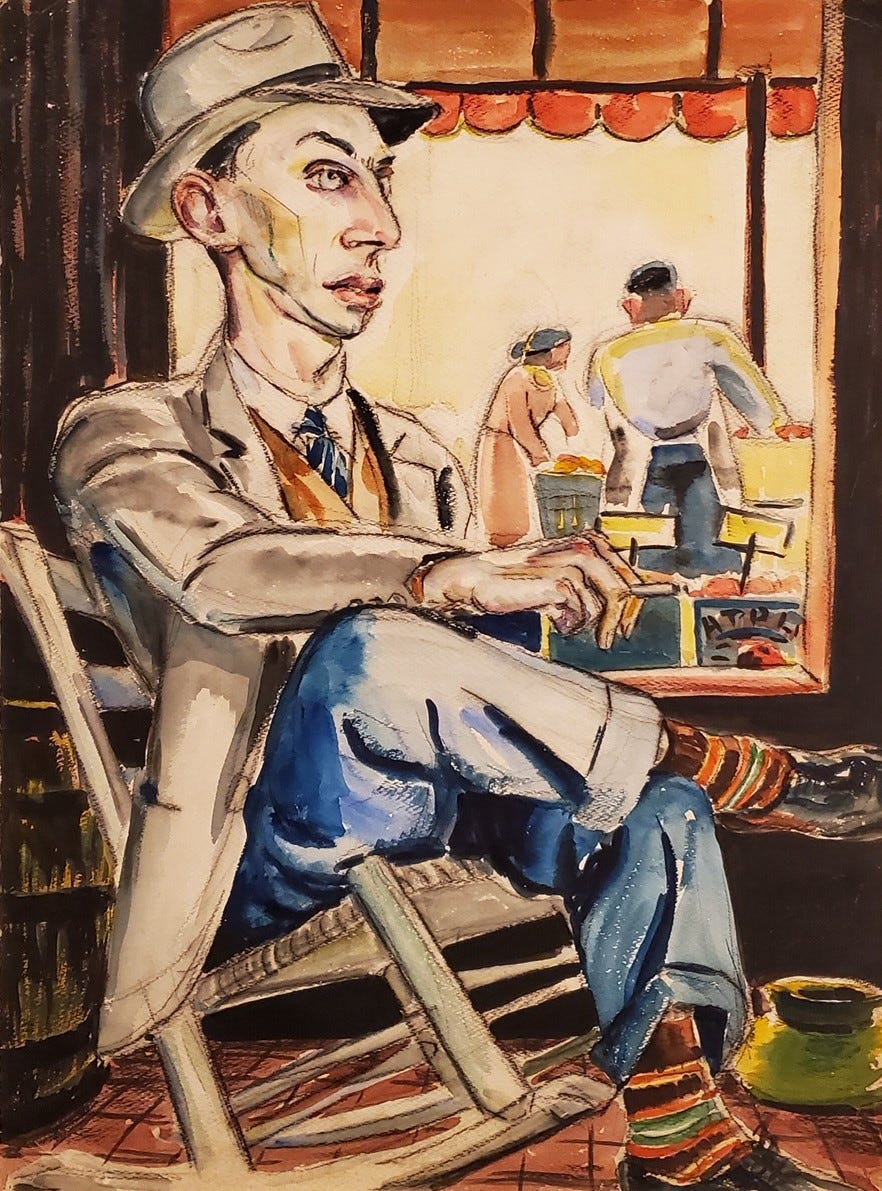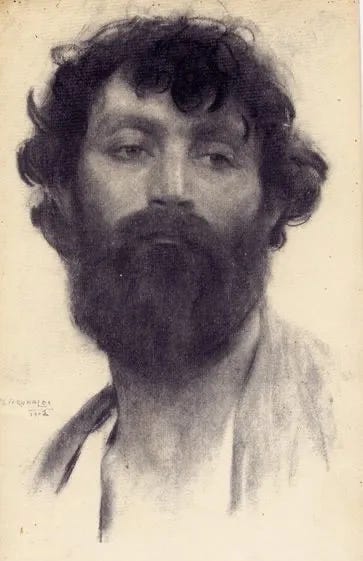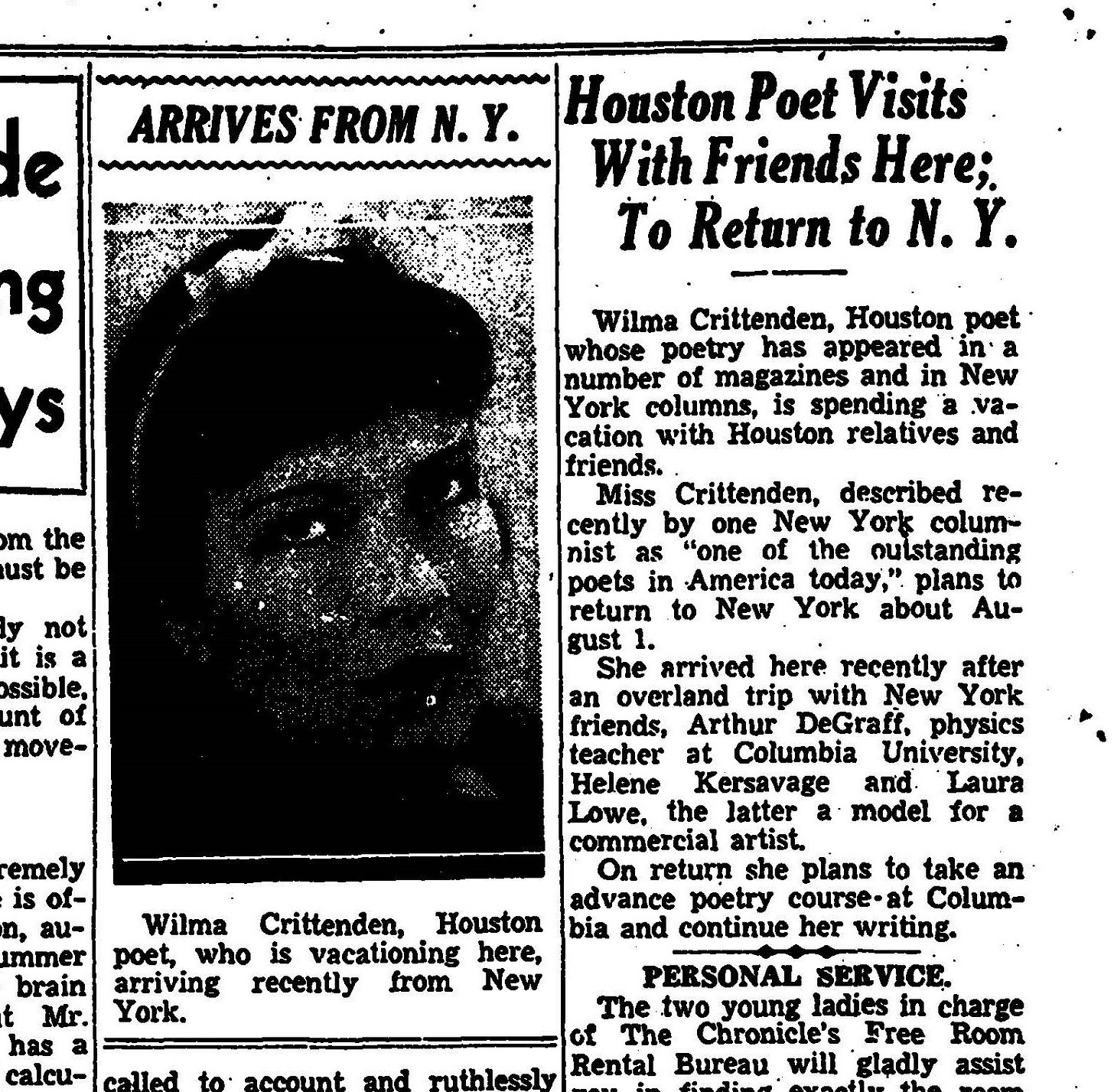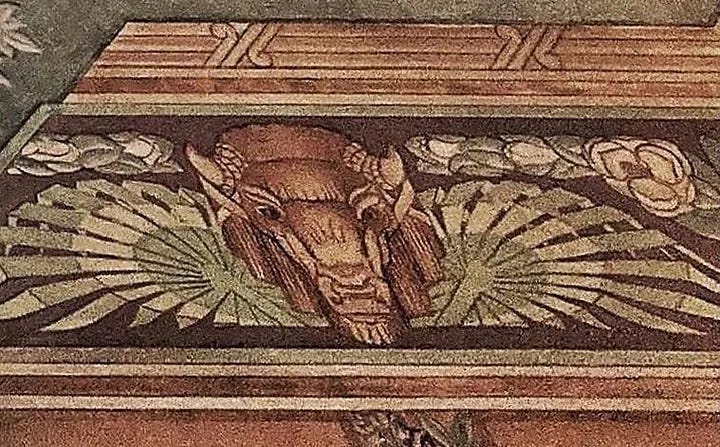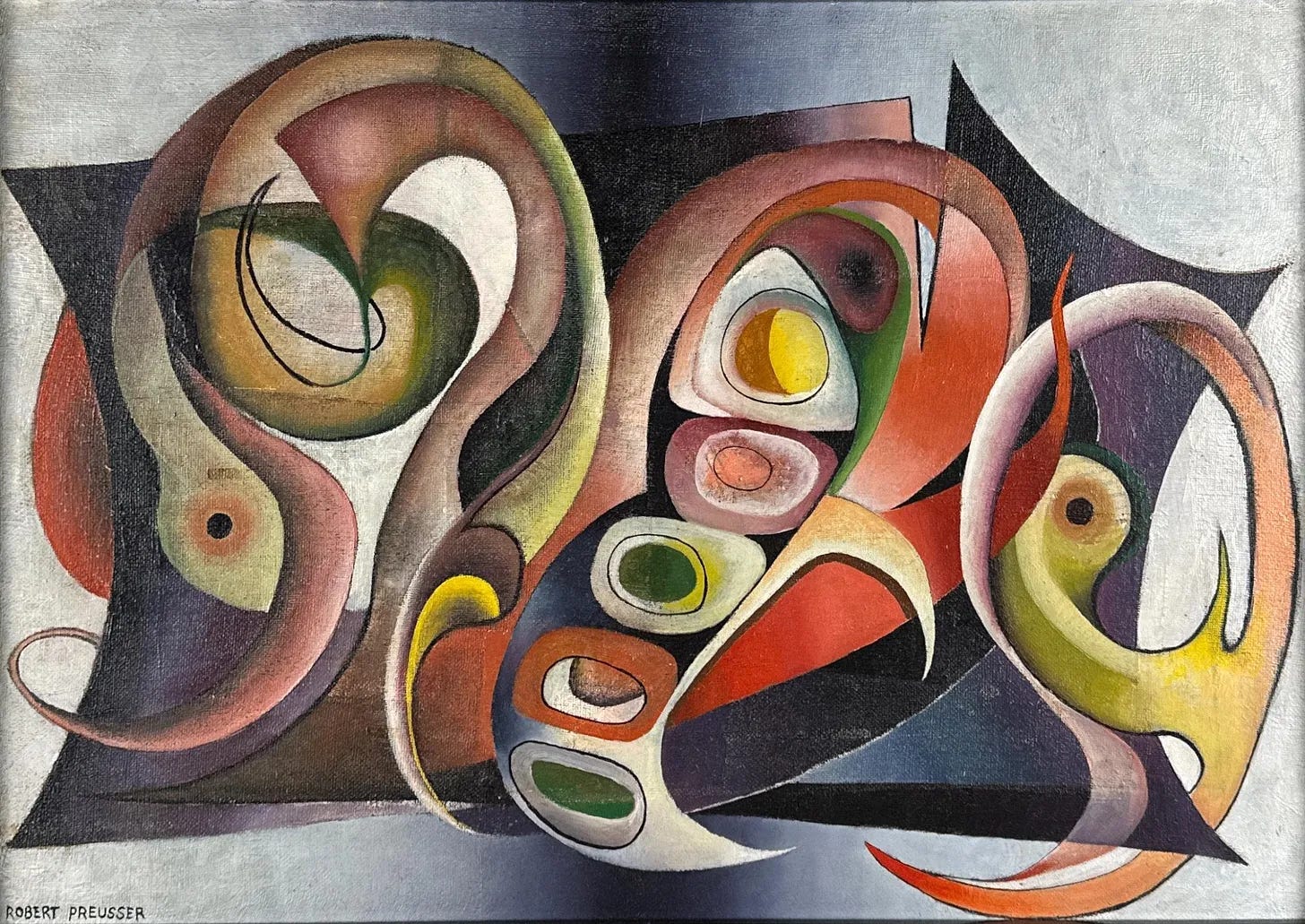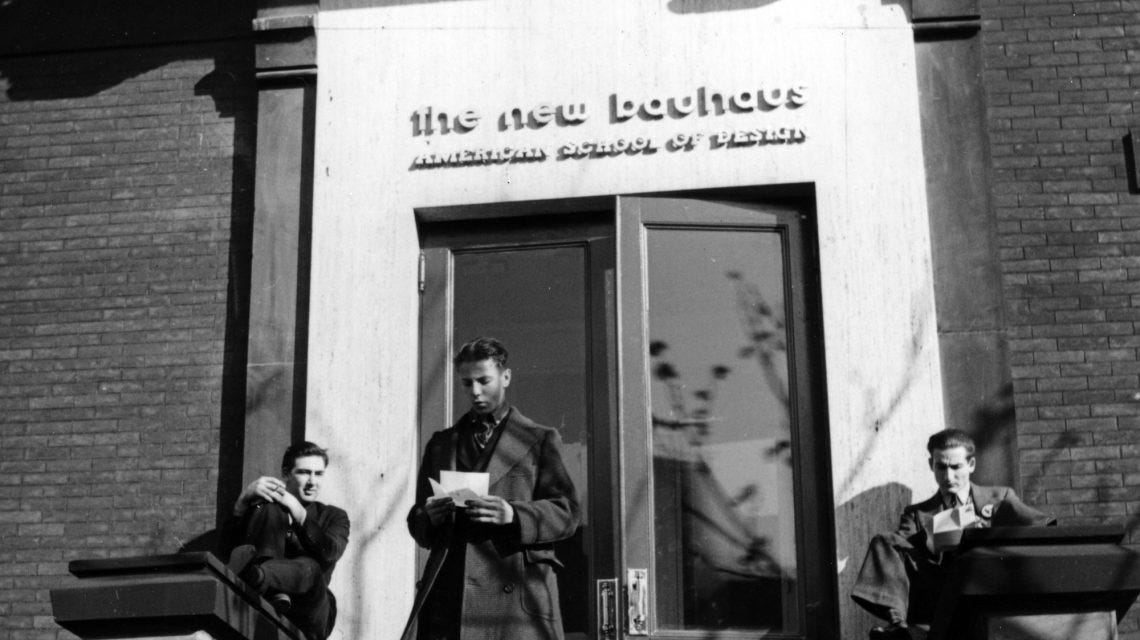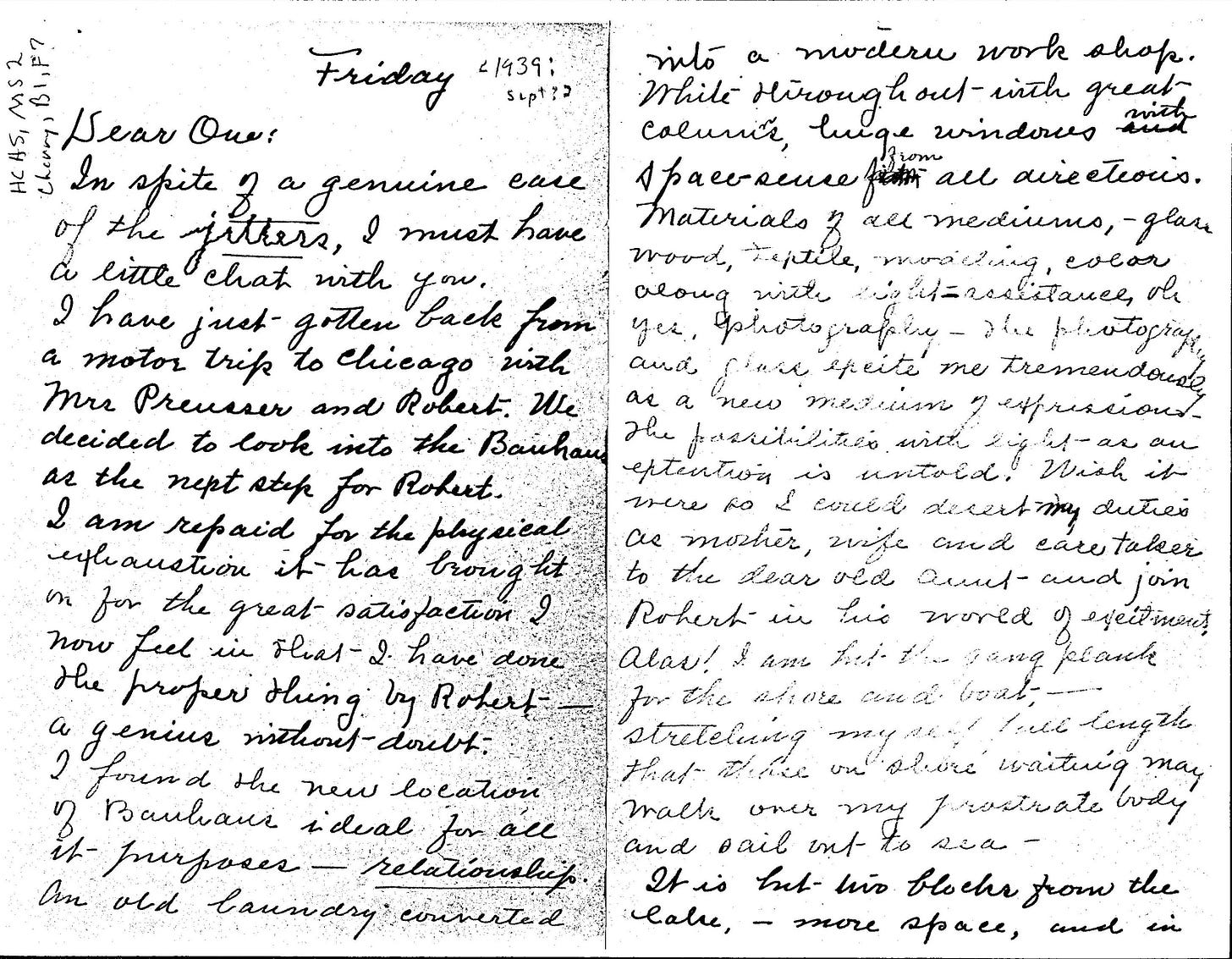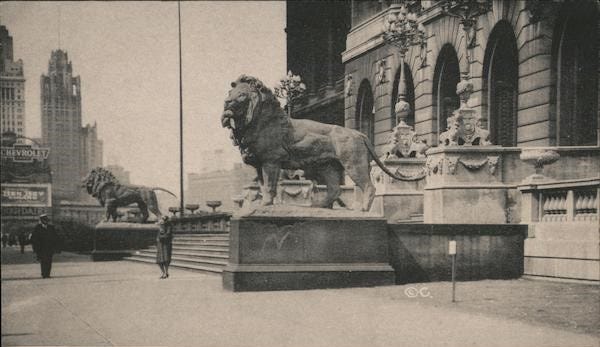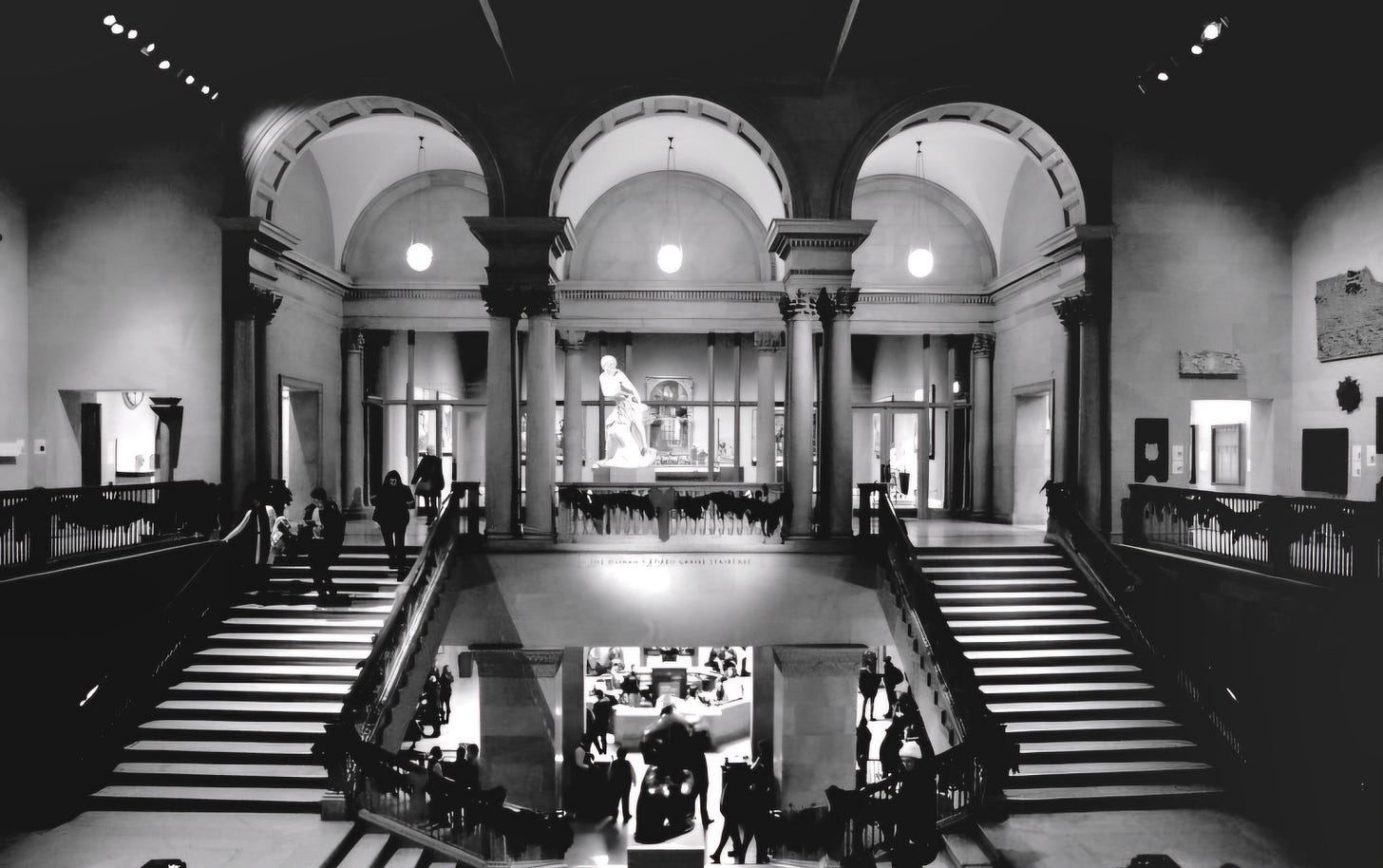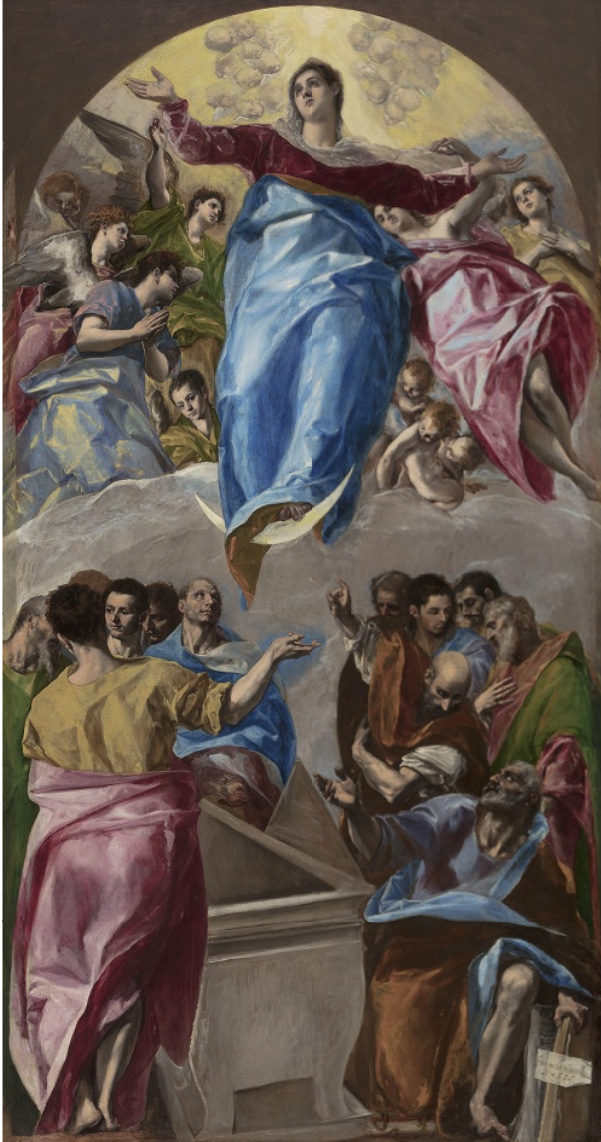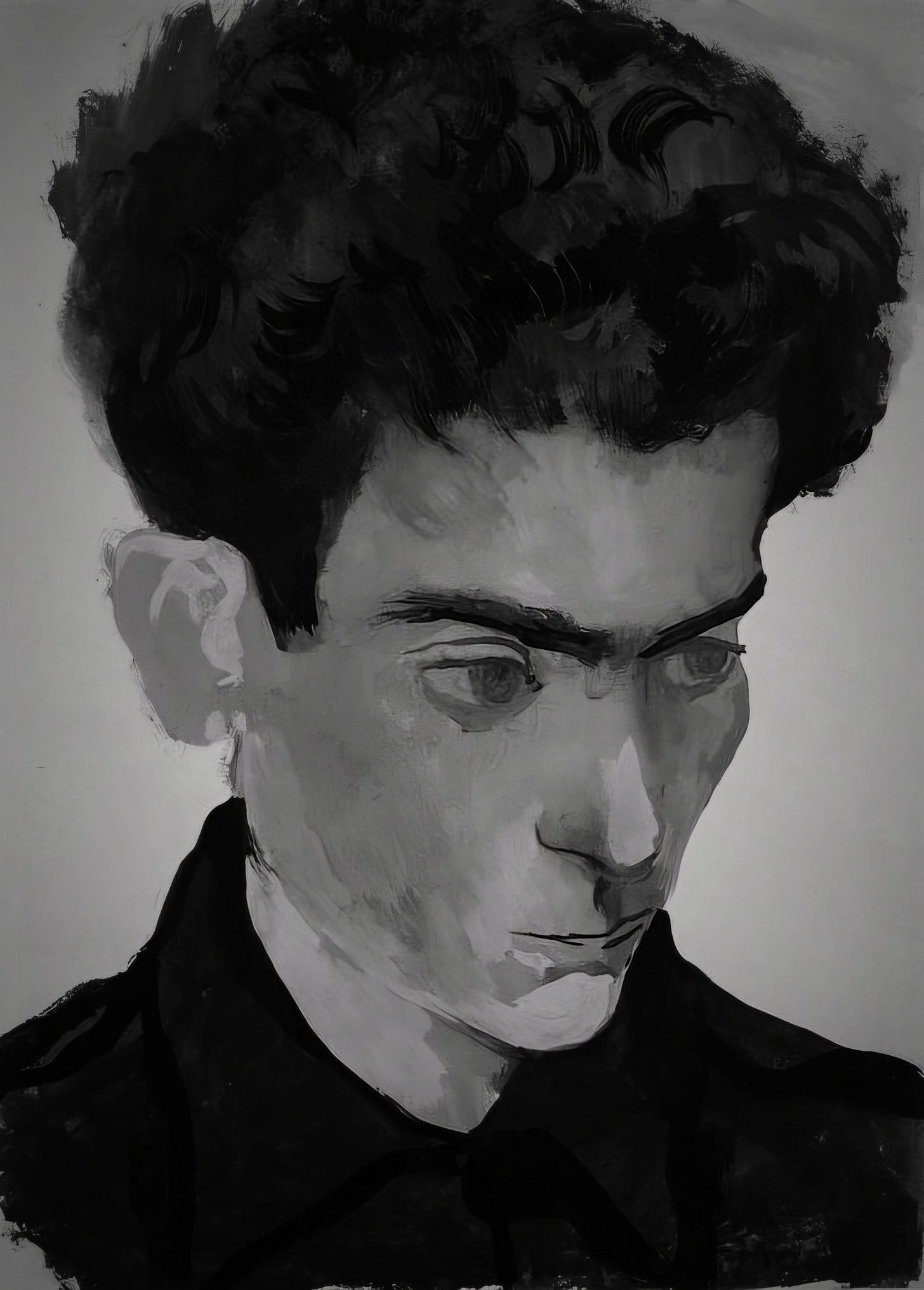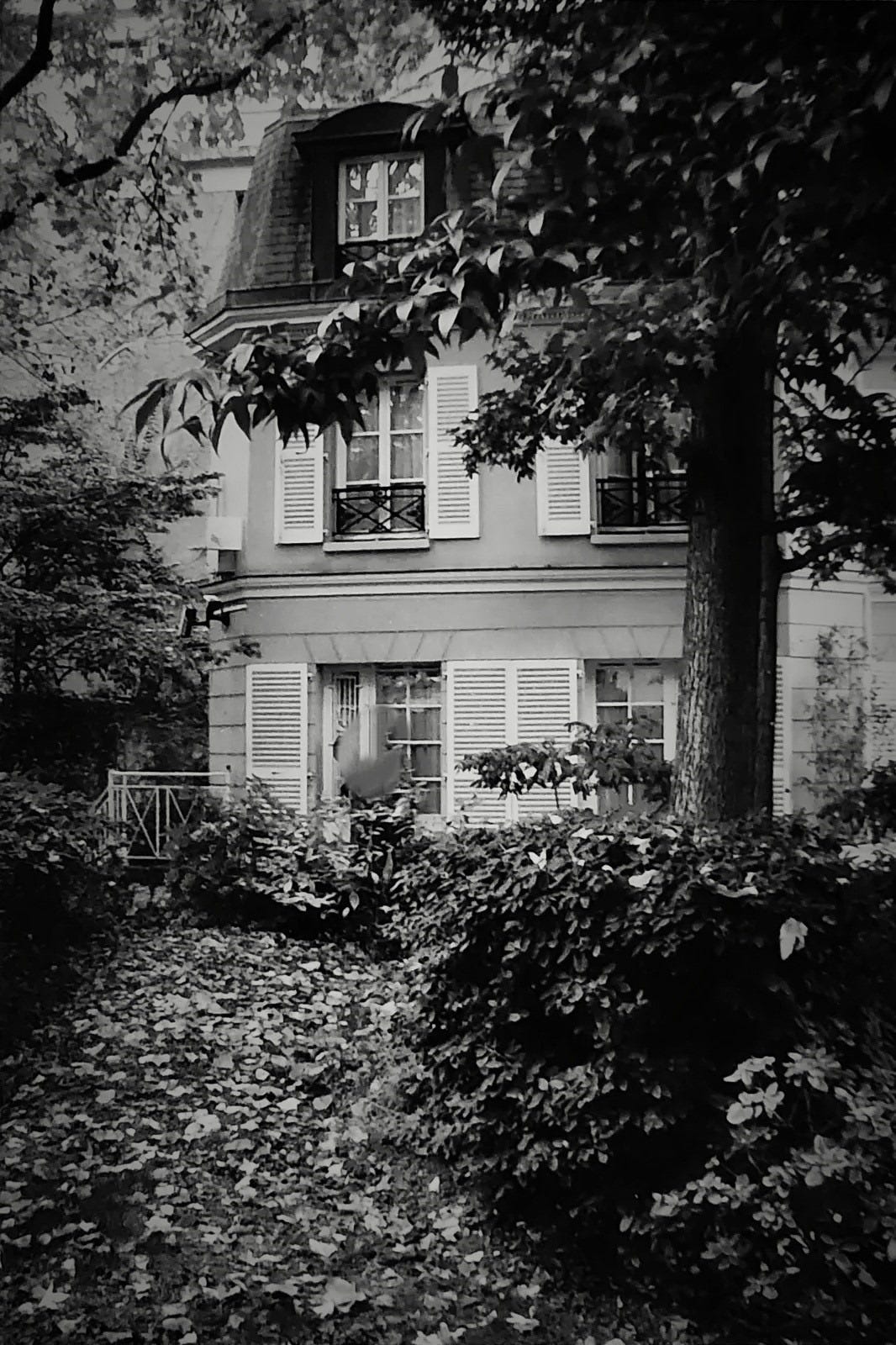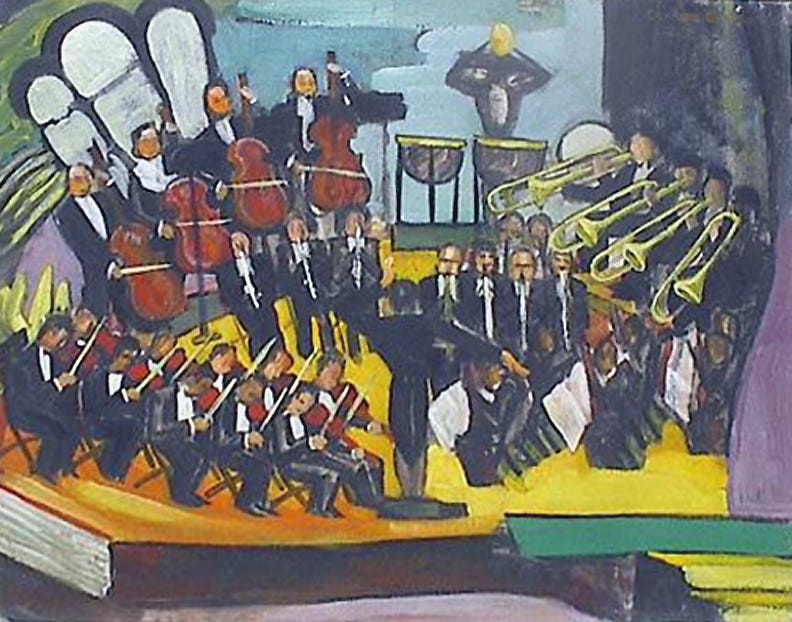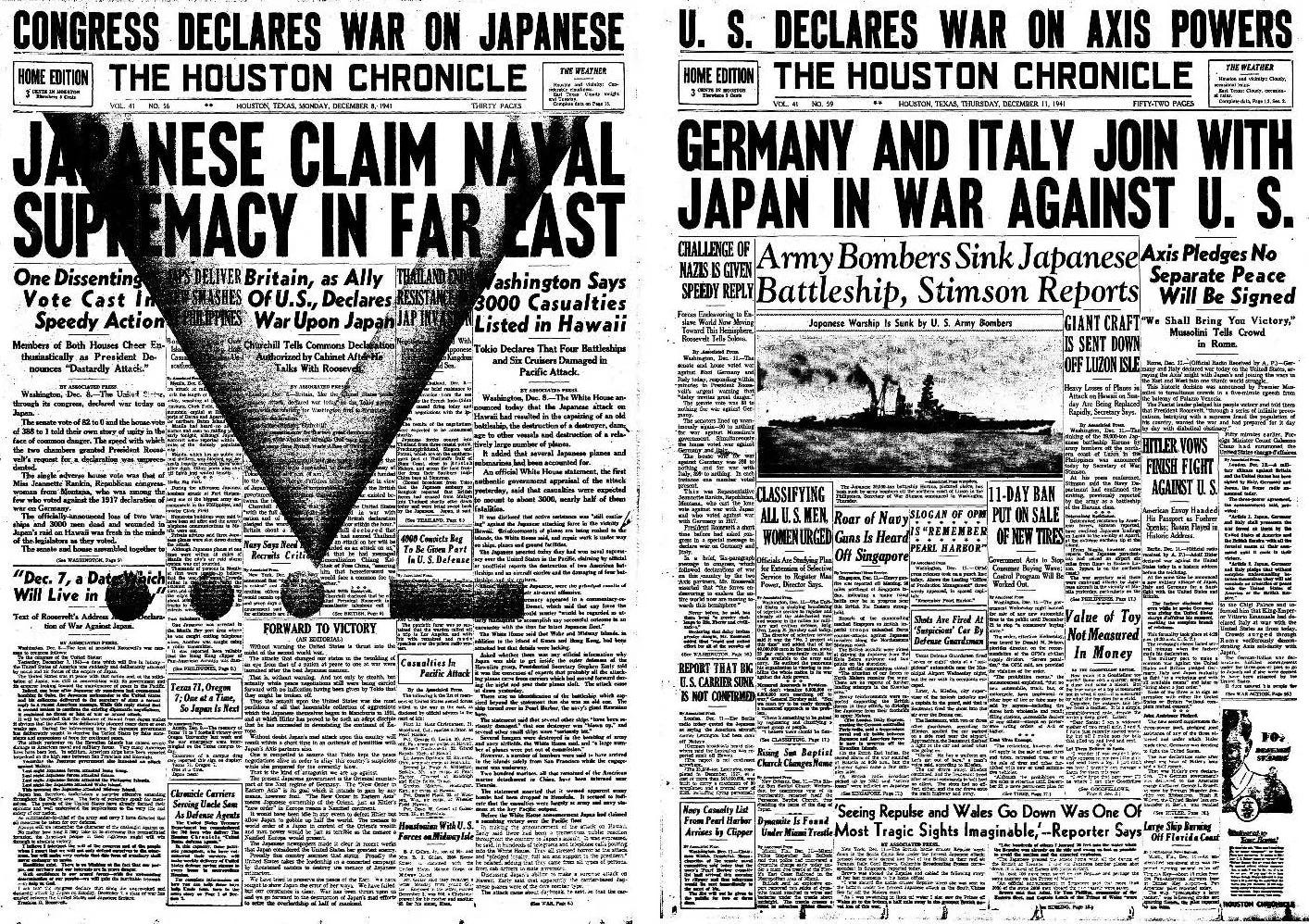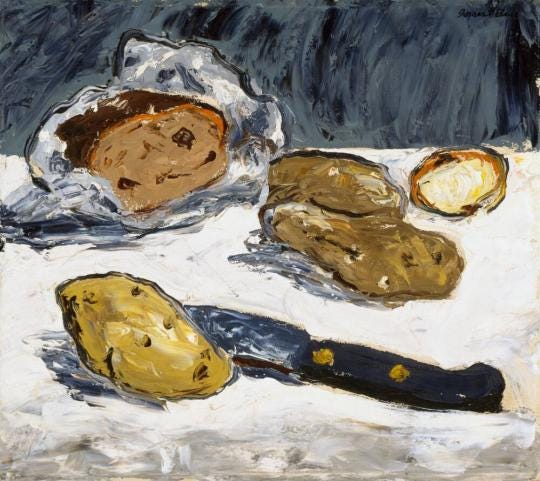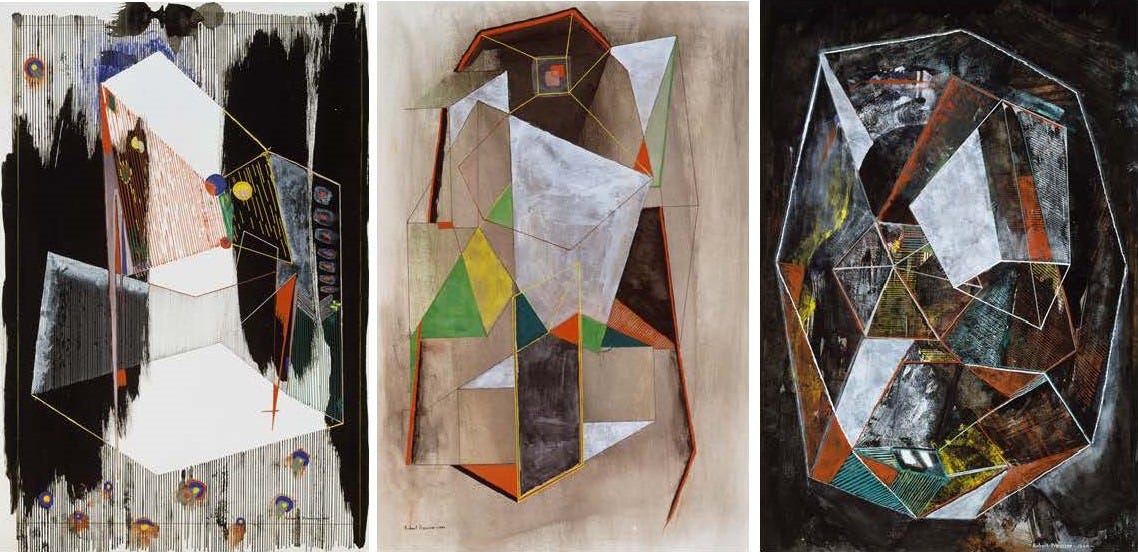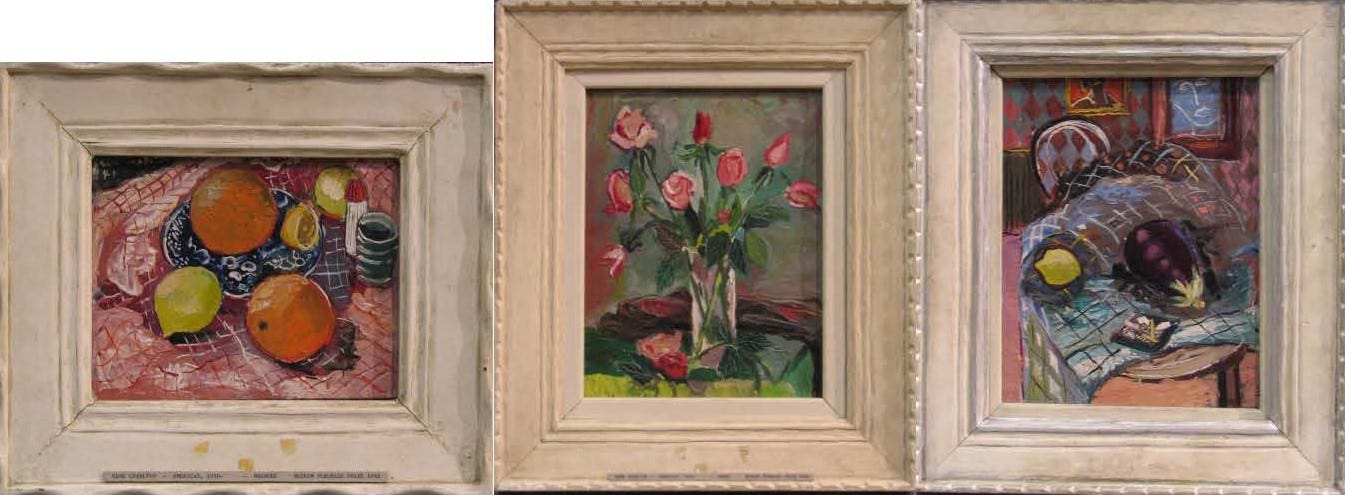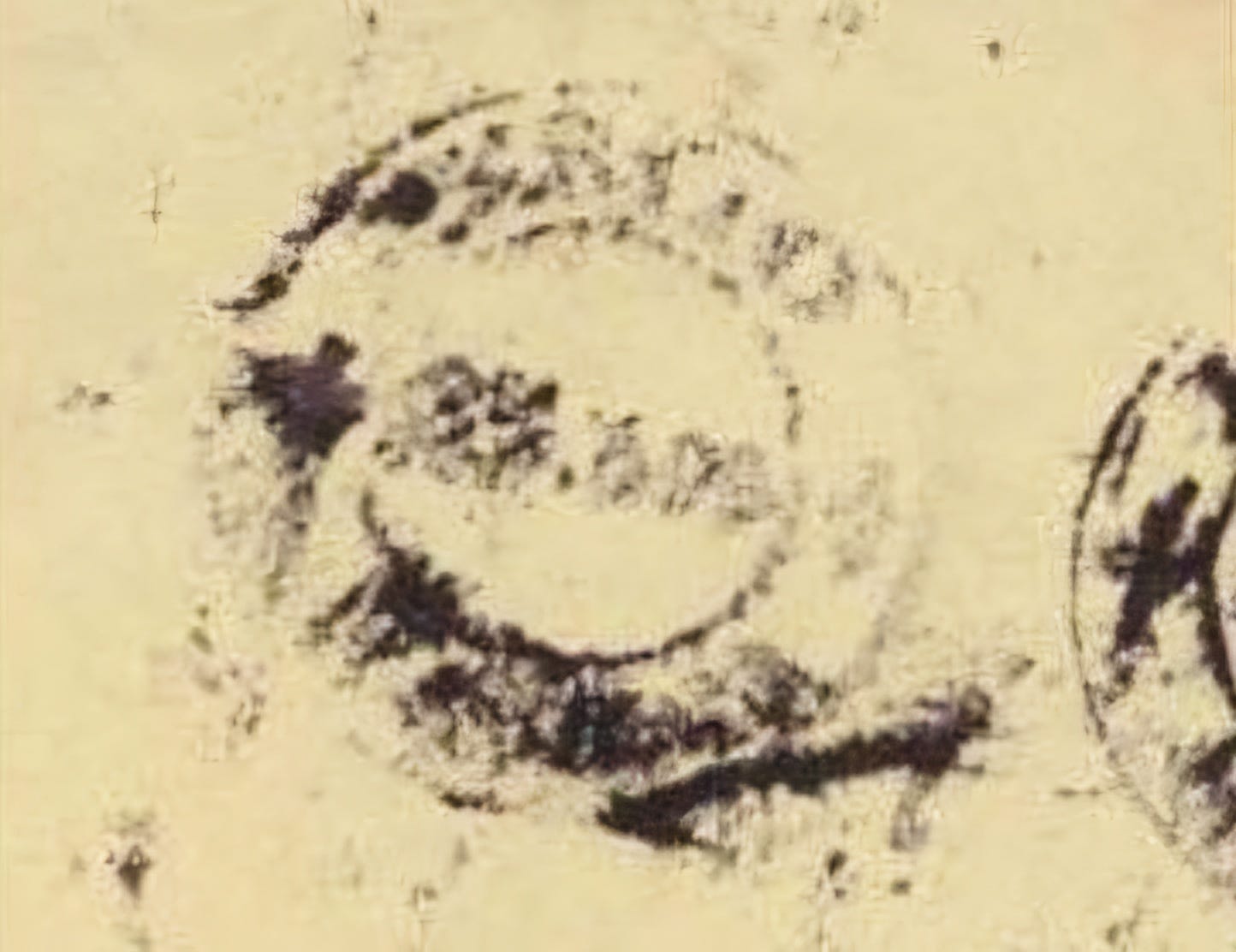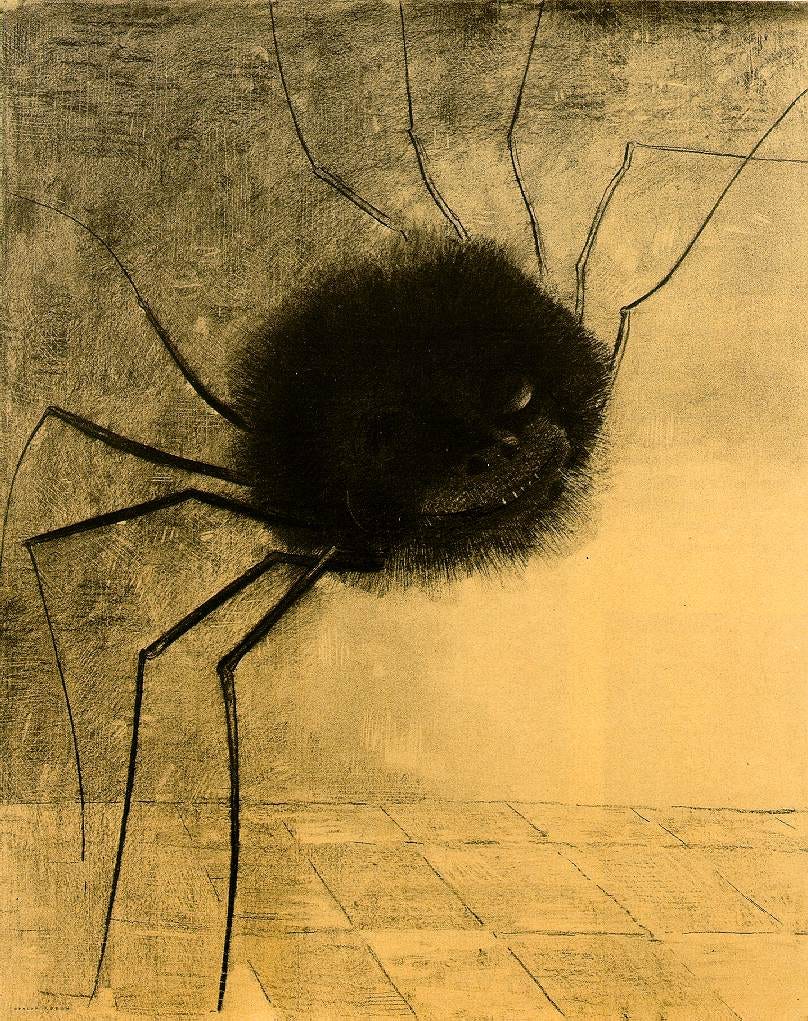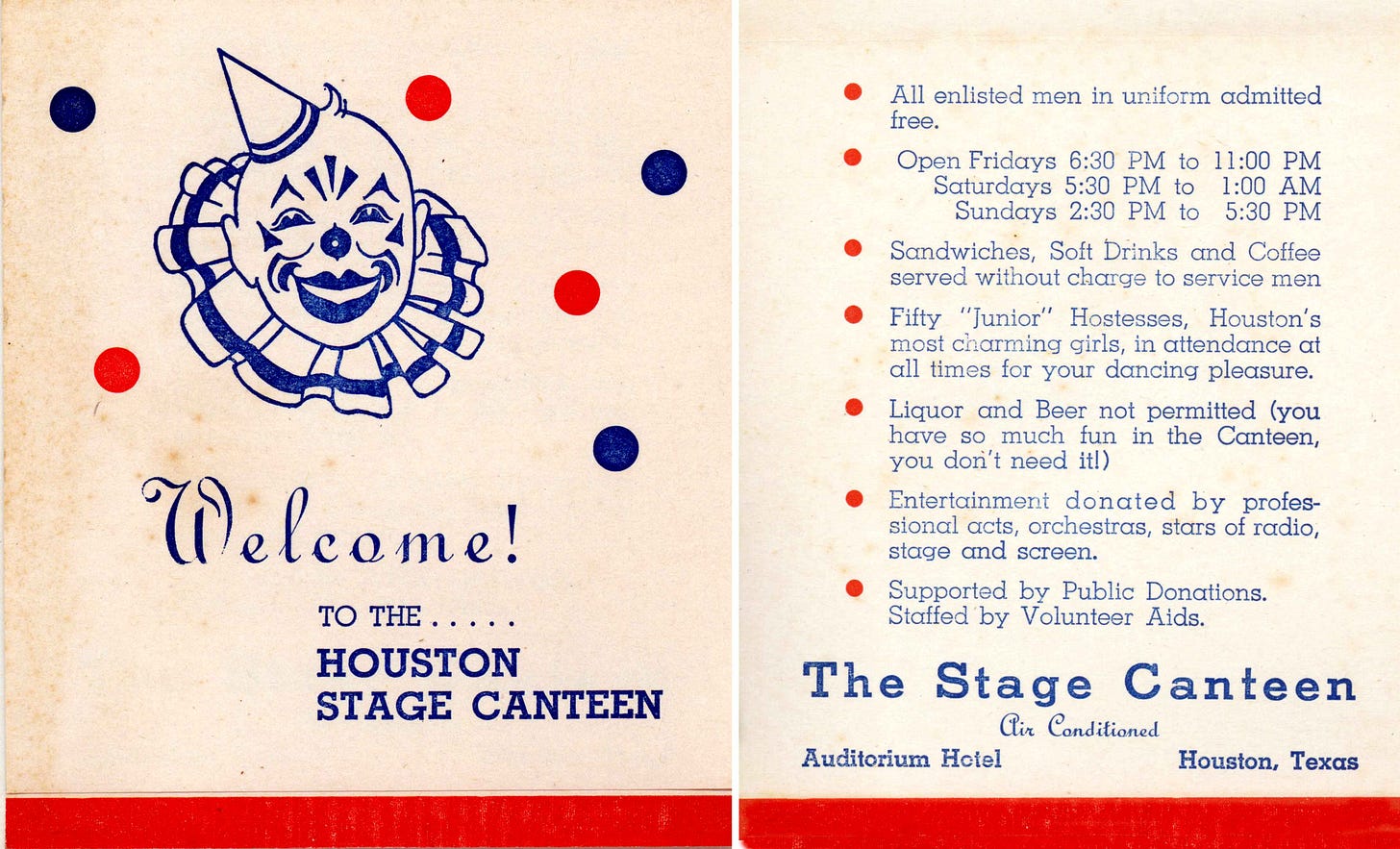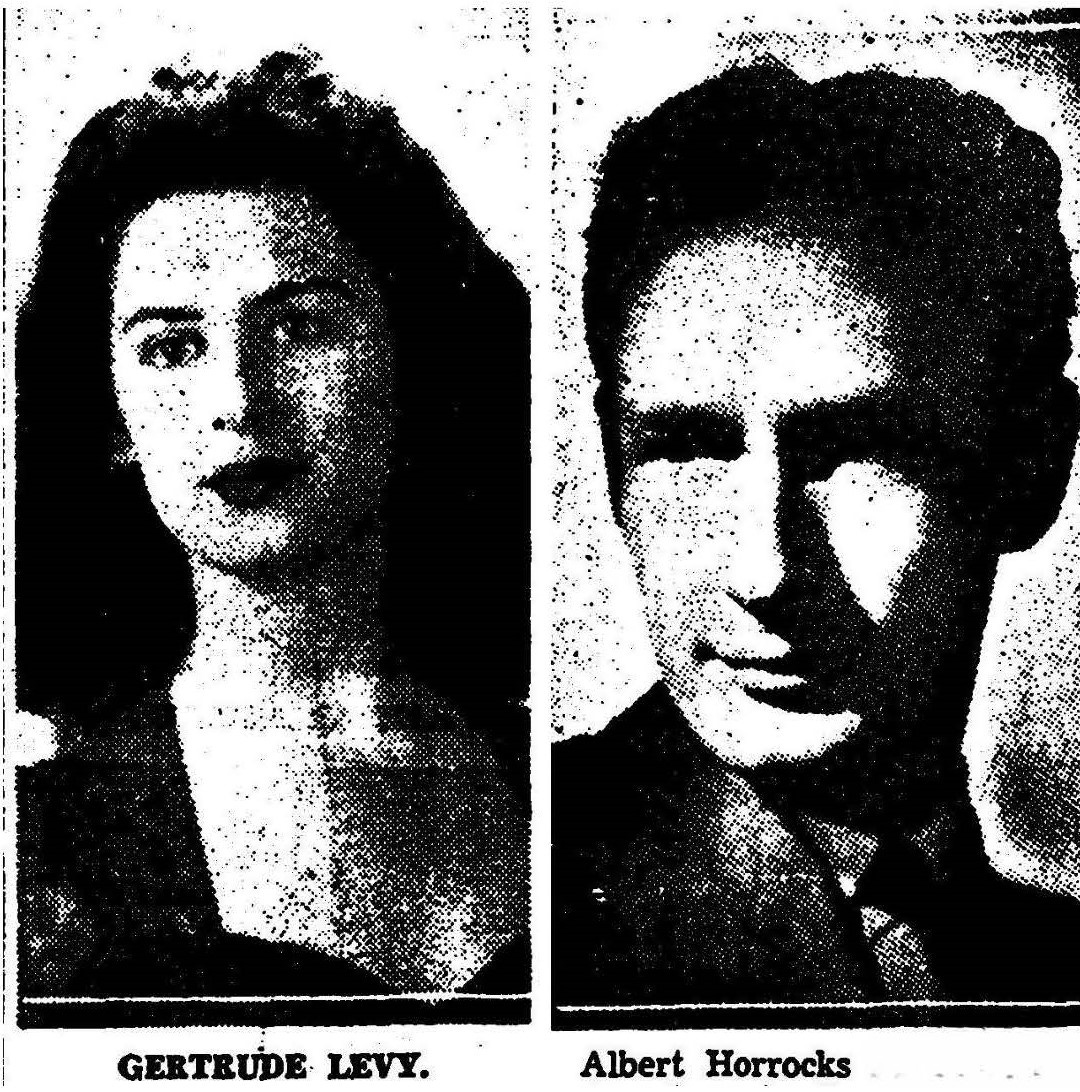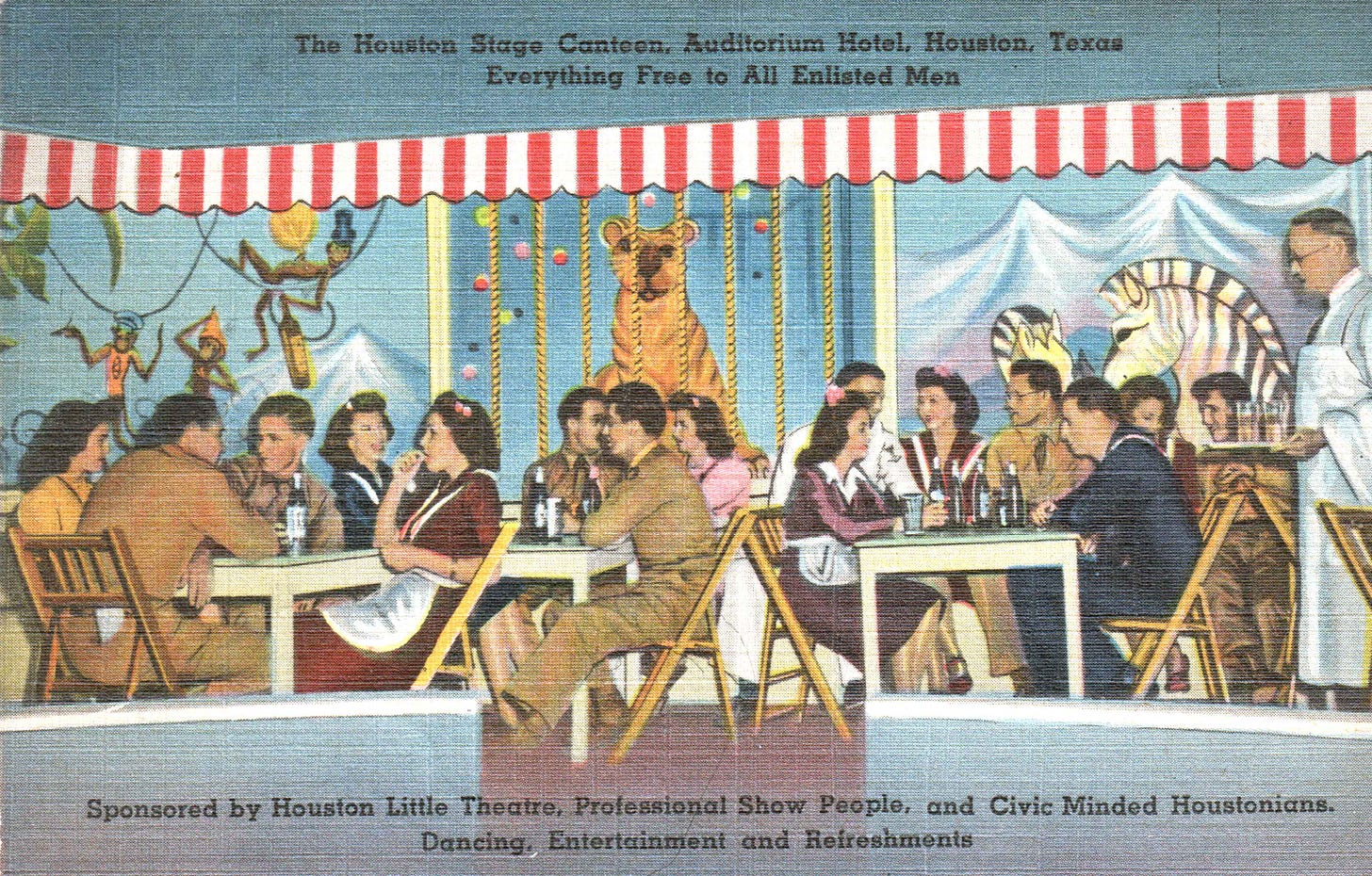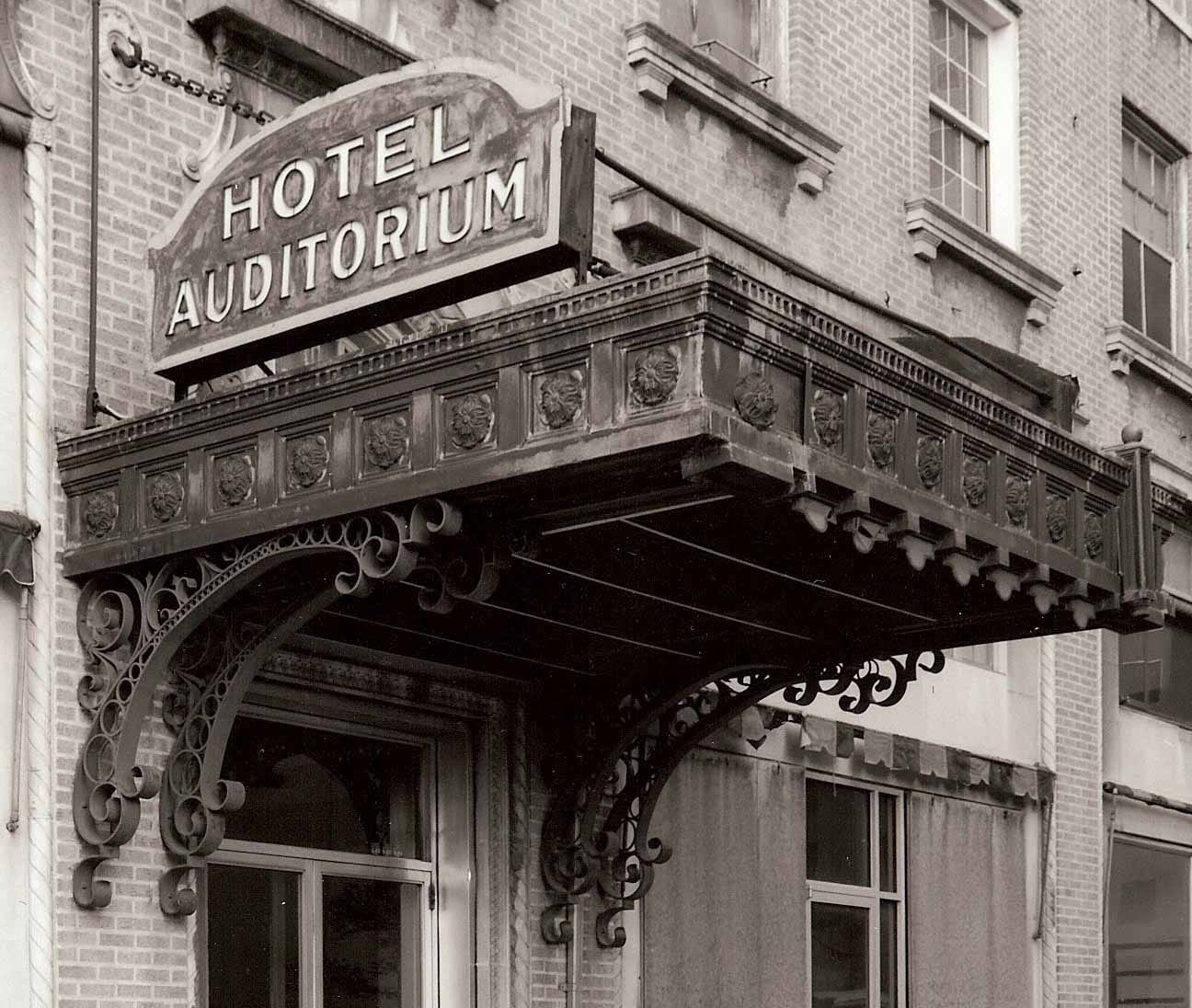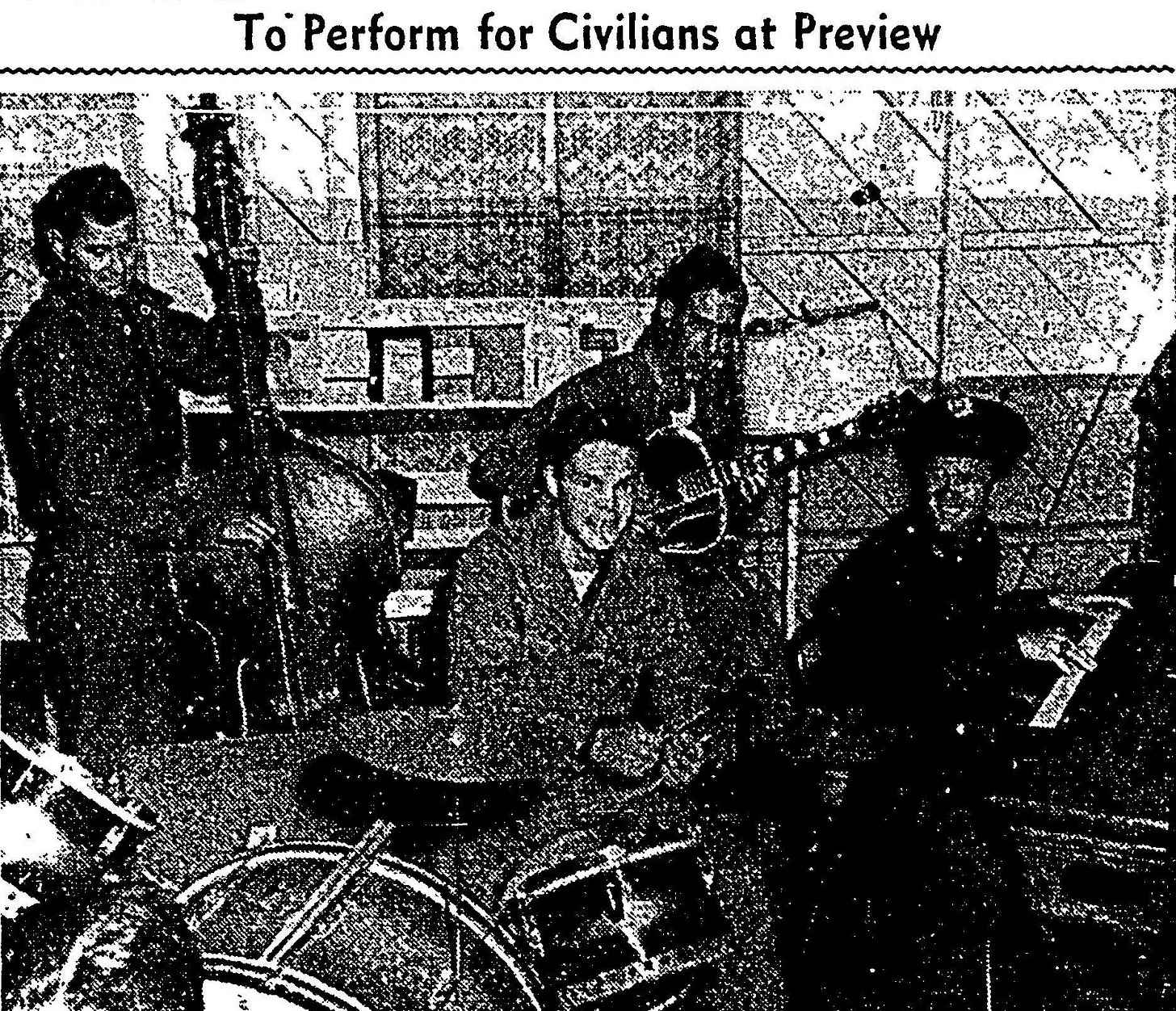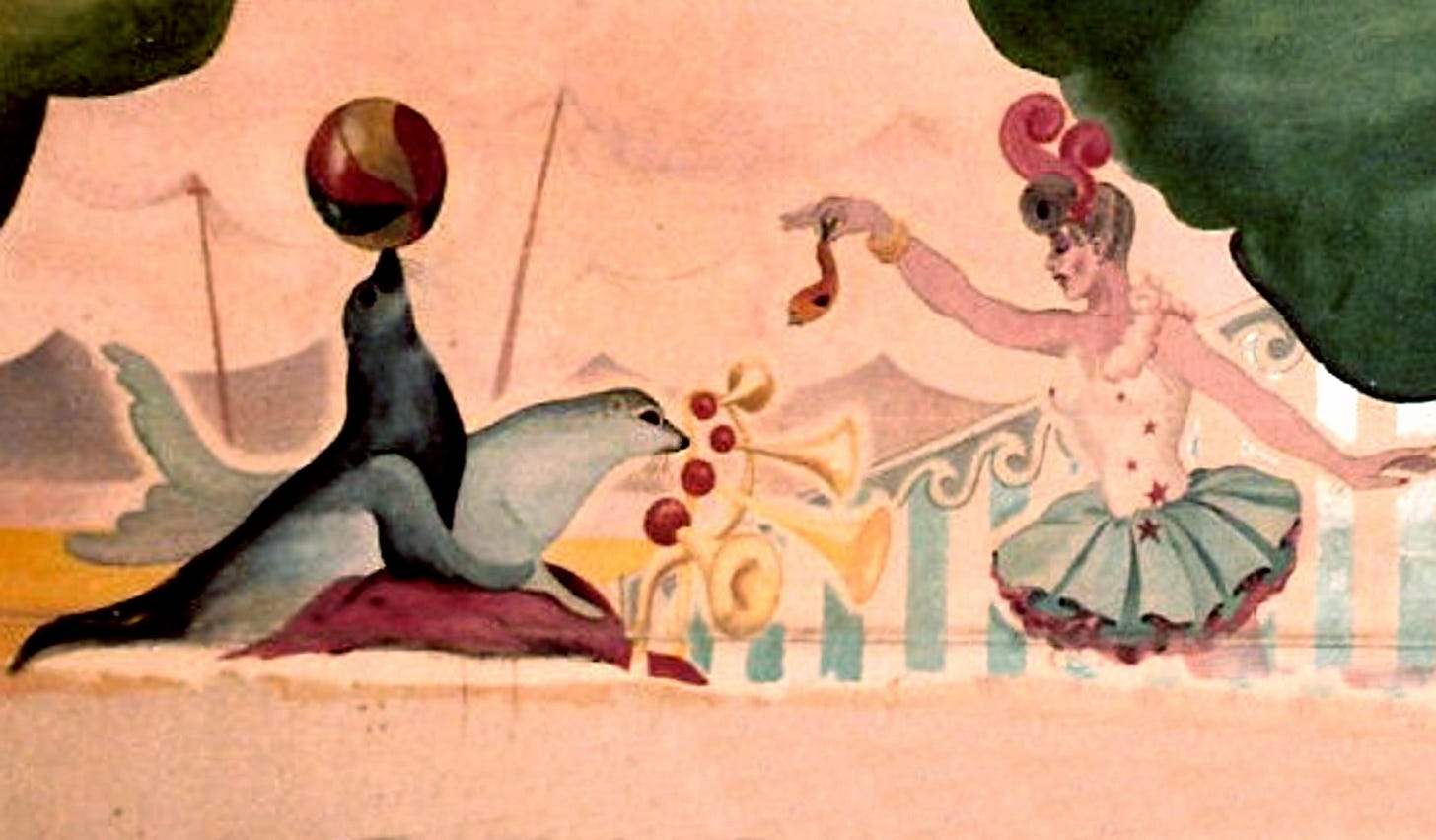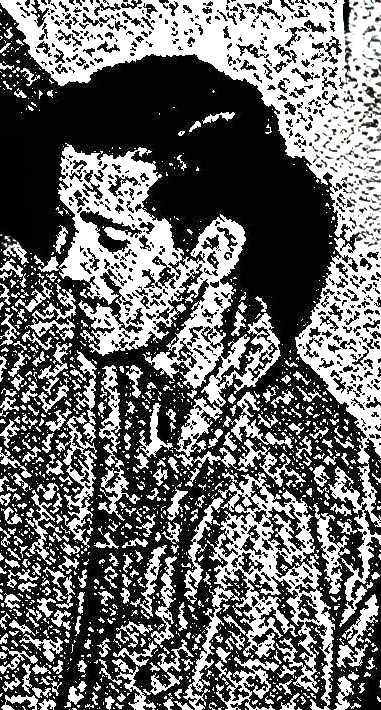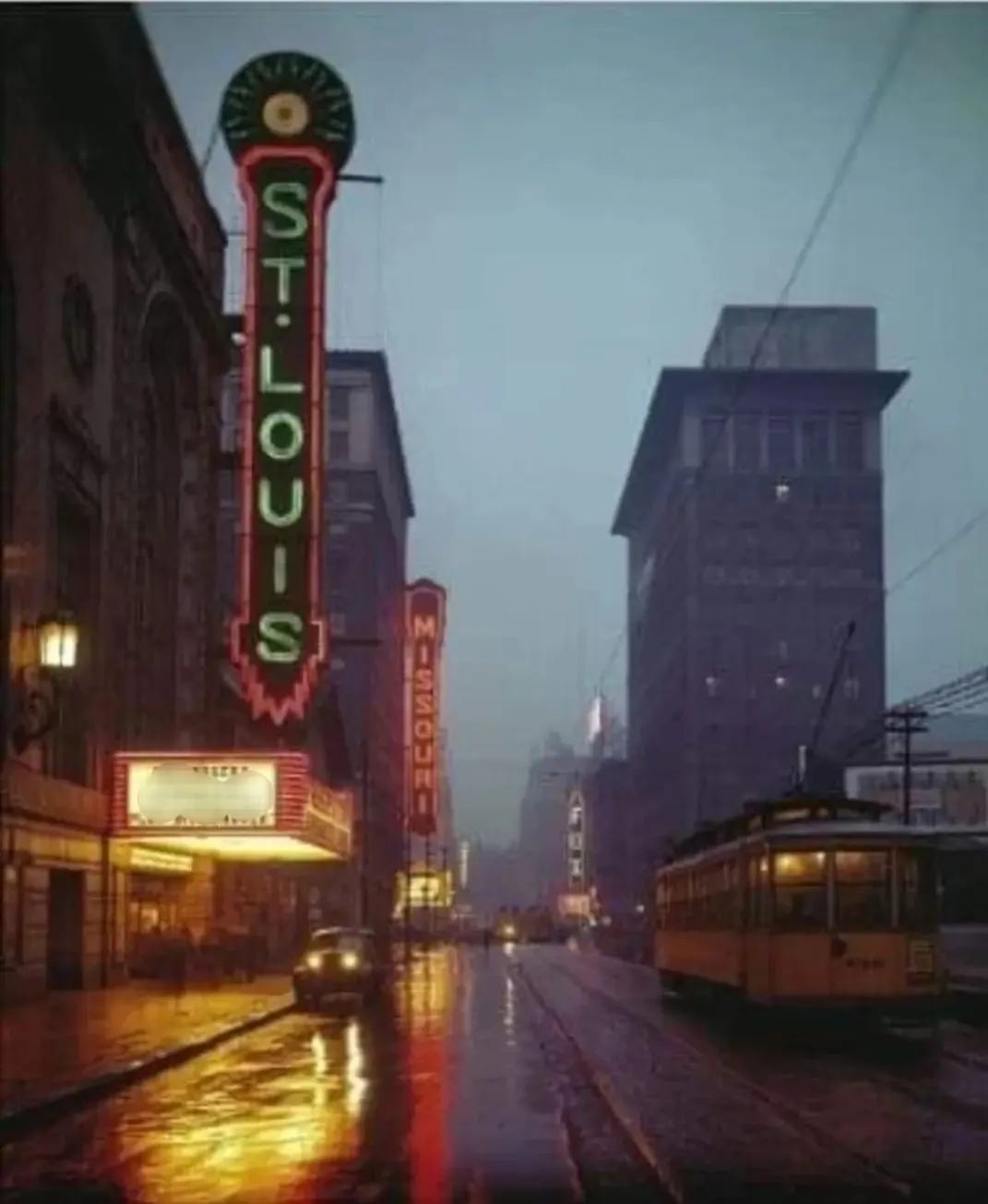Left Bank On the Bayou - Combined
A Queer Houston Story of the 1930s
Part 1: Home to Houston
I had come back to Houston from Paris in the spring of 1926 thinking I might stay. But after the banquet of Paris, Houston, then, seemed like a famine. Especially for a man like me, who had discovered in Paris, not just that I loved other men – I already knew that, even long before I could say it to myself or anyone – but also that in a few places, Paris chief among them, it was possible to live life almost openly as a man-loving man, to go through the days and streets with love beside me, no need for hiding or shame. Almost none, anyway – old habits die hard, even in Paris. There had been heartache for sure – first Clem, then, my Cellist, then the two of them together! Though by now I had lived enough and matured enough that I had no hard feelings toward them; I only hoped that they’d found happiness in each other.
But after the paradise of queer Paris (somewhat flawed, perhaps, but still paradise), Houston, in 1926, had seemed intolerable. I quickly sensed that there could be no life for me in the city other than that of my Mother’s son – whether dutiful or rogue, it hardly seemed to matter: either way, my Mother’s son. Oh, certainly I could have skulked off to New Orleans from time to time, and perhaps found a night or two of respite in some French Quarter bar or back alley. But in Houston, only a proper me, a good-boy me, would do; and I knew that after Paris, where I had lived my truth and found I liked it, even though at times it broke my heart, I could not – would not – go back.
And so, after a few months, I’d gone to New York – only slightly better than Houston, certainly no match for Paris, but with the advantage, at least, of being huge, with ever changing multitudes – “City of Orgies,” as Whitman had called it, and still the city of “the swift flash of eyes offering me love” that it had already been in his day. In New York no one had known me from birth, known my people for generations, thought it their right to know everything I did, everywhere I went, and with whom. And, most of all, for me in New York, my mother, whom I loved, but for whom I would never grow out of childhood, was a thousand and more miles away. In New York I could live a life that was more than a constant stream of childish fibs. Though the fibs did still get told during the rare visits home.
But now mother was dead. My father had preceded her years before, and my sister too, my only sibling, one of the multitude taken by the Spanish Flu back in the teens. She had died before giving my parents the grandchildren they longed for – grandchildren I would never give them, certainly – so I now had no close family in Houston. The family home, built by our grandfather in the 1860s in what came to be called “Quality Hill” – called that by those who built their houses there, at least – came to me, as the only remaining heir, the end of the line, to state it bluntly. Since I’d grown weary of my New York life anyway, I decided to move back to Houston, to live in the house I’d been born in, grown up in, thought I’d never live in again.
I’d even made my childhood room my room again, in part because I liked the view over the garden from the window. I smiled, thinking how such thoughts mirrored the joy I’d felt looking out my window in Paris 10 years ago, over the Madame’s garden – joy magnified as Clem, and then my Cellist, stood beside me also looking, or lingered in bed, calling me back. But, even more, I chose the room again to prove to myself that I’d grown up, that I’d matured enough to not let it keep me the fearful child I’d been when living in it those years before – fearful, most of all, as I became aware of myself and the world, that my parents, my family, my town would see the kind of boy, then man, I was becoming: one whose love “dare not speak its name.”
Houston had grown so much since I’d gone away that the house – my house, as it had become – now sat among businesses rather than the other genteel residences that had been its neighbors in my childhood, or the open fields all around when grandfather had built it. It had become a faded beauty set in the fading remnant of what had tried to be a sort of Paradise garden for a reborn new south, a vision bustling Houston had proved too impatient to let mellow into a local version of the antique New Orleans Garden District. Before too many years I would probably be forced to sell and move elsewhere, perhaps even move the house itself elsewhere, just as Mrs. Cherry’s house had been moved one night in the 90s, from its original site on Market Square, out to distant Fargo Street, then almost in the country it was so far away. The taxes on such a lot so near the commercial center of this now burgeoning city would become too much for my modest income, even adding my inheritance from parents to the legacy left me by my sister.
I would always be grateful to my sister for her forethought in leaving me that legacy at a pivotal time, making possible my life in Paris, a life which had changed my world forever, a life which I’d come to know was indeed the “movable feast” Ernest had dubbed it. I sometimes wondered if she had perhaps known better than I what I would need to become myself, and that she could give me the means for the task, as James had for his “Lady” in his famous novel. I wept that it took her death to make my own life possible – my real life as the man I was, not the man all my history had said I “should” be. Perhaps she knew me better than I could have imagined, and watched over me from wherever she had gone. I saw my life, in part, as a tribute to her too short one, and pledged to myself to be the best, the truest man I could to honor her.
Even her legacy, and the little left by mother, however, would not keep me in the house forever. Certainly the little I earned by my writing would not do so either. It pleased me that I sometimes had poems printed, and that my latest play (after the dozens that came before it), had made its way to a stage or two. But hardly any money came from either poems or plays. And the articles I sometimes managed to sell to newspapers turned into little cash.
But that was a concern for the future. Just as the passing of mother, and all my family, made my reasons for fleeing to Paris, and then New York, a concern of the past. Now my challenge for the present was to build a life in Houston, that I could embrace as my life, and live proudly.
Part 2: Tea and Memory, with Mrs. Cherry
It could be that the best part of Paris is the memory. Because in memory there’s no need to acknowledge the grit of reality, but only the romantic glow of the Paris “we'll always have,” as we'd like to believe it really was.
The thought was not completely new to me, but it came to mind again on a fall afternoon in 1936 as I sat in the antique parlor of a Houston house I had visited a hundred times before, over the decades of my life.
“Do you remember our evening in Paris in 1925?” asked Mrs. Cherry. “When we ate tête de veau, and then went to see Modigliani’s paintings – you for the first time, as I recall – and after that, thrilled to Josephine Baker’s Danse Sauvage premier at the Théâtre des Champs-Élysées? What a splendid evening! With Clemmie Tan and your Cellist – and, later, that fellow from Chicago, Clem. How long ago it seems now.”
Mrs. Cherry flooded us with these fond memories as we sat in her parlor in “The Cherry House.” That is what everyone called the lovely, white-pillared, Greek Revival residence that Emma Richardson Cherry and her husband, Dillin Brook Cherry, had lived in for decades – much longer than previous owners, William Marsh Rice, namesake of The Rice Institute, or the long-forgotten Nichols who had actually built the house in 1850. We sipped our tea from delicate porcelain cups in the parlor after a pleasant hour in her studio, the place where she painted, of course, but also where she taught the many young Houston artists she had been helping find themselves as artists for as long as she had lived in the house. I had been one of those students myself, years – no, decades – before.
Though not quite so “historic” a structure as the Cherry House, my own house still counted as antique by Houston standards. As I looked around Mrs. Cherry’s room, I thought of my own “parlor” – what an antiquated term in 1936, but how apt for that front room of my family house, not much changed since the high Victorian stuffiness of the 1880s had filled it with uncomfortable, carved and inlaid wood and horsehair chairs and settees around rosewood and marble tables – incoherent blendings of Herter and Belter translated into new dialects as those styles made their way from the showrooms of New York, down the coast and around into the Gulf, to the workshops of New Orleans – and then to the front rooms of Galveston and Houston – showy rooms of questionable taste decorated by grandmothers, like my own now long departed MawMaw, who found themselves, circa 1880, with the means for lavish display – lavish by the provincial standards of Texas at the time – but without the “sensitive” sons to help them modulate it. I smiled, thinking how MawMaw could have benefited from my help – or even more, from that of some of my Paris and New York acquaintances. Still, I had not yet been able to bring myself to change anything about the house; perhaps I never would.
Mrs. Cherry needed no such “sensitive” helpers to make her own room magnificent. Around us, on her walls, hung some of the Cubist studies she had done all those years ago, in Lhote’s atelier, in Paris. Also, other pieces she had done in the 1880s – copies of masterpieces in the Louvre, and her own early Impressionist canvases and watercolors, done at Giverny in 1888 and 1889 – where she had gone to visit Mary Hoyt Seller, her girlhood friend and traveling companion on that first trip to Paris – her companion until Mary met and fell in love with the charming Englishman, Dawson Dawson-Watson.
When Mary and Dawson married, after a courtship of barely the winter months, he took his new bride to Giverny, where he lived in the fledgling art colony developing there – and where Cherry visited the newlyweds, and painted alongside Dawson, at the start of what had become a nearly 50 year artistic friendship. It was partially that friendship which had brought Dawson to Texas years later, to San Antonio, so that he too was now a “Texas” painter. The Dawson-Watsons had even lived some months with the Cherry family in this very house, small as it was for so many personalities and talents.
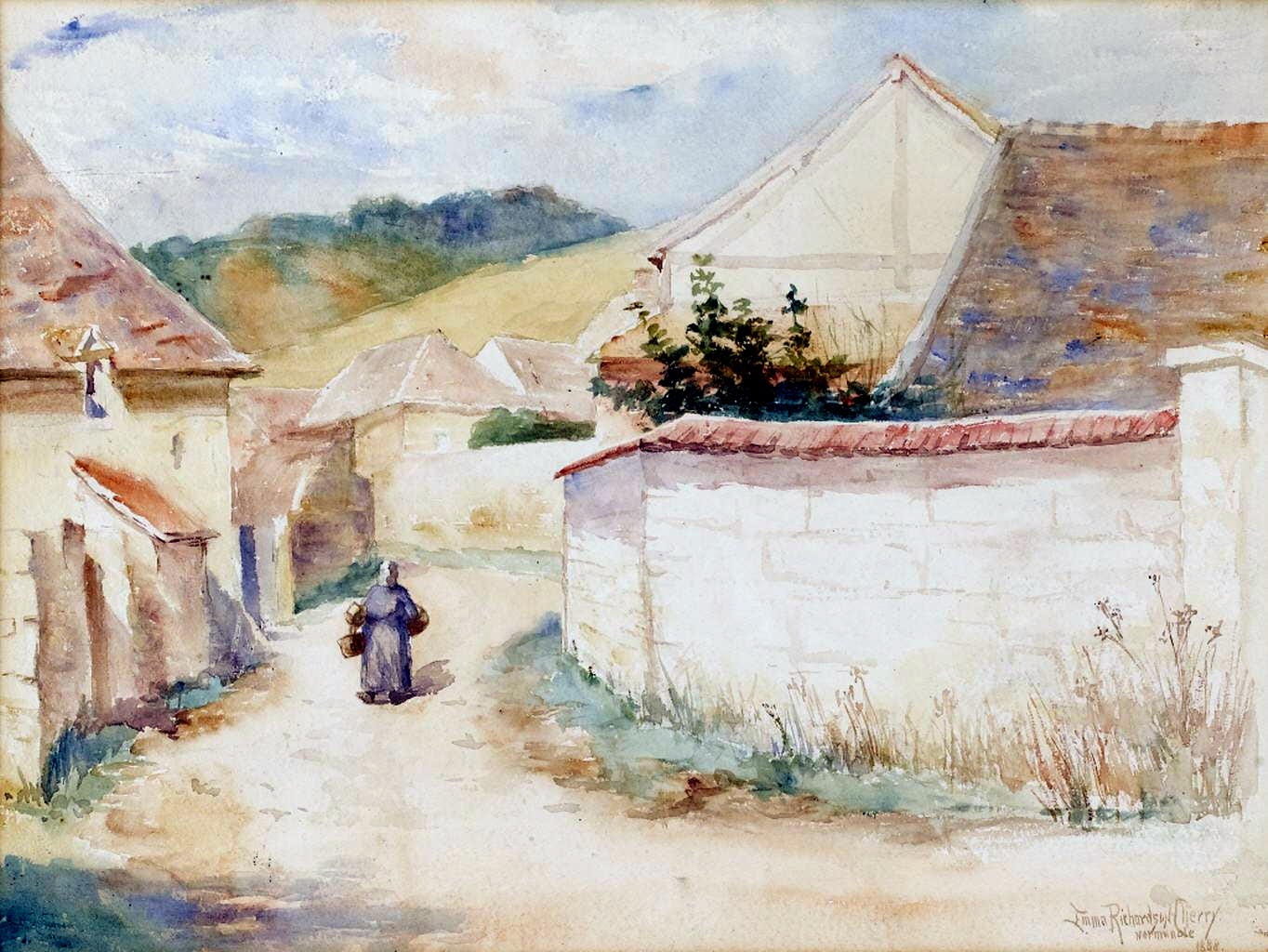
But her Cubist and Impressionist paintings were not the only pieces on the walls. Fabrics and objets d’art brought back from her studies and her travels filled every inch, things purposefully selected to adorn the “artist’s home” she envisioned for the venerable, historic old house that she loved so much – and which she had made the artistic center of Houston – the center, that is, as far as real creation was concerned, and not just the superficial, showy palaces that all the new oil and old lumber money of Houston made possible for the rich, both nouveau and ancient, of the booming city.
I always found it a nourishing room to sit in – even though stuffed full, and not what anyone would call “modern,” despite its owner/decorator’s desires to be modern, at least in art and mind, herself.
In her studio, she had shown me her latest paintings – wonderful canvases, in which she joined her mastery of color, with impeccable drawing and a long-honed talent for revealing the essence of the people, places, objects she painted, not just their surfaces. In what was already becoming a slightly old-fashioned manner, she always painted “something,” not just the abstract shapes that were becoming fashionable. She’d had her early training in the 1870s and 1880s, from William Merritt Chase and Luc-Olivier Merson, among others, in New York and Paris, at a time when paintings had to depict something. But always wanting to be “Modern,” especially in her art, she had studied modern color theory with Hugh Breckenridge and Henry McCarter, in Pennsylvania; and she had gone to Paris in 1925 to learn Cubism from André Lhote. I had briefly studied with him too.
And she had learned Lhote’s lessons well. She still incorporated Cubist elements into her works when she could, sometimes masking the cubist under-structure with “sheer prettiness,” as she said. Ever the professional, she painted to sell – and, after so many decades, she knew what would sell in Houston. Some criticized her for bowing to her market, for deception. So be it. An artist must eat and have a roof overhead in order to paint – even one who lived her creative life, metaphorically and sometimes actually, en plein air. Mrs. Cherry was no “Sunday painter.” And so she did what her profession demanded, and she did it beautifully.
“You’re right, I think, in coming back to Houston now – now that you can be here in your own way,” she said.
Though we had never talked in detail about “secret” things, being a woman of the world, she knew – as she had let me know all those years ago in Paris.
“I spent years in New York as a young woman, and, if it had been only my own wishes to consider, I’d have spent more time in Paris, perhaps stayed there. I even, for a while, thought of moving to California when my brother, Edward Richardson, went there. But I don’t regret my decision to remain in Houston. No place is perfect, no matter how we see it in our memories or our dreams. I believe in my heart that life is what we make it, taking the good and the hard together, no matter where we are.”
We sat silent for a few moments, both thinking, no doubt, of Paris – perhaps the Paris of our memories and our dreams.
“Maybe Paris seems long ago because it was,” I said. “Ten years! I was so young!”
She laughed the beguiling laugh her friends loved. “I can’t say the same for myself,” she said, “Then or now. But you are still young. What? Thirty-five? And look 10 years younger. So much is still ahead for one so young.”
“What can pass for young, sometimes, in a dim light,” I said, pleased that she gave the compliment, but aware that it was a compliment as much as a reality. Especially aware since I had now fallen in with a younger set – some of them actually 10 years younger – in the art and theater circle that had flourished in Houston since I went away, 15 years ago now, first to Paris, then to New York. How much the city had changed over those years. How much I had changed. Time would tell if the two of us had changed in ways that would make a Houston life the life I wanted now.
Part 3: Bohemians
When I’d left Paris in the spring of 1926, to return home to Houston (Mrs. Cherry had not returned until the fall), I’d been a young man with a bruised heart who could hardly grasp that the fairy tales of childhood had not come true, that my Prince Charming – Prince Charmings, as it had happened – had not prized me, once found, above life itself – that, in a stinging twist not part of any of the tales of childhood, they had found their bliss in each other instead of me. Or I imagined they had, with an ocean between us.
By the time I returned to Houston again, in 1936, no longer young, certainly not nearly so naïve, the heart had grown accustomed to bruises, had accepted them as part of life, along with the leaps of joy and hope that preceded them. I did not believe that I had become cynical or bitter – only more knowing from experience in the ways of the lives of hearts in love, especially for men forced to live warily in a world with little sympathy or room when both of the hearts belonged to men. After 10 years, wariness and weariness had blended so thoroughly that I felt sure even a monkish renunciation of love in Houston, if that was what lay ahead for me there, would be preferable – for a while, at least.
And yet I knew that I would not be living a life of solitude in Houston, nor even a life apart from men like me. I knew because I’d made connections with other Houston expatriates in New York, also going “home” – connections that already promised to go with me back to the Gulf.
First among them, the impetuous, exuberant Wilma – daughter of the Houston Heights, poet, girl about town in the Big Apple demi-world, about whom a reporter of Broadway gossip had said in his column, “Wilma, the poetess, is returning to Houston because the first three men she met in N’Yawk offered her their lipsticks between lisping comments on the cut of her gown.”
Indeed she was returning to Houston, but it was circumstances, neither the lisping nor the lipstick, that moved her go back. In fact one of her own poems, “Greenwich Village,” in its concluding lines, advertised the spirit that had drawn her to the bohemian life of “the Village,” which she was bringing back to Houston with her:
And life was lean And beautiful, And love was young and glad – It’s good to be A Village poet And a little mad.
I’d met her in my own about-towning, in the company of Parker Tyler and Charles Henri Ford, two other Southern boys storming the City – Charles had even lived in San Antonio for a time, in his younger days. The two were famous – infamous, some would say – for their portrayal of that very New York demi-world, a queer world, in their co-written novel, The Young and Evil, so scandalous, which is to say, so truthful, that it could not even be published in New York, had to flee to Paris to see print – where Charles followed, and where he – small world – became the “special friend” of Tchelitchew, the Pavel I’d known myself years before (though not, myself, as quite such a “special” friend).
Wilma and Parker had become their own special friends – she even had stars in her eyes for him. Too bad for her, since the stars in his own eyes walked elsewhere, and in trousers – or perhaps I should say to be clearer, less coy, now that Deitrich and other women were already making trousers their own by then – the stars in Parker’s eyes were for men. So it was not that that prompted Wilma to buy her ticket to Houston; perhaps it was something of the weariness I’d come to feel myself.
And then there were Royal and Chester, another couple of Texans who’d come to New York to meet, as it happened, and now that they had, were decamping back to the Gulf. Royal, some years older (Chester was my own age almost exactly), was becoming rather famous as a nature writer, story teller and lecturer. They had met when a publisher hired Chester, a young artist, to draw the illustrations to one of Royal’s books. They formed a partnership that went beyond books and publishing, and had already returned to Houston, to the “Patio,” their shared residence/studio on Truxillo Street, Chester painting in the main house, Royal writing in his study out back. They hosted gatherings – their “vespers,” as they called them – of Houston literati, which might have been called salons in more sophisticated settings – settings with running water and electricity. But the rustic life, meaning the life of the mind and eye, and a life together, seemed enough for them.
I knew them well enough in New York to stay in touch – though to tell the truth, they held some ideas, metaphysical almost, which I smiled at, and found difficult to take seriously. But they were both lovely men, and so when I returned to Houston I knocked on their door almost before I’d unpacked my trunk, and I became a regular at their amusing soirées.
One of the most amusing people I met there was Margo – Margaret at birth, but “Margo” as she’d christened herself, and she withered with a glance and a tart word any who dared to use that other name. Though “amusing” is such a pale descriptor for such a force as she. In the summer, she’d stage-managed the Houston Federal Theatre production of Chester’s play, Pioneer Texas. How quaint: he was a better artist than he was a playwright by far – but bills had to be paid. Margo’s theatre dreams went far beyond stage managing. One day she would have a theatre of her own, she proclaimed, and one day she would direct on Broadway. Even as one who knew the New York theatre, and whose Broadway dreams had paled in their own way over the years, I could almost believe hers would come true. Even now she, and her friend, aspiring playwright Zoe, were away at the Moscow Art Theatre Festival, in the company of New York critic Brooks Atkinson, playwright Lilian Hellman, and Al Hirschfeld, theatre world caricaturist – though how welcoming those Broadway luminaries might have been to a pair of brash young women (still girls, almost) from Texas – almost as far from New York as Moscow, and more exotic – who could know.
Through Margo a queer Houston world had begun to open for me, a world of theatre and art and writing, and of queer vibrancy, that I could hardly have imagined possible along the banks of sluggish Buffalo Bayou. Young actors and artists and writers and hangers-on, who could not resist – had no desire to resist – when Margo called them to join her quest to “integrate all the arts,” which meant, when she said it, direct all the arts toward fulfilling her own theatre dreams. Because for Margo, life was theatre and theatre was life, absorbing everything and everyone.
I could only be grateful that this tribe of youngsters, most 10 years my juniors at least, seemed inclined to include me as one of their number. How lucky that, as Mrs. Cherry noted, I at least appeared to be younger than my age. They might not have been so welcoming of a man as old as I who showed in his face the years (and wisdom) he’d acquired. Because wisdom, and a wrinkled face, often do not rank high among the young.
Margo had even talked with me about writing a play for her, that she could use to found her theatre company when she returned from Moscow. And I had begun to outline one I thought (hoped) might appeal to her. How disconcerting, I sometimes thought, for one as mature as I to be wondering if I’d meet the expectations of a young woman of no real record in the field in which I’d toiled for a decade already. I almost regretted saying I’d do it, but even if you resisted at first, eventually you gave in, because “you couldn’t do anything else,” as Cardy, one of the young artist set said, as we commiserated over a drink one evening after Margo had had her way with both of us. She larded her cajoling with “darlins” and “babies” and “sweeties”, but you knew you wasted your time demurring, because she had a way of making sure that she achieved her objectives eventually. And so you went along, and in the end were glad you did.
Part 4: Dance
Some of my New York friends who still wrote gasped in amazement at my return to Houston. Not many did still write, and even those few would likely fade away in time, since the “friendships” had been built mostly on late nights on the town and gallons of bootleg hooch. But the few who still did write wondered what I could possibly find to do there. Or who. As per one, who reveled in his to-the-limit incautiousness – who delighted in claiming that he was a model for Ford and Tyler in their Young and Evil. I could see the mock-regal turn of his head and hear the lisp from his pursed lips as I read his words: “My Dear, how ever do you keep your sanity – or is that sin-ity (I blush!)?”
Often, the wonder came from those who came themselves from small towns in Ohio or Nebraska or other equally far away states from which they had fled, never, they hoped, to return. They clung to the anonymous freedom of New York with the desperation, the terror, of creatures holding on for dear life – even when the price of the life could itself be dear. And so, when one of their tribe – in this case, me – actually did return to his awful place of origin, they felt a new terror, as though the talons of their own awful places might reach out for them. I wondered how many of them would one day go back, as I had, whether by choice or necessity. I hoped that all who did would find ways not to regret it. But likely I would never know, because the letters would likely have stopped by then.
Sometimes the letters came with news of some of whom I would as lief not be reminded. Sometimes they took me back to memories of lost loves and heartaches past – which, even with time and distance, might not have yet fully passed. But a tear in the corner of the eye is sometimes not a completely awful thing, and so I welcomed the letters while they still came, and sometimes even wrote back with news of my new life – and what I was finding to do to make it livable. Perhaps my news would comfort them when their own day to return arrived.
And one of the things I found to make my life livable, even in far-off Houston on the far-off Gulf Coast, was dance. By dance, I do not mean the Lindy Hop, or the Swing, or the Shag, or whatever names such popular revels might be called. Though I might, at times, with enough of the no longer prohibited hooch, attempt those myself. The dance I mean was the Ballet. For, perhaps surprisingly, Houston had long had a history with ballet, which, by the time I returned was becoming even closer. Now, the Ballet Russe made annual tours to our southern city – in the winter, when we were mild and other stops on their list were frigid.
But my ballet mania went further back. Certainly, my taste for it had grown stronger in Paris, with Diaghilev and Ballet Russes at their height, unsettling the world as Nijinsky and others danced to the music of Stravinsky and Satie, costumed by Bakst and Delauney, in settings by Picasso and Cocteau. Diaghilev was now dead, after a life of hard living and exhausting art, and the company that now came to Houston only bore a similar name. But I remembered when Diaghilev had come to Houston in 1916, or at least his Ballet had, with the great Nijinsky himself topping the list of dancers; and, even earlier, when the “incomparable” Anna Pavlova had come in 1911, partnered by Mikail Mordkin, in an astounding first for the city, and for me.
The same Mordkin who came again later, with his own company, and to whom my Houston friend Eugene, wrote his paean in poetry, and published it in the local paper:
My Love, The Dancer, Is like a horse! A young horse that prances, When he dances Up and down the stage of life. His smooth and nude and shining body, His tightly-rounded arms And legs and hips and thighs, All are shot with lightnings From a hundred thousand skies … Enraged, My Love, the dancer, Prances, prances, prances! Dances, dances, dances; Up and down the wave-licked shore. Till his rage can be withheld no more! Snorting, snarling, roaring, He plunges into the snarling sea, Determined to down it And all its strange myster[y]. …
Strong stuff, scandalizing many, no doubt, when they came across it in their morning Post, but stirring deep yearnings in others, including me when I read it in Houston in 1926, even after the hedonistic Paris I’d recently left behind.
Those earlier encounters had sealed my fate as one addicted to the drug of dance. Now, however, dance even more thrilling than the ballet of Nijinsky, Pavlova and the Mordkin who had so moved Eugene, was coming: Ted Shawn and his all male company. Called by some “modern” dance – though what could be more modern than The Right of Spring had been in it’s day? I’d had a taste of this “modern” dance in New York – and of Shawn, when I’d seen him dance his ethnic dances in programs with his wife in their Denishawn phase. But the very thought of a company composed entirely of men, and men likely minimally costumed with the license the modern-ness of the dance seem to give, revealing “smooth and nude and shining” bodies – male bodies – thrilled in ways that paled even my recollections of Nijinsky in his prime.
I’d bought my ticket the instant I’d heard the news, or as soon, that is, as I could get to the ticket office of Edna Saunders, Houston’s impresario, at Levy Brothers department store on Main. I was not the first in line. I saw many familiar faces eager to get their tickets too – many faces of young Houston men I recognized, even if I didn’t know their names. We all knew it would be an evening we’d long remember – and perhaps, dream about.
Part 5: The Evening Arrives
The actual evening, when it arrived, in February 1937, was a lovely one. The performance would be in the City Auditorium, where I had spent so many stirring evenings – including that one in 1916 when I’d first seen Nijinsky’s magic. This one, I knew, would be as magical, as moving.
I walked from my house to the Auditorium, through the still bustling business district, the mildness of the Gulf Coast winter making the evening a magical dream, certainly as against some of the hard winters I’d known in New York. It was the southern mildness that brought the Ballet Russe to Houston so often in the winter months, when snow and ice froze the vibrancy of cities more exciting other times of year.
The performance would not begin until 8:15, so I decided to stop by The Rathskeller for a bit of supper. It might even be busy this evening, since so many of “the boys” would likely also be needing something before the performance, to make sure their stomachs didn’t rumble at the dramatic moments of what all anticipated as a riveting (and arousing) exposition of maleness, such as they often dreamed of, but seldom had the chance to see so openly anywhere but the gym.
I walked up Main Street, past the mirrored kiosk in front of Levy Brothers, and admired – some might have said, assessed – the handsome youth looking in the mirror as he combed his already flawlessly combed blond hair, his eyes darting back and forth like dancers themselves as he assessed the other men who passed behind him on the sidewalk. I did not recognize him – though I did recognize his “swift flash of eyes” and suspected the “love” it might offer. Perhaps he’d come to town on business or for the performance. Though even in Houston, growing fast and large, I no longer recognized everyone – not even those like me in that unspoken essential way. I didn’t have the time to stop to comb my own hair, or to check it in the mirror in case it needed combing, but I’d remember him in case I saw him another time.
When I went through the door of the Rathskeller, I saw the young Billy Goyen, whom I’d met at Margo’s theatre, sitting at a corner table, writing, writing. Who knew if what he wrote was good – probably it wasn’t, he was still so young – but he wrote so doggedly that one day it might be good if he kept at it. Bill Hart sat at the table too, looking at Billy with love in his eyes, love which only its object seemed not to see. They both had part-time jobs at the public library, and so I saw them often, though Goyen seemed hardly to have time for an “old” man like me. But it could be he hardly had time for anyone, so absorbed did he seem to be in himself, his writing, or his shyness. Hart I’d come to know in many ways, meeting him first one evening shortly after my return from New York City, as we both stopped to check the status of our hair in Levy’s kiosk mirror.
I smiled at them and nodded, but I did not disturb them at their table, in their labors of writing (Goyen) and longing (Hart). Instead, I walked across to the bar, nodding and smiling also to the Frau proprietress, who welcomed through her door those of us who found some doors not so welcoming. I ordered my lager and sandwich, and sat alone at my table to enjoy them, as I savored the anticipation of the dance that lay ahead – and as I looked around at the other men who peopled the Rathskeller on that early February evening.
There were only men, and only men of our “peculiar” type. Like the Madame in Paris, who saw everything, but when it suited her, saw nothing, our Frau of the Rathskeller did not see – or at least pretended not to – when hands met beneath tables, or lips touched cheeks in the half-light of dimmer corners. Perhaps she really didn’t see, or wasn’t bothered, so long as the police weren’t bothered either; or perhaps she enjoyed her occasional dances with the “boys,” who could not dance with each other, not even when they’d passed through her welcoming door. That would have bothered the police indeed, at least when it suited them or their politician bosses to be bothered by it.
As in every city of any size, and likely in many towns large and small as well, places like the Rathskeller existed, places where men could meet each other, men of our “peculiar” type. Where there’s a will there’s a way, and a place, and our will to meet each other found its way everywhere. Even here in Houston, just blocks away, we’d found more places: The Old Vienna, the Capitol Bar, Rex’s. And the kiosk at Levy’s. And what some might consider more unsavory places: the facilities in the basement of the Milby Hotel, Sam Houston Park, across from the Central Library, the blocks of Main Street where one could go “window shopping,” the steam rooms of the Turkish baths around the city, at midnights and mid-afternoons, and the corners of the Rice and Texas Hotels – especially the latter, where many of the theatrical types stayed on their brief stops in town, for one night stands (in double senses) as their companies made their tours.
Even as I thought of myself as a sophisticate, one who had explored (or at least heard tales of) the nether worlds of Paris and New York, I found some of “our” places unsavory myself, and knew of them only because I’d heard tales. Still, I would not condemn those who frequented even such places, since the world allowed us such few. I might not choose them for myself, but how could I deny them to others, who might not have even the meager opportunities my affluence, education and experience afforded?
As I finished my early meal (I expected I’d be having a supper somewhere later, unless the dancers left me too thrilled to eat), I thanked silently the greater powers that had granted me those advantages, which now were taking me to an encounter with art and maleness such as I could not even have imagined in the days of longing I still so vividly remembered from my youth. My only regret this night was that I would be going to it alone. Though not absolutely alone, since I knew the seats would be filled by many others like me in our essential way. Strength in numbers when the number was hundreds, almost as empowering as when the number was two.
Part 6: Ted’s Men
The instant the curtain fell on the final dance of the program, the auditorium thundered with applause. Bravos rang through the air, and most in the audience – disproportionately men, of all ages, in ones and twos and groups – leapt to their feet. It was not so large an audience as the several thousand who had applauded the femininely classic Ballet Russe that I saw in the same space the month before, perhaps, but this night the several hundred on hand (and now on their feet) cheered Ted Shawn and his young men dancers with a masculine abandon that thrilled the heart of even an old jade like me. Not so old, really, but sometimes feeling so.
But not so this night. What I had just seen on stage sent bolts of youth and life through me, and even I, who scoffed at standing ovations except when the very pinnacles of perfection had been reached, found myself on my feet with all the others. I began to think of the praises I would sing in the review of the performance I had agreed to write for the newspaper: “America interpreted in dance … with the program Shawn and his eight personable youths gave Thursday night … the strength of all men dancers … perfection of grace, rhythm, balance and muscular coordination … young, of slight build, buoyantly graceful … the epitome of eager, young America … applause often wild at times …”
Shawn and his beautiful young men returned to the stage time after time, sweat still glistening on their lithe, near naked bodies, holding hands and taking their bows before the adoring crowd. The rush of virile images almost intoxicated.
At last, when the dancers had taken a final bow, the harsh lights of the auditorium came up, telling us beguiled witnesses of their masculine magic that the moment had ended, that the time had come to return to a world not so impossibly perfect as the one we had just lived in for two precious hours, in the company of eight seemingly flawless youths, and their genius master.
As we all walked out of the rows, and up the aisles, and out of the doors of the auditorium, I spotted some familiar faces among the many unfamiliar ones; spoke the occasional “Good evening,” “How are you,” “Splendid” – though I hardly wanted to speak at all for fear casual pleasantries, or even exclamations of wonder, would hasten the flight from that other realm the dance had taken us to, fear that I would be brought back to earth – too soon!
Across the way I saw an august gentleman I had not seen in years. Memories came back, of touches from his hands years ago. Not unwelcome memories of not unwelcome touches. When I was just man enough to shave, but already fully man enough to respond, to welcome the touches even though they surprised at first and frightened a little. Respond willingly, happily, thrillingly.
I had not seen him in decades and might not even have recognized him – time had made such changes in us both – until our eyes met and took us both back to those past times for an instant. Or so they took me back, and I assumed, hoped, they took him back too, to those touches touched so many years before. His eyes, which lingered a long moment looking at me seemed to say so. Then we each went our own ways, he with a young man holding his arm, steadying his slow walk up the aisle.
Once outside, in the crisp February night air, I knew that the precious feelings from the precious respite would fade soon, and I breathed a sigh of resignation – but vowed to myself to keep the images and the feelings alive in memory.
For a few moments I walked behind Billy Goyen and Bill Hart, on the way to their streetcar. The two had watched the dance together, from the highest, cheapest seats. I heard Goyen gushing, as gifted, slightly priggish young novices will: “I received one of the greatest inspirations I have ever felt when I saw the Shawn dancers.” I might smile at his full-of-self histrionics before his adoring friend, but I could not disagree with the truth of what he said. I too had received inspiration which not even my worldly wisdom could muffle, at least for the little while that the lingering euphoria lasted.
At a corner the boys turned and hurried up the dimly lit street to catch the car already slowing at the stop. Young men, actually, not boys, but 15 years my junior, so how could I not think of them as “boys?” I turned the other direction, toward Kelley’s Grill and a late solitary supper, thinking of the evening that was passing so quickly. At least the lights would be bright in Kelley’s, the champagne chilled and the chatter from other late diners lively, and no one but I would notice – or care if they did – that I ate alone in my booth.
After my meal I walked slowly down Main Street, past the movie palaces whose marquees had now gone dark, past the shop windows whose displays of home furnishings and latest fashions held no interest for me, past Levy’s with it’s mirrored kiosk. I glanced, of course, to see if my hair now needed combing. Habits of long-standing will out, no matter the mood or the hour. And a young man standing at the kiosk, comb in hand, glanced back.
Was he the young man from earlier? Perhaps, though I could not be sure, so many young men had danced before me since I passed the kiosk earlier. Unlikely to be the same young man, so many hours later. But maybe; why not? Here I was again myself, not quite the same, for all those young men who had danced, but not so very different, it would seem, when it came time for these late-night glances.
I thought of going closer. Thought of casual comments about the weather and the hour, of lights for cigarettes and directions to places neither intended going. It would be a dance of sorts itself, one danced so many times before. And I thought of the dance (of sorts) that might be danced later, in a room at the Texas Hotel, or my bedroom, childhood bedroom, overlooking the garden of my house. It might not rise to the level of that danced by Shawn’s young men, but it would be my dance – mine and his. Perhaps he’d seen Shawn’s men too, and felt the same inspiration that I felt, and the two Billys, and the five hundred others, at least, who had seen them with us. And even if our dance fell short of the art we’d seen, been inspired by, longed for, it would be ours. Before the dance begins, the possibility of perfection always woos. And I had been won by the temptation many times before, in Houston and New York and Paris – and other places.
And yet this night, even as I longed to know, to feel, something of the paradise that Shawn and his men, through their bodies and their steps, said could be, I was not won over, I did not go closer, I did not begin that “sort of” dance, which might, or might not, be a fitting coda to such an amazing evening.
The chance of “might not” loomed too large to take the chance of spoiling what had been so magnificent. Even though memories of nights with Clem, with my Cellist, with some (few) in New York, and even one or two in Houston, enticed with the possibility – possibility of something splendid – realized …
But there had also been other nights, many, of possibility dulled by the real … And so this night I would not take the chance; I would not tempt fate (as I was being tempted) in the hope that I might thus hold on to that respite from a harsh world – harsh for men like me – that this night had said might – might – be a possibility. I walked on along Main Street and across downtown to my dark house in Quality Hill and a lonely bed, sublime, for this night at least, in loneliness.
Part 7: Gay Russian Style
“My father – step-father, really – is a cellist.”
How my heart pounded when I heard that word – Cellist – from across the room.
“You’ve probably heard him play, with the symphony or the Josephine Boudreaux Quartet. He’s really quite good. English by birth, but he’s been in America forever. Married my mother after we came to Houston when I was a child. I took his name, though frankly I’ve had some second thoughts, now that I’m older – and now that he’s bugging me about certain things which shall remain nameless. If he keeps it up, one day I may go back to my birth name, Rafalsky – though my mother had shortened that to Ralph by the time we got to Houston. Rafalsky might have been too much for southern flowers, girls or boys, to deal with back then. I know all this is sometimes almost more than I can deal with myself.”
The speaker was the young – not quite so young as Goyen and Hart, but 10 years my junior, so still young in my book – talented painter and theater designer, Gene Charlton. The scene, the house at 3211 Travis Street that he shared with his partner, Carden Bailey, himself a painter of society portraits, especially of the children of privilege, in which genre he had become the Houston go-to choice. Charlton himself painted more interesting things, verging on radical in fact, and with a spark of genius some might think surprising from such an art byway as Houston, way down south on the gulf coast. Perhaps it was that “partnership” that Charlton’s step-father felt the need to bug his step-son about.
I’d met Gene and Carden through Margo Jones. She’d “convinced” them to design sets for her Community Players theatre productions. First, for The Importance of Being Ernest, they’d created a splendid black and white silhouette setting perfect for the Wilde satire; and now, for the last production of the season, a black and orange room in a Moscow tenement, which set just the right tone for Katayev’s comic play about Soviet housing shortages, Squaring the Circle.
That bit of theatrical flourish no doubt inspired them to recreate their own setting in a “Gay Russian Style,” as their newspaper arts editor friend, Ione, wrote with a wink and a dropped hairpin, “painted a dazzling white … trim turquoise blue banded with deep green scallops … window frames outlined in deep blue and doors in vivid scarlet … yellow dots in the middle of each green scallop.” GAY Russian style indeed! Many of us caught the wink and shared the smile.
And I smiled, looking around the room on this festive May evening, when many of the more talented, and some of the more outré members of the small, but lively, Houston arts community had gathered to pass a couple of recherché hours pretending to be only who we wanted to pretend to be. There weren’t so many places anywhere that we found that possible, but there were some, even here in Houston.
“Baby, you have such burdens to bear!” The irrepressible Margo put the perfect kibosh on even the mock self-pity Gene pretended to, this evening.
“I do, I do,” he said, and he then leapt to other topics. “But Europe will lighten my burden, I’m sure. We’re going there, you know. This fall, with McNeill, for our grand tour. Taking a cargo steamer out of Corpus Christi to save funds, since we’ll be there for months and months. Paris, Florence, Venice – the grandest tour. We’ve been planning it for ages. I’m painting watercolors furiously to make money for the trip – a hundred, so far, at least. And Cardy is dashing out his penetrating portraits of Houston’s young heirs and heiresses. We’ll need buckets of cash to do things in the style to which we aspire. Thank God Cardy speaks French. All I can manage is English – and a little Polish. Rafalsky, remember.”
“Paris” and “Cellist” and “Gay” repartee combined on this May evening in Houston to take me back ten years – more than 10 years now – to that earlier time when I too was young and newly launched into a glittering world of Continental sophistication and “eternal” romance (at least in imagination). What a bittersweet pleasure, seeing other young men like me as I used to be, in youthful naiveté planning their first adventures in the BIG world, at the side of one they loved. Not that I believed deep down that I was so knowing even now, nor so stale. But that first flush of such an adventure was a feeling – an enchanting one – I’d never know again. And I felt a pang of envy at what lay ahead for them, Gene and Carden. Ah, to be young again, in Paris, and in love – with someone, and with art. Even the scent of magnolias wafting through the heavy evening Houston air could not rival such perfume as that.
I almost longed to go on the tour with them. I hadn't been back to Paris since I departed in 1926. For years I'd had no desire to go - and then no reason - and finally no interest. But now, hearing the excitement in Gene's voice as he spoke of the discoveries that lay ahead for them ... Now, the memory of Paris – the allure of Paris – caressed me and drew me close.
I knew the McNeill he spoke of - McNeill Davidson, like me also a former student of Mrs. Cherry, a creditable painter, and now an inspiring teacher to the most gifted and exciting young Houston painters. A woman fighting against the odds in her work, with a family of children, loved, no doubt, but demanding time, attention, energy that could have gone into creative efforts of another sort, the sort on canvas; of a husband, loving and loved, no doubt, but of an older school who tolerated eccentricities like art, only if kept in their place, and not allowed to interfere with a woman’s proper duties as mother and wife; and elder relatives, revered, no doubt, but needing more and more attention as the years transformed them from pillars of family strength (or of family frustration) into dependents themselves.
I, who no longer had such family members to love, be loved by, be dutifully attentive to, could not criticize, only empathize, with McNeill’s almost inevitable disappointment at how much she wished to accomplish in her art and how little time and energy she had to give to it. So it seemed to an observer, at any rate. Mrs. Cherry had hinted as much in her mentions of her former student, co-worker in art and dear friend.
Return to Paris! What a powerful thought, now that I thought it, for the first time in a decade, as a real possibility. Perhaps I would talk to McNeill about joining her little Paris party.
Then almost instantly I remembered a phrase I’d heard from a writer acquaintance I’d encountered in New York: “ You Can’t Go Home Again” – a phrase destined, he’d said, to be the title of his next, and greatest, novel. He’d shown me some of his manuscript, a few pages from a mountain of paper that filled the top of his desk and all the surfaces in its vicinity. He’d seemed so troubled and in such decline that I doubted the novel would ever be finished, but his title lodged in my mind and would not be forgotten – even though I had come home again myself – though only after it had become a home in place only, with none of the family fabric that makes a place HOME in the fuller sense that gives it power for us, whether we’re there in fact or not. Perhaps for me the true phrase should be, “You Can’t Go To Paris Again.” Not the Paris that once was HOME.
Though I’d grown up in Houston, and to Houston had returned, Paris seemed my real home: home to the man I had become, the man I now was, the man I would be, I hoped, for all the life I had still to live. The thought of returning there, even the idea of it, enticed and frightened me as Houston never could.
Well, something to think about, though the likelihood of my making the trip might be slight. I could, at least offer the young men my on-the-spot advice, even if now 10 years out of date: direct them to Café Gaudeamus, the Bal Musette on Montagne Sainte-Genevieve, the Madame’s garden. Perhaps give them a letter of introduction to Pavel, who might remember me; surely, at least, his new lover, Charles Henri, would know my name from our New York days. But would they want, or even listen to, the nostalgic blatherings of one so long past his prime (in their eyes, at least) when they had their own Paris to discover, to explore, for themselves.
I smiled at my conceit and walked out into the spring night. I looked back at the glittering Russian dacha in the Magnolia City, an exotic setting in which all was theater, in which all were playing parts. I heard Margo, now standing in the door, saying, between deep puffs of her cigarette, “Baby, you must come with me to Pasadena. I’ll be there all summer, at The Playhouse. It will be smashing.”
I walked up the empty street, toward the streetcar, which would take me home, an empty house, but a setting in which I could play my own part without threat of contradiction, deliver my soliloquies to myself, alone, without interruption from the eager young just starting on their exciting journeys. I wished them well, but I would not go with them. Not this time; not yet.
Part 8: Alone
So many of my evenings ended with me alone that I sometimes wondered if I wanted them to end any other way. I told myself I did, that I wanted someone beside me when the last light of the night went out. But that was not such an unattainable goal – having someone beside me – if that was what I really wanted. Compromise, tolerance, even (I blush to say it) money could see to that. So I had to admit, even to myself, that saying so I might be fooling myself (trying to anyway).
I had come to enjoy, even if I wouldn’t admit that I prized, the serenity of solitude. Or if not serenity, the simplicity of it; some might say, the selfishness of it. My mother had been heard to say that such selfishness almost certainly meant she would have no grandchildren. As though grandchildren were the birthright of all mothers who give life to sons.
She’d been right, of course: she had no grandchildren. Not by the time she died, though she’d have been right even had she lived to a ripe old age, instead of dying at a mere 70. I felt a twinge of guilt that I’d been selfish in that way. Surely she knew the reason why, though we never talked about it. Surely mothers who give life to sons must know a thing like that, whether they choose to speak it or leave it silent.
I suppose there might have been ways for me to give her the bundles of joy she so desired, even as the sort of man I was – had always been. I knew others who’d managed it for their mothers. And I suppose the mothers were pleased, though so often the men themselves, and the wives necessary to the accomplishment of the task, were not. How many of those men I knew, and the wives, even in Houston. It made me weep, almost, to think about the frustration and pain – and fear of discovery, of acknowledgement – they bore so that the mothers could dandle their bundles.
I thought of one son (and one wife) in particular as I ruminated on my selfishness in that regard. I’d known him since we’d been schoolboys together in the first decade of the century. Then we’d been best friends, so close some made comments about “the perfect couple, two bodies, one boy.” I knew to dislike the comments even though I then had no understanding why.
Our intimacy continued – grew closer, grew more intense – as we grew older. I lay awake (or half awake) night after night, tortured by a cruel agony of yearning for him, reveling in the anguish of longings unfulfilled, made bearable only by the certainty that one day exquisite fulfillment would come. I had come to expect that it would be the foundation of my future, as dreaming of it had been the foundation of my past, and was of my present.
Until, one day he told me he would be marrying.
That he would one day marry, or that I would, had not occurred to me. It seemed impossible. What could he mean? It was not so much that I was jealous, or fearful at impending loss (loss, of him, was impossible – had to be), as that I could not comprehend the words he spoke – a Greek that sounded like English, but made no more sense than the Greek I struggled to decipher in my lessons – and failed at.
And then he was gone from my life, and I knew for the first time (but not the last, of course) that the world is cruel.
I thought of him, with his curly red hair and freckled nose, and his smile that made my heart leap and then long and then ache. I thought of the “two boys, one body,” and the thought roused me even after decades. I’d heard, from my mother, that the bundles of joy had come along – eventually – one, two, three – and then had stopped coming, but three was enough to satisfy his mother. More than might have been expected.
I’d heard that news about him from Mother for years, the telling a reproach and a hope that telling it often enough might prompt me, eventually, to take his example. I hadn’t seen him in all those years, and now I hoped I never would, because the image I had of him, in those more perfect days, still showed perfect, for me, in memory. Perfect except for the end.
But best not to dwell on disappointments of the heart, of the past. Everyone has had them – everyone whose hearts were alive, at least – and no one ever died from them. And others seldom care to hear of the heartaches, or suffer the tears, of others. Even for those who shed them, the tears seem almost foolish, for sure futile, later on. I’d shed my share – for him and others – and I knew they’d stop, and they’d never change the outcome. So why shed them? A waste of time and energy. (Hardened hearts are easy to muster between times of loves and heartaches.)
To no one’s surprise, though still to our dismay, this year as every year, the Houston summer started early, and ran long and hot and humid. Those who could, escaped. I went myself to Santa Fe for some weeks, where other Houstonians – Grace Spaulding John, Beulah Ayars, Billy Larkin – gave me a readymade circle of acquaintance, if not real friendship. I’d had a small fling with Billy as soon as I moved back from New York – nothing serious; both of us knew that from the beginning, though it had been nice, and I could have seen it going on until one or the other of us found the fling that would be serious.
But Billy had other ideas – other, and younger, ideas. And so we’d kissed a lackluster goodbye kiss one morning at my kitchen table, after coffee – and it had been the last kiss, whether of hello, of passion, or of goodbye, we’d kissed. C’est la vie, as I found myself saying more and more often as the years passed. But, even though we’d kissed our last goodbye, so we thought, it might be fun (in many ways) spending time with him again, in the high altitude of Santa Fe, where the thin air sometimes leads to light heads (sometimes even as light as the heels), and then … who knew what might happen?
It certainly would be fun spending time with Grace, who was a woman in charge, a woman who knew her mind, and made sure those around her bent to it. Husbands (and lovers?) included. She had married young and badly, and then older and well (to a descendant of Sam Houston the second time), and now reigned over one wing of the Houston art world. She did not let husband and children interfere with her art and her travel – and they only seemed to adore her the more for it. She went to Europe, to New York (where she studied at Laurelton Hall, the Tiffany estate – hence the lush richness of her paintings), and to Mexico. There she made regular visits (again, in search of lush richness) and even proposed a book describing her travels and illustrated with her “quaint” but delightful linocuts and sketches. “Formidable” was a term that could be used to describe several of the women of Houston art, and certainly Grace earned that honorific as completely as any.
Part 9: Santa Fe Summer
A summer in the cool high desert, of cool tall drinks drunk in honeysuckle scented, hollyhock encircled gardens, of evening mesquite fires crackling in kiva fireplaces, within thick adobe walls, need fear no competition for our affections from the heavy, humid Houston heat, for those who could afford the journey and the stay. (And, of course, with Billy there I might be looking at more warmth than even the crackling logs could promise. Hope springs eternal.)
But such daydreams can survive only when there’s no reality intruding to burst them. And that proved not to be the fate of my Santa Fe daydreams that summer. Billy made clear early on that he would be otherwise occupied. Grace was somewhat irritable at the tepid reception of her most recent exhibition – some of her Mexico paintings, which should have been in vogue, but had to hang against powerful works by the actual Mexican artists – a stop in Houston of a national tour changing minds and eyes when it came to what art could be. Pretty no longer seemed enough, and pretty seemed the lifeblood of Grace’s art. Beulah, a grandmother who had come to art late, after she’d finished her duty as daughter, wife, mother, was her usual steady self. But she could not keep the crew rowing the same direction by herself.
After a few rocky days, I too sought to be occupied otherwise, and found such occupation sometimes on late-night strolls in the Plaza – or (I’m embarrassed to say) in the shadows of old adobe churches a time or two, with those who knew the churches, and their hidden nooks and crannies, well. Holy orders do not preclude all interaction with the world, it would appear.
We had pooled our funds to rent the Gerald Cassidy house out Canyon Road, a long, but pleasant walk from the Plaza, a walk offering many interesting possibilities most evenings. Cassidy had died in 1934, leaving the house available to be rented. It was more than ample for the four of us, though one must be discrete even when sharing large houses with knowing friends. And so I never took new friends there, making the long dark stretches of Canyon Road all the more appealing.
One evening, after a small dinner party at Witter Byner’s house – the one he shared for decades with his lover, Richard Hunt – the notorious (though mostly ironically so) Spud Johnson filling the fourth place at the table – I decided, instead of going directly back to Canyon Road, to take a paseo through the Plaza. I needed to walk off a bit of Byner’s delicious dinner (Richard’s, I think, more accurately), and let the more than drinkable wine breathe the night air. And at that hour one might even make new friends; some men become so friendly at that hour, after glasses of drinkable wine. I felt in a particularly friendly mood myself.
And so I walked down to the Plaza, and around it and across it for a time that I trusted was not too long, but long enough for my potential friendliness to be apparent to any who might be feeling friendly too.
After a while of walking, I noticed a man sitting on a bench, watching me as I strolled. About my age, or perhaps a few years older – but not disqualifyingly so. Strong features; greying blond hair. Starched shirt opened a button or two; chinos crisply creased. Our eyes met, and then, after a long moment, glanced elsewhere, as eyes do at such times and places. But then they met again, and again, until neither of us had any doubt that we were both feeling friendly that night, in want of new friends – one anyway, even though it might be a brief friendship only. Time would tell about that. But at such times, for such men, brief friendship may be friendship enough.
And so I smiled a discrete smile and he discretely smiled back. I nodded toward the empty other end of the bench on which he sat, and he nodded to agree that it was empty – but needn’t be. I sat, and we exchanged observations about the splendid, cool evening. Almost before we knew what was happening, we were becoming the best of friends – at least for the evening – against a wall in a dim deserted side street, steps from the Palace of the Governors. Such things can happen on cool summer nights in the high desert, and elsewhere, if you let them.
This turned out not to be a friendship for that evening only. He told me his name – Russell D., and I remembered it. From New Orleans as much as any place, but recently returned from China and Japan, where he’d written oriental observations for American newspapers. An artist himself, it piqued his interest hearing that my summer housemate was one of the leading artists of Houston. Houston, he said, might be a town he’d want to try out – from all he'd heard since his return from the Far East. Could it use another artist, did I think? Yes, indeed, I thought so. And I knew all the contacts he’d need to find his footing there. I could even facilitate his first contacts by introducing him to Grace before any of us left Santa Fe.
I should have known by then to be wary of such a rush of enthusiasm for a new “friend.” Years of living and scores of such friends should have taught me. But life doesn’t work that way. Which is all I really know for all my experience. And so I invited him to come for drinks some afternoon soon – which he did the very next afternoon – and I introduced him to Grace and Beulah, with whom he made an instant hit, and Billy, who held out a little longer – observing, appraising, sizing-up – before he too approved.
Thus Russell became a regular visitor to our Canyon Road casa, for afternoon drinks, chez nous suppers, and, when the drinks had flowed down the throats too freely to make possible the long walk back to his rented room near the Plaza, for overnight stays, sharing my bed, which all tacitly agreed to understand as entirely chaste. Even Billy pretended to understand it so, though once or twice, after evenings of especially plentiful drinks, his barely veiled flamboyance suggested that he’d be willing, if invited, to join us in making it less so. But that might be a step too far even with housemates as sophisticated as Grace and Beulah. I made as clear as I could that it would certainly be a step too far for me, and Billy acquiesced, at least as far as what might happen within the confines of our compound. What happened elsewhere, of course, could be no one else’s business, aside from those directly involved in the happening.
By the time we packed our bags and began the long drive back to Houston, all understood that we’d be welcoming Russell as a new Houstonian, as soon as he could complete remaining business in New Mexico – a mural he’d agreed to do for Mabel Dodge Luhan’s Taos house – of an arroyo gushing with water after a flooding rain – a sight he’d never seen, but thought an intriguing paradox for a near-desert setting. Mabel, a distant cousin of mine, through New England ancestors, many generations back, found Russell, and his Far East stories, so intriguing that she agreed to his unlikely mural suggestion.
One evening – it would be our last together for a while, and my last in New Mexico that summer – we, Russell and I, made our polite excuses and prepared to leave Mabel’s dinner party early: we had such a long drive back to Santa Fe from Taos, and I’d be starting that long drive back to Houston in the morning. Ever the vivacious, cordial host, Mabel said she understood, and walked with us to the door.
“We must do it again next summer. Won’t that be fun to look forward to?”
During the evening, after drinks and wine aplenty, she had made her play for Russell – and not succeeded. But ever the philosopher, whose philosophy seemed to be “Nothing ventured, nothing gained,” she did not hold grudges – not about such things as that. As we walked to the door, she bid us an exuberant farewell, and hinted to me, with a look, that she knew the situation – and thought it splendid that at least one of us would be keeping such an “intriguing” new find as Russell “in the family.”
Part 10: New Year's Eve!
Sometimes the future looks to be clear and happy sailing in smooth sunny seas all the way to the horizon, as though all the disparate, even dissonant, elements have come together in a harmony that will go on for ever. And then, in an instant, not.
I returned from Santa Fe in the fall of 1937 full of plans; returned after a delightful summer of hot dry days and cool dry evenings, and, thanks in no small part to Russell, hot delightful nights; returned to an empty house which, in my plan, would soon no longer be so empty. It had not yet been fully resolved that he would take up residence with me in my family house in Quality Hill. Not resolved between the two of us, that is, though in my mind there remained nothing needing resolving. Though it might still be months before he finished in Santa Fe and came to join me in filling what I now saw as “our” house, the plans were made – in my mind, at least.
When I thought of Russell I felt giddy and foolish – like a schoolboy in the scarlet heat of first love. Except that I was not a schoolboy and this was not first love – or fifth or fiftieth – so foolish indeed to give myself to it so fully as I did, or let myself be captured by it. By now I knew the chances were that heartache lay ahead. I knew that I’d be wiser to escape this captivity of love early, as I had not escaped others and lived to cry for it.
To cry for it, but not to regret it, which made the crying, and fond remembering, worth the pain. Might this be the love that would not dissolve in tears? Even if the chance were slim, any chance at all seemed worth the risk. Unlike the schoolboy, by now I knew I wouldn't die from love lost - and so I'd be foolish (indeed) to turn away from the possibility of love gained.
That, though, was for the future. For now, what I needed was that ship that would take me to the clear horizon. How would I be able to get through the months to the joy I anticipated – or at least hoped for?
At such euphoric stages, one sometimes feels the urge to devote one’s self to higher things – and almost as often fails in doing so. I made a pledge to find some higher thing to further, something that would both hold my interest and edify my soul as I sacrificed for a greater good – and awaited Russell. Finding such a combination, of the interesting and the edifying, did not prove easy. By nature I found maintaining interest in anything for long (and perhaps also anyone, I sometimes feared) a challenge. I might be, I sometimes feared, a dilettante of both action and affection.
Working for the betterment of the poor might seem the obvious choice of a “good work.” Not that I was rich myself, but, being far from poor, surely I could do something. Or mentoring the young. Didn’t I have valuable things to teach? Or visiting the old and sick, at least. And yet I knew that I would do none of those things – knew, because I knew myself so well after so many resolutions made and broken, so many instances of “walking by on the other side.” Not from heartlessness or indifference; I felt the pain of others, empathized, at least, felt the urge to help. But from fear – fear of ties and specters and expectations. Fears that made no rational sense – but then fears don’t have to.
If it would not be “good works,” then there was my writing, of course. Now that I had agreed to write a play for Margo and her Community Players, I had that promise and that goal to keep me centered there. And there were the theater, dance, music programs of a new fall season. Ted Shawn and his men would even be returning in December. And, while the weather held (which, thank goodness, in Houston it did till far into the winter months) there was the lure of strolls on Main Street and through Sam Houston Park to help fill the solitary evenings. These I would need until Russell came. (Though any new friends I might make there would only be in passing, with him in the center of my plan.)
But how seldom life acquiesces to our plans. The wonder is that we keep making them, especially the more mature among us, even in the face of experience and evidence.
Perhaps it was because my heart longed so for Russell, and that the longing would be going on for months unfulfilled, that another found a way into my affection, even as stars for the other sparkled so bright, that I didn’t notice his entry until it was too late to fight against it.
On New Year’s Eve, Wilma called to invite me to one of her spontaneous parties.
“We’ve got a quart of likker – lousy bourbon whiskey, but who’s complaining? The play’s closed and it’s New Years Eve, so some of the boys and I are bidding both the play and the year goodbye around my radio for the countdown – and drinking lots of toasts to the new year and to new plays. Come over and join us. It will be fun. Even old guys like you need to drink toasts on New Year’s Eve. I’ve got mistletoe left from Christmas, and that dream walking, Carden Bailey, will be here. Fair game for kissing, I’d say. At least I’m hoping to kiss him – and maybe you can too.”
Though I protested at her use of the description “old,” I thanked her for the invitation, and said I’d get to her place as soon as I could – not to drink all the likker or do all the kissing before I arrived.
Wilma lived just far enough away, and it was already late enough that I’d need to take a taxi, and who knew how long it would take to find one on New Year’s Eve. If I even could. The thought of the journey, even short as it was, and the drinking and the late night made me a little wary, but I knew that it would be lively at Wilma’s and I didn’t want to sit alone on this particular night – and then too there was the temptation of those “dreams walking” – plural because I had an idea of one or two more likely to be there, in addition to Cardy.
But that night all my plans went topsy-turvy. It was that night, at that party, that I met Lorin – for me not just a dream walking – but a dream walking in paradise – for a while, anyway.
Part 11: Lorin
“Come in, My Dear! And join the revelry!!”
Wilma handed me a glass of cheap “likker” as I came through the door of her apartment. I took it from her, smiled and took a sip, and then we kissed, cheek-to-cheek in the French style, but accompanied by the loud “muah” of American camp mockery of such fey Frenchified frippery.
“You already know many of the boys,” she said, as she gestured with a sweep of her hand toward the roomful of handsome young men, like a self-satisfied madam: Cardy Bailey, Bill Hart, Albert Horrocks, Drew Robert-Shaw – and one I didn’t recognize.
“Do you know Lorin?” she asked, presenting him like a bud among the blossoms in full flower.
Lorin!
His green eyes captivated me, and a tsunami of red curls crashing over his forehead swept me away.
Lorin! Such a “sweet” boy, as they sometimes said, when it would really be “pansy” or “fairy” if just among themselves. Sometime in the fall he’d joined Margo’s theatre company; he designed sets for her productions, play after play, always creating exactly the right tone within which the actors could be alive, if not real, as they'd have to be to live in the real world the other side of the theatre doors. He also carved masks in wood - quite nice ones - taking Balinese originals as his models, but then making the style his own. It wasn't hard to see that he was creating worlds and wearing masks he needed to exist so he could live in them himself, never mind that world beyond the theatre doors.
I think it must have been that I saw in him elements of myself at his age (almost 20 years younger!) that first drew me to him, the struggles he seemed to be grappling with – bravely or desperately, or maybe both at once. Hard to know, or feel confident in, what he might have seen in me, a man so much older, that drew him to me – harder still to believe it might be genuine feeling and not simply grasping for a hold, any hold, as the treacherous ground crumbled away beneath him.
I don’t remember if he reached out a hand first, or if I did. I suppose I should take responsibility, as the mature one – the one old and experienced enough to know about such things – to know better.
Whichever reached out first, the proffered hand found a welcoming other.
As we worked together evenings and weekends at the Community Players theatre, in a repurposed city-owned building on the banks of Buffalo Bayou, he hung on my stories of the bohemian life in Paris and New York. Young as he was, he had traveled nowhere, though his dreams had already taken him around the world. The glaze of fascination came into his eyes as I told tales (tame ones, but fascinating none the less) of Paris: of Tchelitchew and Cocteau, names he did not know already; of Josephine Baker and Gertrude Stein, names he did know, from the magazines and the news. Stein had even made a stop in Houston during her American tour of 1934/35.
When I mentioned knowing both Charles Henri Ford and Parker Tyler in New York, his eyes widened. Their names he certainly did know. Wilma had taken him on as one of her Houston protégés (and projects), and had told him many stories about them – particularly her darling Parker. Which made my added stories, from a somewhat different angle, the more thrilling to him in his budding curiosity, even though I only hinted at some aspects in that early stage of our acquaintance, out of deference and caution with one so young.
I knew some of the questions he yearned to ask, though as yet he had neither the words nor the courage to ask them. I vowed that in my role as mentor to him, I would answer the questions truthfully and fully when he did ask them. I knew sometime he would. I knew it from remembering myself as a young man like him. How like a father with a son – and how unlike that relationship either of us had known with our own fathers. I had not yet begun to think I might also fill other roles in scenes we both might soon imagine. In a phrase that seemed to be becoming a favorite for me, those scenes were for now still “for the future.”
And then one crisp January evening, not long after our New Year’s Eve meeting, as we finished our work for Margo’s latest production-in-process, the future, as it linked the two of us, arrived.
He’d been telling me, with abundant youthful excitement in his voice, about his new job as apprentice window dresser at one of the city’s lesser department stores. I’d been regaling him (or was it attempting to impress him) with recollections of the splendid windows I’d seen all those years ago at Samaritaine and Le Bon Marché in Paris. As usual, he seemed captivated by my stories, looking at me with sweet puppy eyes, as he let my words transport him to places he ached to go.
How could even my worldly wisdom resist those eyes. It was as though I’d been looking into them my whole life and seeing the connection I’d always longed for. Never mind that he might be young enough to be my son. He was not my son, and he was old enough, so all the legal measures said, to know his own mind and make his own decisions. Except, of course, that neither of us had the legal right – some might also have said, the moral right, though I’d learned through painful decades to dismiss them as wrong – to make the decision (not a decision of the mind so much as one of the body) we were both in process of making then.
But why be coy? No one will ever read this – certainly none of the moral wrongers. It became clear that this was to be the night we would spend together, not as father-figure and substitute son, but as man and man, no matter the differences in our experiences, our backgrounds, our ages. The law of the land might label us outlaws – even segregate us as particularly evil in the prisons they might send us to if they found us out – but the law of nature, the nature we were as much part of as any others – gave us license to join with each other in the way we both wanted to join.
Since it had started to rain a bit, and since I had my car, and since he lived not far from my own house in Quality Hill – though in a neighborhood not quite so faux-grand, perhaps, a neighborhood where he lived with his mother and his many siblings, now that his father had started another family in Beaumont (started, actually, even before he acknowledged them and moved to join them) – I offered him a lift.
The rain made the offer and the acceptance easy. Not even the moral vigilantes could raise eyebrows – though in truth there were none of that ilk in Margo’s circle, so we had nothing to fear in that regard from our Community Players fellows. If anything, from them we might be in for a little gentle ribbing, all in good, encouraging fun, and a few slightly off-color innuendos (very slightly off-color – it was a mixed group, normal as well as queer, even for its thoroughly tolerant, if unspoken, views of such things).
The drive, from the makeshift theatre on the banks of Buffalo Bayou, to the part of town in which we both lived, took only fifteen minutes. The rain had turned to drizzle, but still I drove slowly. For years in Paris and New York I had not driven at all, and, though I’d had the use of my inherited car in Houston for months already, I still walked almost everywhere, so driving seemed exotic, my skills at it rudimentary, especially on wet streets.
But neither of us wanted especially to hurry. We still had a few lingering reluctances to shed – me that Russell still filled the first place in my heart and my plans; Lorin that this was not another of the school-chum dalliances he’d stumbled his way through so far. But, as I fixed my gaze on the slick street, he reached out his hand and put it on my knee – and reluctance of whatever nature, for both of us, faded. I glanced a quick glance at him. We both smiled. I looked back at the street, still nervous about the rain, though now not just the rain. But as he left his hand on my knee, nervousness joined reluctance in flying away.
I didn’t ask, and he raised no question, when I turned down the street that would take us to my house, instead of the one that would have taken us to his. I would not be delivering him there. How his mother would know not to expect him, and not to worry, didn’t even occur to me to wonder. Perhaps he’d already let her know somehow (and sometime) that she needn’t worry. And, in fact, she needn’t. He would be in good hands. And so, I hoped, would I. Though I should have remembered, because I knew it all too well already, from experience, that putting one’s heart in youthful hands could sometimes be anything but safe.
Part 12: Lorin Again
It wasn’t a dream. When I awoke in the morning he was there – still sleeping with the soundness of youth – sleep such as I had not known for years. Even the strong early sun, coming through the shutters, and striking his young face did not disturb his sleep. I watched him as he breathed soft, shallow breaths, and dreamed (perhaps) yearning young-man dreams, such as I had not known since (perhaps) before he was even born.
Once again, as I looked at him, I had the feeling that I had known him for much longer than just a few winter weeks – the feeling that I had known him my whole life, though I knew, of course, that wasn’t true. It wasn’t even that I saw myself in him, as I’d thought at first might be the reason for the feeling. Because of the War, my own course, at his age, had been a world away from his life now – literally a world, since it had taken me, at that young age, all the way to Paris, and to a first taste of life possibilities for men like us, so far away from the one he knew as to be not just a different world, but a different universe.
Since the night had been chilly, even in our Gulf Coast winter paradise (of sorts), I’d lent him pajamas when it came time to sleep – a loan at which he’d laughed at first – young men no longer slept in pajamas, he’d told me – as though his generation had invented the way young men slept. I smiled, knowing that I knew much more about the ways young men slept than he possibly could.
But since the heating in my antique house came entirely from fireplaces and stoves that would not be stoked through the night – none of that new central heating for my old-fashioned manse – and since no other young men need ever know, with only an old pajama-wearer there to see, he accepted the offer as the nippy night air dissipated the heat of earlier passion, and he snuggled down among the sheets beside me in an old pair of my old-man winter flannels. I would have told him they suited him, except that I suspected he wouldn’t want to hear it – and so I only thought it instead. But they did. And that they did only made him the more alluring.
“Will you stay for breakfast?” I asked him in a while, when he’d opened his eyes, and looked at me and smiled, after a few moments of obvious confusion as to where he was.
“I’d better get on home,” he said. “I have to get to work by 9. We’re putting in new window displays today, to replace the Christmas ones, and Eddie will NOT be happy if I’m late. Do you know him? Eddie?”
Of course I knew him. How could those of us in certain circles not know one of the chief window dressers of our town? Some clichés have enough truth about them to prove the rule without exception, and that window dressers were always (almost, anyway) men “like that” was not the exception here. And even though Houston had grown into a large city, the part of it that I lived in – with the others of “bohemian” leanings – remained a village.
He neatly folded the pajamas when he took them off, and I liked him all the more for it. When he’d left, I made myself a cup of coffee. By then the housekeeper, inherited with the house, in that repugnant Southern fashion that neither of us knew how to, or had the courage to, reject had been in to start the kitchen fire, before she went out again to do my shopping. I sat at the kitchen table looking out at the winter garden – still green, as gardens stayed all winter down here, but chastened by temperatures that had fallen into perilous depths overnight. I thought how lovely it had been in the cold bedroom, in the snug bed, the two of us there together in our (in my!) unfashionable, warm pajamas.
I wondered if he’d return to wear the pajamas again, wondered if, really, I even wanted him to. Some things are better left pleasant memories than forced to prove they can never be more. I knew myself, and life, well enough to know that I sometimes chose hope over reason, warm pajamas over cold reality, when it came to matters of the heart. “Not again this time, surely,” had become a standard phrase in my next-morning vocabulary, which even my next-morning self found it hard to think without a smile.
And so I smiled as I let myself think the pleasant thought of handing him the pajamas again, and then I took my coffee with me into the bedroom, and picked up the folded pair and put it into the laundry basket to wait for Monday, wash day, when my housekeeper would have two pairs to wash, instead of the usual one. I wondered if she would smile a knowing smile as she put them in the tub – or shake her head in a disapproving, unspoken acceptance of things as they were, bad as they might be, “Devil’s work,” as some said on Sunday morning. But some things, of course, remained unspoken, even though the understanding of all concerned did not require speaking them at all. Some day, perhaps, she would find the wherewithal to speak, or I would – but until then neither of us would even hint at things unspoken. Such was the covenant between us, inherited with the house and all that it embodied.
The next time I saw Wilma, I asked her what she thought of Lorin.
“He’s such a dear, sweet boy,” she said without hesitating even an instant. “Fragile, I think. But sometimes those who look to be the most fragile prove themselves made of unbreakable stuff. He may be one of those. Why do you ask, if I may ask? I thought you had a Russell already, to make such questions about other men – young men – irrelevant.” She smiled the knowing smile my housekeeper hadn’t.
“Purely academic interest, I assure you. Humanitarian,” I said, smiling, knowing that she knew otherwise. “We all owe it to the young to be their mentors, to ease their way in this bruising world, if we can.”
“Oh, give me a break, you old perv,” she said, with that sarcastic flick of wrist of which she was grand mistress. “I wasn’t born yesterday, never mind that I may look it. But both of you are adults – a term that clearly encompasses a vast span, since it includes you both – and so both of you can take care of yourselves. I will say that he seems quite besotted with Parker – at least the image and the idea of him – from what I’ve heard him say. But then you’ve been Parker’s rival before, no doubt, and so perhaps you know your odds. Do be careful, my dear. He may not be the only fragile one.”
Such talk of fragility and rivals seemed like high school chatter, ludicrous adolescent puppy-love melodrama, which should by now have been long-past for the worldly-wise likes of Wilma and me. And yet I knew that she said what she said half seriously, at least – and I took it to heart, half seriously (and more). I knew from painful, heart-piercing experience that some so called “adolescent” things could linger far into so called “adulthood” – no matter how “worldly-wise” that heart might think, or try to pretend, it had become.
Part 13: Lorin's Revelation
Yes, I was love besotted. Or was it only lust? Sometimes it's so hard to be sure which it is. And sometimes they go hand in hand. But I came to my senses soon enough. It happened like this:
After that first night, Lorin and I continued to see each other at Margo’s Community Players – we both joined the large cast of her production of Macbeth in February, and Lorin designed sets for Moliere’s Learned Ladies, scheduled to open in March.
But in the small world of Houston’s art bohemia, we found ourselves brought together not just at the theatre, but everywhere. In January, only days after that first night together, we both joined others of the Houston “avant-garde” art group (very avant-garde indeed for a little Southern city on the Gulf Coast) for the opening of an exhibition at the Museum of Fine Arts: International Exhibition of Abstract Painting and Sculpture – Maholy-Nagy, Naum Gabo, Jean Hélion, and an American living in Paris, Alexander Calder. Could he be that strange, delightful young man I’d encountered there so many years ago, who made circus figures out of twisted wire?
I went to the exhibition with McNeill Davidson (her husband, fine man that he may have been, had no interest in such things), and several of her students – Gene Charlton and Cardy Bailey, of course, with whom she’d traveled to Paris and Venice and more through the fall of 1937, returning only weeks before – and with her very young student, Robert Preusser – said to be a genius – said by McNeill to be one. As it happened, Robert invited Lorin, his collaborator in designing the sets for one of Margo’s fall productions (Nude With Pineapple – according to the papers, they’d devised “expressionistic sets” that “set the tone” for the “unusual” play, partially set in a “highly extraordinary insane asylum.” I did agree that they’d come up with something quite “unusual”).
And then it happened that Lorin joined his window-dresser mentor, Ed, in helping fashion the paper mache marionettes devised by my dear friend, Jan Olmsted – her dramatic “stringed instruments,” as she called them, 120 so far, including the cast of her tour-de-force, Ten Nights in a Bar Room, starring Willie, her first and still her favorite paper mache personage, who wore a checked suit and combed his hair forward.
Often, after these events and adventures, Lorin did return with me to my house, even a time or two to wear the pajamas, though when the weather warmed sufficiently he refused them, as any self-respecting young man of 1938 would. We never voiced anything explicit, not between ourselves, and certainly not to others of our circle. Though we both understood that something “understood” existed between us – and so did that circle. That became clear as phrases such as “would the two of you” and “are you both” began to enter conversations. It had been such a long time since I’d been one of the two referred to by such phrases. Not since Santa Fe last summer, with Russell (Oh, Russell, why were you being so long finishing your New Mexico business and joining me in Houston?), and I found I rather liked it.
And then one night, after we’d shared physical intimacy, as we lay together in my bed, in my childhood bedroom, listening to the night sounds drifting in through the screened open window – the nights had become warm enough to leave the windows open; the pajamas were long forgotten – Lorin began to share the real intimacy, the intimacy of self, that he had, till then, been unwilling or unable to share. He talked about the weight of being oldest in a family now headed by an abandoned mother – a mother who poured on him the loves, hopes, dreams that might have gone to the now-gone husband had he stayed to be engulfed by them.
Perhaps the danger of being drowned by such loves, hopes, dreams might be partial reason for that husband’s fleeing? Lorin had no way of knowing, since the fleeing father had abandoned him too. There’d been no contact for years. So many years that his mother, now divorced, had stopped mentioning his name, had reverted in her mind to her maiden name (how quaint to think of “maiden” in relation to his mother, mother also of several others) as though still the virgin, all those children fatherless miracles of immaculate conception. Perhaps she even thought, at times, it might be so.
I asked him what he knew of his father. “Not much,” he said. And I asked how he felt about him. “Not sure,” he said. He’d gone off to Beaumont with a new wife, and now, another family. More brothers and sisters of his own, Lorin supposed, though how could there be sibling feeling with the only connection half-blood through a father by now almost no longer believable as real?
And then he spoke his name. And I was thunderstruck. He spoke a name I had not heard for years – since my mother’s death, and even long before. A name I knew well; a name I thought of often, with sadness and regret. He spoke the name of my childhood friend! Two boys one body! He spoke the name that had been the other half of me those years and years ago. The name that was still some part of me, even though time and distance had scarred over the wound ripped when he’d abandoned me. Abandoned me for marriage to Lorin’s mother, as I now realized. Abandoned me to make the grandchildren that made his mother so happy, no doubt, for a while anyway; the grandchildren that made my own mother so envious. The first of them, this Lorin, lying beside me in my childhood room, in my childhood bed this spring night.
How could I not have realized the connection already. It was not such a common name, not Jones or Smith. A reasonable observer might justly think that only some willful determination not to acknowledge the truth could account for my not seeing. How like Lorin’s mother I must appear in that. Even I now had to think that I had not seen because I had not wanted to. How readily we can deceive ourselves when we are determined to.
As the shock of it sank in, I gasped for shallow breaths. I thought my head might burst. Of course this explained why I’d thought, why I knew I’d known Lorin all my life. Lorin, a separate man, but enough of his father to pluck strings deep within me that had not vibrated with such force even when grazed by Clem and My Cellist and all the others who’d come after them.
It was a workday morning – not a matter of concern for me since I fully commanded my work and my time doing it – but as a young man still punching a clock, Lorin would be leaving soon. When I regained my control sufficiently to think at least somewhat clearly, I knew I had things to tell him. I knew that I could not conceal from him what I now knew; I didn’t even want to conceal it.
And so I told him that, long ago, I had known his father – had known him well – thought I had known him thoroughly, as only the very young can think they know another.
Lorin lay beside me in my childhood bed, in my childhood bedroom, silent for a while – what seemed like a long while. He looked up at the ceiling, thinking thoughts which I could imagine, though could not confidently believe I really knew.
“What kind of person was he then?” he asked at last.
“Much like you must have been at the age I knew him,” I said. I feared this might not be the answer he hoped to hear. But it was true.
“And you knew him well?”
“As well as I have known anyone in the whole world, my whole life.” And then I told him about the deep connection I had felt (we had felt, so I thought then), and the countless days, weeks, months we had spent together – and how I thought then it would be the two of us together forever. I told him about the intimacy of spirit we’d shared; I didn’t hint at an intimacy such as Lorin and I had shared, because there had been no such intimacy between his father and me. Not that intimacy of that sort could not, or would not, have grown between us, if the circumstances of the world, and of our own paths in it, had not torn us apart so early. But in fact, intimacy of that sort had not happened, though perhaps Lorin, in his youth, and knowing me as he now did, did not believe such a connection could have been chaste. Those such as Lorin, in their early rush of manhood, know only one destination for intimacy of the sort that seems to them, at that stage, to really matter.
We lay in bed so long, mostly in silence, that no time remained, when we got up, for breakfast or even coffee. He must rush to dress and leave for work. No time even for him to bathe, so unlike his usual fastidiousness in such personal things. Not even a goodbye kiss this time (peck on the cheek, that is; departure was not the time for kisses in Lorin’s world); few words; no talk of getting together again. A different departure altogether than all the departures that had come before.
We continued to see each other at the playhouse, the art events, the cafes and parties that we both continued to frequent as we had before. We continued to greet each other cordially and to chat about meaningless things of the day, if chat seemed called for. But Lorin never came to my house again. I never suggested that he should; neither did he. We both knew, without putting it in words, that something so fundamental had shifted between us, something so insurmountable had thrust up between us, that whatever we’d had before, we could never have again. I think that neither of us even wanted to have it again.
As to the true nature of Lorin’s thoughts, I had no knowledge. Perhaps I had simply entered the generation, and the painful, tangled realm of his father – the father he didn’t know, had been abandoned by – and so he couldn’t risk himself going on into that darkness.
For me too the risk seemed too great, remembering in my deepest being the pain, sadness, loneliness of that early sundering. No matter all the things I thought I’d learned by living, loving and losing through the years. In a macabre twist, both Lorin and I had been abandoned by his father – and we both knew, each in his own way, that we might not be strong enough to take the chance that we could survive, should abandonment come again. With the specter of the same man looming inexorably around us, that fear would be always there.
Part 14: Mrs. Cherry's Grief
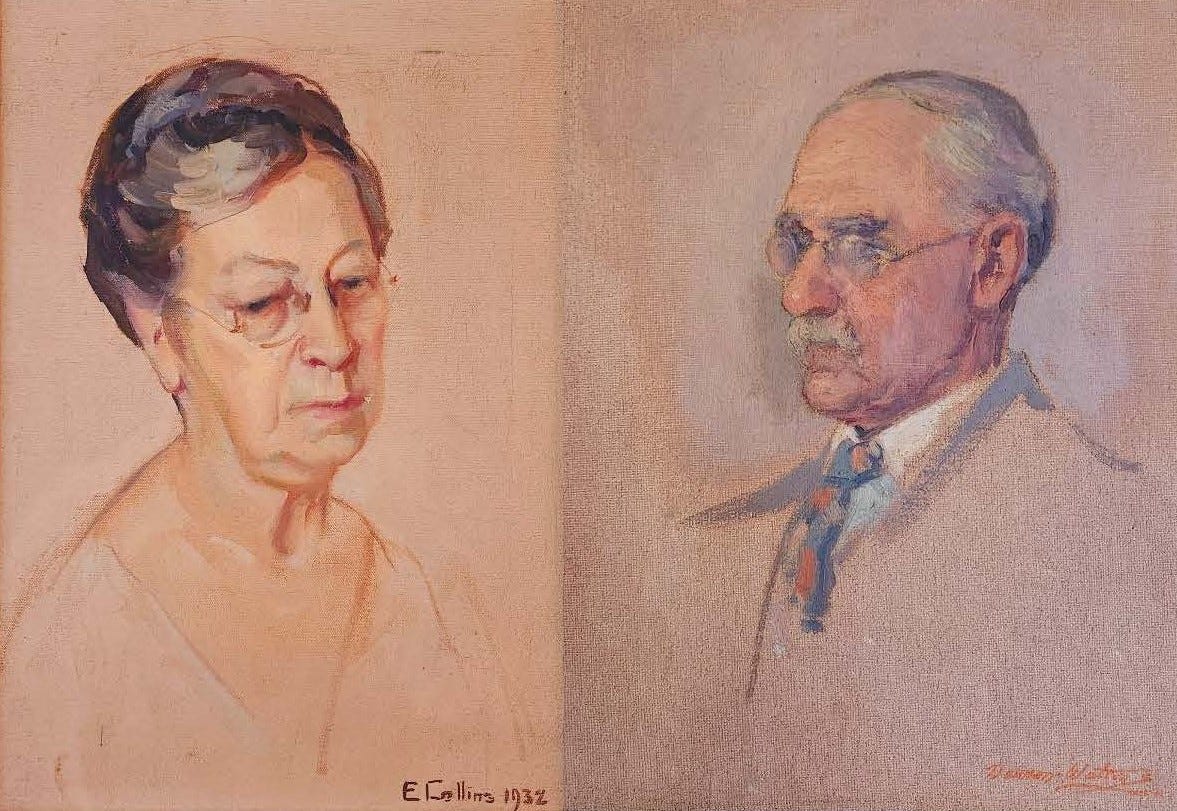
One lovely spring morning, when the magnolias had just begun to bloom, filling the air with their robust, almost cloying sweet scent – the reason Houston had become known as Magnolia City – I received a note from Mrs. Cherry:
“I have returned from San Antonio for a short visit. Only for the week. You may know that I have been living there, at Randolph Field, with Dorothy and Major Reid and dear little Wally, since Dillin’s death last August. I hope you will have time to join me for tea one afternoon while I’m here. I have so missed our tea-time talks.”
I accepted for that very afternoon by return note, and looked forward to it with anticipation. It had been such a long time since we’d visited – and so much had happened, for both of us, since the last time. For me, of course, there was Lorin. And then there wasn’t. A jolt, though perhaps not one of the major ones of life, considered in the long view.
For Mrs. Cherry, not a jolt, but an earthquake. Her husband, Dillin, mate of 50 years, had died. A long marriage, never mind how unlikely a pairing of lovebirds many of us might have thought them. I knew that he had been in declining health. The times I’d gone to the Cherry House after my return from New York, Mr. Cherry had appeared only briefly, if at all. But that had hardly seemed cause for alarm – was not, in fact, unusual, since he had no interest in the things that we were likely to discuss: art, Paris, New York, décor.
He knew nothing about art beyond the fact that his adored wife made magnificent paintings, which, in his conviction, did not receive the admiration justly due them from the world at large, or the smaller world of Houston. He had never gone with her to New York or even Paris, where her heart lived, and had no desire to go there. And though he seemed to appreciate living in the Cherry House – in the exquisite setting she had created for them – one wondered how much of the richness and beauty surrounding him there he really saw. He might have been just as satisfied living the wildcatter’s life in oil fields yet to be discovered, fields he seemed always on the verge of finding, but seldom actually found. “Affable” seemed to be the term most often mentioned along with his name. But after that mention, for the real friends of Mrs. Cherry and her art, his name hardly ever got mentioned at all. No doubt he had a circle of his own friends in which talk of such things as blowouts and gushers filled the air.
But unalike as they might have appeared to outsiders (and who can really know what a marriage is about but those in it?), the two had been married for those many years. They married in Kansas City in 1887, only weeks before she left for her first visit to Paris – and Giverny, where she was said to have been the first woman to paint – leaving him at home. By the time she returned, two years later, home had shifted to Denver. They continued what had been for the two years, a very long-distance marriage; had a daughter together, Dorothy, their only child; and then, in the mid-1890s, moved to the Texas Gulf Coast where her family, parents, brothers, sister, and finally Cherry herself (born Richardson), had migrated until they were no longer the Richardsons of the mid-west – and, in the case of her brother James, Jr., of Yale – but the Richardsons of Houston and Galveston.
That Yale educated brother, James – said to be the father of Texas high school football, drawing on his Ivy League past when he came south to teach Latin at Ball High in Galveston – had tried by letter to dissuade her from making the move from Denver to:
“a mud-hole called Houston,” where there were “some nice people, of course,” but where even those were people “entirely without taste in house decoration and adornment … who can not tell the difference between a dollar chromo and a real water-color. I have always sworn by you,” he wrote, “as the one of the family having sense and reason. Don’t destroy that faith by a nearer approach to the Southern Cross – for it is a cross, truly,” by making such an ill advised move, where disdain for “Yankees” reigned, and the sentiment was, “We do all down here, reckon as how we don’t need no longhaired Yankee female to come and teach us nothing about pictchers …”
She had made the move anyway, and Houston – indeed all of Texas – had been the richer for it.
At the appointed hour I walked up the path through her garden of spider lilies and crepe myrtles, up the steps between white Ionic columns, onto the wide veranda, and grasped the knocker on the elegant, carved door. That door, so the story had it, had been all she thought she was bidding on at auction when she won the whole house – a home for the price of a door! – though one that had to be moved one late night on horse-drawn trailers through deserted streets from Market Square to this site on Fargo, then at the outer edge (or beyond) of tiny Houston.
As I waited, I turned, looking back out over the lush garden and wondering how much longer it would thrive, now that the master of the house had died, and the mistress had grown old and might now be sunk in grief. But that is life, and gardens may be almost as fragile as life itself.
Mrs. Cherry answered her own door, and welcomed me into her parlor with a handshake and a smile. Such a tiny hand, but how powerful when wielding her brushes. Once again I thought how her now-gone husband’s pet name for her, “Little One,” perhaps rang true as regarded her person, but in no way described her personality and her talent.
“Do come in. It may smell a little musty. I’ve aired the house, with the windows open and the doors ajar, but I’ve been away for months, so a day or two has hardly been long enough.”
I offered my condolences at her husband’s death.
“Thank you. He was a good man; better than most. He never begrudged me my art, or my travel, though both mystified him somewhat. We had our life together and our lives apart, and he accepted, respected both. Not many men with wives have the wisdom or humility to do so. I was lucky that he did. We were lucky, I like to think – and I think he would agree.”
I apologized that I had not been able to attend his funeral.
“You are kind and thoughtful. But I know you were away – in Santa Fe, was it? You may know that Rabbi Barnston did the service, right here in the parlor, though neither of us are in his flock – neither of us religious, for that matter, not in the church, or Synagogue for Rabbi B, way. But they were hearty friends, even though it might have seemed an unlikely friendship – much as ours might have seemed an unlikely marriage to many.”
I agreed that some attachments, though seemingly improbable, endure.
“Indeed. And how lucky are those of us who are blessed to be part of them. I say blessed, because blessings are not the property only of religion. Blessings can come even to those of us who are the most skeptical about those other things.”
I said I knew how much she would miss him.
“Oh, yes. Every day, full as each may be with other things, will be a little empty because he is no longer here to fill his part of it. Fill it with love, though he would purse his lips and shake his head at my using such a word – using it in the hearing of others, at least. He said it to me in private many times, even after many years. But men of his generation, most of them, balked at a public image of themselves as men of love. Lovers, yes. Even my Dillin had been an ardent lover once. I still treasure his letters from that time. But it was Dillin, that private man of love, I came to love truly. That is the man I will truly miss, and remember with a fond tear, now and again, every day, all the rest of my days.”
I said what a tribute I thought that to a man’s life, a husband’s life.
“And what a blessing to mine. There is that word, blessing, coming in again. But I’ve reached the age when counting blessings isn’t only a song to be sung on Sundays. And I know that I have many to count. Which makes me grateful, even in the face of loss.”
These were not merely saccharine sentiments said because expected at such a time and from a wife. Mrs. Cherry was not the sort for that. Had she not felt the sentiments deeply and truly, she would not have said them. I knew that after so many years of knowing her. I told her how I envied her that love, which would survive the grief, I knew. (To myself I said I hoped it would. But my envy of the deep love was real, no matter the pain of the grief that came with the death of the one loved.)
When she asked me how I had been, I told her of the excitement of the Ted Shawn Dancers, who had returned to Houston in December – twice in one year! I mentioned Lorin, a young man she did not know, as a passing friend. I said that I had met a man in Santa Fe, Russell, who would be coming to Houston when he finished all he had to finish there. I supposed she understood.
“Your own enduring love may still be ahead,” she said. “ But it will come.”
We had a long visit to make up for all those we’d missed since last summer. By the time I took my leave, all the tea cakes had been eaten, as had the sandwiches that followed them, washed down by beers from the time of Mr. Cherry, and in his memory. He had liked his beer.
As I walked back down the garden path to Fargo Street, it was growing dark. I stopped at the gate, and turned to look back at the house, shaded now in Impressionist purples and pinks, the golden glow of lights showing through the sheer curtains of the tall parlor windows. She had left the link between Russell and that enduring love unspoken, but I knew that she supposed I understood her meaning. And I did. And I hoped she might be right.
Part 15: Opening Night
I had hardly stepped through the door of the tiny gallery on a mild May evening when I heard the forceful voice of McNeill Davidson coming from my left:
“These boys were very unhappy when they came to me – misfits socially and didn’t realize why. Starved, yet didn’t know where to turn for expression. I understood their needs because of what Mrs. Cherry had done for me – and so, like her, I shared untiringly all I had, travel abroad, books, materials, my very soul so that I might be able to open that door for them that she had opened for me.”
When I looked that way, I saw McNeill standing before a “wild” (for Houston, a very wild!) painting, with Miss Julia Ideson, Head Librarian of Houston Public Library, her longtime friend, and also a longtime supporter of art in Houston, opening her library to the artists and the singers and the actors of the city, for them to fill the already crowded walls and the small stage with their art.
McNeill spoke in her dynamic way; Miss Ideson listened quietly, but intently, and looked closely at the wild thing on the gallery wall before her.
“This one is by Frank Dolejska. He calls it Revealed – Self Portrait. Can you imagine how his art teacher at Reagan High responded to that!? Because he’s hardly out of high school, you know. He and Robert Preusser, and Dean Lee – you’ll see their work here too – all three from that same school and all three making work so advanced it would make art heads even in New York explode. What could I possibly have to teach them? I merely allow them to discover themselves.”
She said this with deep satisfaction as their encourager, their validator.
“I received an invitation from Miss Onderdonk, Eleanor, in San Antonio, asking for an exhibition of my youngsters, at the Witte Museum. Of course it is all because of Mrs. Cherry’s enthusiasm and appreciation for the new. She spreads word of them there even in her grief. My boys – I call them mine because a part of that most important part of them, their art, is mine, I feel – have the swellest show to be sure – better and better, as you can see around us, and I am happy with them. Robert made New York in the All American Exhibition – and only 19 years old! That kid never misses. Next year I take him to Chicago to study with Moholy-Nagy at his School of Design – the New Bauhaus. Frank is running him a close second, if it is a second.”
The two moved a little further along the gallery, to look at other paintings, and I continued my discrete eavesdropping.
“I’m proud of my older boys too, Gene Charlton and Carden Bailey. They also do amazing things. They were with me in Europe last fall – the two I introduced to you when we had the happy pleasure of running into you and Ima Hogg in that lovely Paris bookstore. Do you remember? As supremely talented young men – I really can’t call them “boys” as I do Frank and Robert – they have fine careers ahead of them. Gene especially. He already has the confidence of a master, which I hope the younger boys will grow into. And now another man, Forrest Bess from Bay City, has joined us to expand our vision of what art can show.”
Almost as an afterthought she added, “I mustn’t slight my inventive girls, Maudee Carron and Nione Carlson. They are excellent artists too.”
I smiled at this bias towards boys her remark revealed – especially poignant since she had herself known the dispiriting barriers that time and place and expectation so often built to keep women from their art.
With a dramatic flourish, she continued: “Wish I were so I could desert my duties as mother, wife and caretaker to the dear old aunt, and join Robert in that world of excitement in Chicago, and soak up all the art riches that will nourish him there. Alas! I am but the gang plank for the shore and boat – stretching myself full length that those on shore waiting may walk over my prostrate body and sail out to sea!”
All this overhearing took place on the opening night of the first exhibition at the gallery of “non-objective” art that Davidson and her band of avant-gardists had organized to show their own art. Who would have thought that artists in Houston made enough such outlandish art (outlandish anywhere but Paris, and perhaps New York) to fill a closet, let alone a gallery?!
But here it was, ranged around the walls of this new 520: Our Little Gallery, as they called it after the address of McNeill’s house, in a conscious nod to the now gone Gallery 291 – named after its address also – where Alfred Stieglitz had introduced New York, and all of America, to what had then been equally outlandish art. McNeill’s band had transformed her garage into their gallery; she now had to park her car on the street, a small sacrifice for the thrill of showing thrilling art. (I wondered if her husband shared their enthusiasm as he parked outside.)
It was a space hardly large enough to hold the art, never mind the artists themselves greeting the small “crowd” gathered to see this spectacle of abstract art by their fellow Houstonians. I saw Gene and Cardy across the room – and perhaps with them that new man, Forrest Bess. And Nione proudly showing one of her paintings to Billy Goyen and Billy Hart, both matured so much more toward manhood since their college-boy bearing of the year before. Maudee, Port Arthur wild child, seemed to float in her own other-worldly cloud as she talked with her adored friend, Margo Jones.
Grace was not there, nor Beulah, my Santa Fe companions from last summer. But this was not their sort of art, or art scene. Grace might well have been in Mexico – or who knew where? – and Beulah likely had grandson babysitting duties at home. Just as well, since the crowd already filled the gallery almost to fire-hazard capacity. With the weather still mild, some opening night visitors had spilled out onto the sidewalk, wine glasses in hand. (Not the best wine to be found, perhaps, but a fillip of continental sophistication in the wine desert of Houston.)
I had passed Lorin on the sidewalk as I came in – Ed, his window-dresser boss from the department store, beside him. We’d nodded to each other and said, “Good evening.” That had seemed enough to both of us. I did wonder if the two had become more than boss and employee – but then I reminded myself that it was not my business. I almost convinced myself that I didn’t even care.
I missed Wilma. She would certainly have been at such an outre evening, even on a work night. But she had gone back to New York, at least for a while – so that she could pine for her Parker at closer proximity, I suspected, though she would have protested otherwise. I thought for a moment that perhaps I should go back to New York myself. Or Paris?
But no. Not yet. Perhaps not ever. I still had hopes that Russell would be joining me in Houston - and soon, I hoped. Though I started to fear that hope might not really spring eternal, as the saying has it.
Looking across at Maudee and Margo, I saw that one of Margo’s handsome leading men, Albert Horrocks, the most dashing of them all, had come up beside them. She had a stable of those gorgeous leading men in her theatre company; most, though not all, unquestionably queer. I had no concrete evidence as a foundation for pronouncements about Albert – but hope sprang eternal. Should I join them and see if I could gather the missing evidence?
But no. Not tonight. As a younger man I would hardly have had to ask myself the question. As the mature man of the world I had now become, I knew that if the question even came to mind, the answer should be NO. Conquest – and even only “quest” – had become so wearying that there could be no pleasure, no satisfaction, no matter the outcome.
I stayed at the gallery a while longer. I pretended to study the art; I gave congratulations to the artists; I told McNeill of my tea-time with Mrs. Cherry – and joined her in gratitude to that wonderful woman. And then I walked back out into the mild May night to make my way back to the streetcar, and my house, downtown, alone. These days I seemed always to be going back out into the night, alone.
Part 16: Russell Arrives
One hot, sunny morning in June I took a letter with a Santa Fe postmark out of my letter box. My heart raced when I saw the mark. It wasn’t that Russell had not written before. He had done, many times since our until-we-meet-again farewell the summer before. We had even talked on the telephone a time or two (to be exact, two; I remembered precisely; why be coy?).
But as the months passed, and only letters made the journey from Santa Fe to Houston, I began to fear that the next one might bring the message I so dreaded – that he would not be making the journey himself.
And so I opened this most recent letter with dread as well as hope. I opened it after a long while of sitting at my writing desk holding it, looking at my name in the address, his name in the return, and out the window at the garden (needing attention after the storm the night before, which had struck with wind, howlings of wind, and rain, lashings of rain), and then back again at the envelope. Finally I slipped my letter opener under the flap and slit it open slowly, carefully.
For all my reluctance, he wasted no time. The first line read: “I arrive on Thursday.”
Only four days off – and my birthday! I could not help myself but to think that his long-anticipated, longed for, arrival now about to become reality must be a cosmic birthday gift given as acknowledgment and reward for my patient certainty that he would come to me in the “fullness of time.” (I had long ago convinced myself that Lorin – Oh, sweet Lorin – had not threatened that faithful devotion to an idea of a life with Russell.)
Still, I knew that a summer fling in Santa Fe, followed by a dozen letters over a few months, and two (precisely) telephone calls hardly made a solid foundation for the dreams of partnered bliss I nourished. Some might have called me foolish for flirting with such fantasies. I’d have called those others foolish for the same fantasies – if they’d been foolish enough to ask my opinion. I knew better by now than to ask anyone’s opinion about such foolishness of the heart – even the opinion of my own worldly-wise self. I knew enough of the world (and myself) to know that wisdom is the death of giddy love, and giddy love was what I wanted, for a while, at least. For as long as I could make it last.
“One day at a time,” to use the phrase I’d heard so often during my last, discouraging months in New York, repeated by an irritating reformed drunk named Bill. Well-meaning, yes, but no less irritating even though I knew that he tried to help me ease my pain, and that he was right. And so I repeated his phrase to myself as I tried to believe in this fantasy life, even though I knew I warped the true intent of his wise words as I mouthed them.
I looked at the self-portrait drawing Russell had given me in lieu of a photograph – with the thick, dark curly hair, the full beard and mustache, the eyes of the warmest depth, not melancholy or even pensive, but deep, seeing a world so much more real (and solitary) than this real world we all share. I hoped that I might soon be sharing with him the world that those eyes saw.
When the day arrived, I rose early and rushed to Union Station – rushed even though a short distance (a fact that had changed Quality Hill forever when the station had been built decades before) – rushed just as I had done all those years ago, when I made my way across Paris and through the Jardin des Plantes – and heard the Song of the Amorous Frogs for the first time – to meet Clem’s train from Toulouse at the Gare d’Austerlitz, determined not to be late in case his train should arrive early.
That day, I had been crushed with disappointment when Clem did not return, though I’d held out hope as long afterwords as I could that he still might come back. This day I hoped would be different, with Russell on the train, and me waving to him as the string of cars slowly came to a stop at the platform, and him coming down the steps and me welcoming him with a robust handshake and a grasp of his arm and a smile, such a broad smile, and my heart pounding so that I could hardly catch my breath. If only I could have thrown my arms around him and welcomed him with a manly hug and a kiss! Fantasies spring eternal. Such a greeting between men might have been possible in Paris by now – though only just – but not in Houston. That greeting would have to wait until we got back to my house, now to be our house in my fantasy.
This time, the man I’d come to the train to meet did disembark. This time the broad smiles did greet each other, the hands shake firmly, the hands grasp upper arms. Our eyes met and exchanged the manly hug that our arms could not, here in the station. This time I needn’t have feared that an empty train – empty of the one I’d come to meet – would leave me with an emptier heart. This time, with this man, our eyes embraced even though our arms could not.
My house was close, but the day was hot and his trunk heavy, so we took a taxi. As we rode, I welcomed him with a little pride to his new home. He reminded me that he’d been here before – not to my house, of course, but to Houston, as he took the train years ago from New Orleans to California, on his way to China, where he’d spent some happy years of youth and adventure, gathering news and sketching illustrations for the Washington Post newspaper. When the taxi stopped at my gate, Russell swore that he remembered seeing it from that brief visit in the past, and had dreamt ever since of living in this very house – but I put that down to the irrationality of new love (I know that too well myself) rather than real memory.
Though Russell gave no hint that he noticed, as we walked up the path, past the cast metal dogs, to the porch and door, I regretted that I had not spent more time in the four days since his letter came, clearing up the debris of fallen live oak leaves and branches brought down by the storm. There had seemed so much to prepare inside for his coming, that I’d given no thought to the first impression that the walk through debris might give him of this, his new home – our home together. Surely he wouldn’t let such a small oversight taint his vision of our future together.
Once inside, with the door closed behind us, our arms enfolded each other as they had been longing to do (mine had, anyway) since his foot touched the platform at the station. I didn’t care (and he didn’t know) that my housekeeper was no further away then the kitchen. Arms intent on enfolding cannot be put off forever. One day the world might have the compassion to see that – or those of us with arms longing to enfold might find the courage to show it. For now, at least, we found the courage to show each other, with a long embrace.
At last, when we had had our fill, for this moment at least, of holding each other, he opened his trunk and took out a painting that he had carefully wrapped in flannel shirts (shirts that would not be needed in Houston for months to come), and placed on top of everything else so that he could get it quickly.
“This one is titled A Joy Yet the Banquet Begins,” he said showing it to me. “We’ll put it on the wall in the dining room, so we can see it every day. It will make this my house too, and it will remind us at the start of every day of our joy, and the banquet life has spread for us by bringing us together.”
I took down without a moment of hesitation a faded chromo print that had hung above the mantel for more decades than I’d been alive. My grandmother had put it there. Taking it down was the first change I’d made in this house that anchored me, but also weighted me down. Replacing it with Russell’s painting seemed to lift a weight from my chest. I could breathe in the room as I had never been able to before.
His painting, replacing the relic of my past, made it a new house, our house, in which we could live a life such as those who had passed their lives in these rooms before, could not even have imagined – a life that even I could not have imagined in these rooms till now – but one that now seemed the only life I wanted to live – live for the two of us together.
Part 17: Russell On His Way
Our little Houston “Bohemia,” as Bertha Louise Hellman (an artist herself – making a name as a painter of Magnolias) had dubbed it some years earlier, had by now grown fully into the term; and in many ways it had become a Queer Bohemia, to boot. It took only the briefest introduction from me for Russell to be on his way in our little “Bohemian” Houston avant-garde art world.
He’d learned to find his way in so many worlds – from New Orleans to China to Santa Fe – that making a place for himself, wherever he was, had become easy for him. And based on what I’d heard him describe, and what I’d seen myself in Santa Fe and now Houston, wherever he was, took him in with arms as open as mine had been that day of his arrival. A mysterious allure which seemed to say, “I will let you be part of my circle – but only because I choose to,” made him irresistible. And so others flocked around him. How I envied that aura, I who often felt slightly out of step with those around me.
I also found myself a little jealous of him, after the first exquisite days, which we had spent only and entirely with each other. Those days I knew could not last. Probably even I would have grown weary of them if they had. But I did feel a pang when I took him the first time to Forrest’s studio for a rollicking evening of introductions, talk and laughter with a few who I knew would find him as irresistible as I did.
Forrest had rented an old stable behind the Joseph Carter mansion on Main Street – of the rich lumber Carters – and renovated it into a studio/gallery where he lived, made art and showed his own work and that of others – all three words, lived-made-showed, applying equally to the art and the life, since for Forrest, art and life united into a single thing.
He said that he had come to Houston, from his hometown of Bay City, in search of other men “like” him. Indeed, he had found such men – “like” in certain, essential ways – and his stable/studio/gallery had become a meeting place for several of us - even though Forrest sometimes lamented that he still felt slightly out of place: too “butch,” as they say in some circles of some more cosmopolitan cities. Perhaps in Forrest’s case an issue founded more in his psyche than reality.
It was true that Forrest hardly evoked the effeminate, as did many in the circles I’d frequented in Paris and New York, and now to a degree even in Houston. While some of our like-inclined brethren tended toward the fey, Forrest emphatically did not. No limp-wristed lisper he. Though in fact I’d encountered much more of that in New York and Paris than I ever did in Houston. It was not a pose that readily found a place in our Bayou City.
Forrest’s personal angst over the struggle of the “butch” and the “fem” within himself, took him to a theory (everything seemed to take Forrest to a theory!) as he sought to relieve the tension the struggle spawned within him. In his vision, all things sought to converge into ONE, including male and female, and helping that convergence along had become a life quest for him. One shuddered to hear some of the avenues he envisioned for achieving that convergence, shuddered and felt queasy. But certainly his theories would always be only theories. Surely no one would really do the things he bluntly talked of, involving surgeries to unite the male and female in a single body – his body!
By contrast, Russell – fluid as a willow, solid as an oak – seemed to feel no unease at all as to his synchrony with his world. It baffled me how anyone could be so at ease, so certain. It seemed to enthrall Forrest, and certainly intrigued others of our circle.
That circle included Gene and Cardy, of course, their “Gay Russian” studio on Travis Street, where they also lived together, as they had done for years, only a short walk away. A new man, Jerry Harwell from Fort Worth, now working in finance, but intent on making a place for himself as an art critic, had his “garret” on Stuart Street. Some of Margo’s leading men shared apartments (and lives?) nearby – Del Pepin, with his movie-idol good looks, and Robert Halff (they talked incessantly of going to Hollywood and stardom!). Even Russell, though he still lived with me in my house in Quality Hill, took a studio on Fannin Street, near Forrest, where he could have the space of his own that he required for work, and solitary intervals – though he made clear to me that I need not (must not, if we were to thrive together) be threatened by it. Call it Bohemia, Greenwich Village South, Left Bank on the Bayou – call it what you would, we found there a space where we could learn to be “ourselves” in the company of other men “like us.” And we knew how rare such places were, and so not to be taken for granted.
One fall evening, as we shared glasses of passable wine in Forrest’s gallery, Gene said to everyone in general, “We are a movement of some kind – whatever it is. They fit together, our pictures. After all we saw, Cardy, on our trip to Europe last year, I know that all we need is paint and canvas – and more artistic freedom – and if anything – this is slightly an understatement, I’m speaking of capability from inherent talent and the spark that makes a picture more than just another picture.”
A murmur of agreement met his words, even though his meaning may only have been half understood.
“I have the feeling that all of these things have much more importance than we know. All of it – every little piece of the puzzle, I feel, has some element that says, ‘this will be part of the inside story.’ And when I feel that, I feel that such a load is on my back – and I almost wish that I were just another unimaginative, uncreative human. But the fact blares out – We’re NOT. And so we trudge along bearing our cross.”
Even Gene could not suppress a smile at the conceit those words revealed. And then he concluded with a crescendo and a climax.
“There’s a new era in painting, and we’ve got to ride in on the crest of that wave. It belongs to us. Though we may need to go to New York or Paris, and paint like hell! It is ours – and we’ll do it. If only we’ll be willing to suffer the thing out. That keeps one alive.”
I thought, in my slightly jaded way, how invigorating it can be to bask in the boundless hope of youth, even as I remembered that the bravado of such statements from the young mask doubts as often as they proclaim real confidence. Perhaps that was not the way it was for this group of talented, young, queer men, making their art in what some – or maybe most – in Paris and New York would call a “Bayou backwater.” But even with his confident words, Gene let a hint of doubt escape.
I glanced at Russell, who had seen the world, to gauge his assessment of Gene’s views. I half expected that he’d have a knowing half-smile on his lips, the weary eyes of one whose dreams of youth had endured the slings and arrows of living. I might have seen that on my own face looking in a mirror – on those difficult days that we all have sometimes, anyway. But what I saw on Russell’s face (was I surprised; no not at all) was a look of love – compassionate, not carnal – that said, “Live your dreams, even if all around you seem intent on waking you from them.”
Of course, I saw this on his face because it’s what I wanted to see there – to see that this man who was so much the substance of my own dreams, still believed in dreams himself – that he would join me in them even in the face of this dream-battering world. Having seen the world too, and the toll it can take on dreams (oh, Clem; oh, my Cellist; oh my dreaming young self), I wanted to see that my hope, with this man, might not be just a dream. And so I saw it. Even though with a hint of doubt – just a hint, as had come along with Gene’s words. Do we ever, after conception, have a moment without at least a hint of doubt?
I didn’t say any of this, in part because I didn’t want to give it substance by saying it – but also because the room was so full of things being said that there was no need – or space – for more.
It was uncanny the way Forrest and Gene so often opened their mouths to speak at the same time. They seemed to have a special bond (as artists, that is; Cardy needn’t have any fears of infidelity – unless it might be the infidelity of art). “Don’t both talk at once!” one felt like scolding them. But in the next minute they’d be running over each other like puppies yapping, as though there weren’t words enough between them to say everything they each had to say.
And that’s how this evening drew to an end, with Forrest insisting they could do everything they needed to “right here,” and Gene persisting, “But there’s a wide world out there.”
I thought, as Russell and I walked the few blocks back to his studio, to get my car for the drive back to Quality Hill, and as our hands touched – touched but did not clasp, not here, not even on this dark street of our Bayou Bohemia – there’s a wide world here too, if we let ourselves live in it. And as Russell and I drove home, I dreamed of living in it with him, what that might be like – even with a hint of doubt.
Part 18: I Glimpse a Future
I began to have a feeling that I might be at the start of a new era of my life, the era in which I’d found the man with whom I would build a future, and that that future had begun to be built. I imagined that future opening out to a distant horizon extending all the way to the end of my days – our days, since in my imaginings we would be taking the journey to that future, that distant horizon, together.
Not that I saw a smooth plain with a straight well-paved road when I looked into the distance. No, knowing realist that I had become by now, I knew that there would likely be rough patches and steep climbs ahead, even for two mature men, old and wise (or at least older and wiser) enough to know that nothing is ever perfect, and that sometimes even the imperfect is “right” enough to make effort, and even compromise, worth the making. Fairytales of perfect love might do for children, and even for romantic youths to a point, but we were now both men, men of experience, and fairytales no longer had their power over our discerning eyes – and hearts!
Not all of this had been spoken between us, but between us much could go unspoken: we knew what we both had learned and understood about life, without words. He soon filled a place all his own in my house and my Houston life, as he already did in my heart. It seemed as though he had always been there (and, of course in my imaginings, as though he always would be). He took on an equal share of the tasks that keep life going, and gave an equal share of the joys that make the tasks worth doing.
And he brought his own uniqueness into my life in ways I could never have imagined. One afternoon he made “salsa” for me, a Mexican delight he’d learned during his time in Mexico City – a time he said he hoped someday to repeat. He crushed the last of the summer tomatoes with some of the hot peppers he’d planted in the garden almost as soon as he arrived in Houston; mixed them with garlic and onion and cilantro (how foreign to me!) and other things into a spicy potion that lit up my mouth as he himself lit up my life. A little thing, but a token of so much more.
On another afternoon, a radiant late October one, we absconded from life duties, and flew away in my car down to Seabrook on Trinity Bay, the little fishing village now becoming a day-trip destination for Houstonians weary of city bustle, and longing for a few hours of escape.
Of course it was afternoon when we left: all our little or big adventures started in the afternoon. Russell painted in his studio every morning with the devotion of a chanting monk. I knew without his having to say it a second time, that when his studio door was closed, the door was closed. And so I never tried to open it until he did. Even on those few days when he did not go to his studio for whatever reason – practical or spiritual or simply, and rarely, due to human frailty – I waited until he made clear the metaphorical door would be open before trying the handle. But after he opened it, he gave himself to me and our life together completely.
That afternoon was one of those warm October ones when the clouds billowed high into the sky like Matterhorns soaring toward heaven – more summer clouds than those of fall – awe inspiring and beautiful – pink and blue, and a pure white, like new cotton bolls just exploded open. Russell sketched the clouds, and then washed them in with watercolors, and I watched him, seeing the magnificent, gorgeous spectacle through his eyes instead of my own.
We walked the dilapidated boardwalk along the shore and felt the breeze on our faces, blowing in over the blue water of the bay, and ruffling our hair. Later, when we were hungry, we stopped at a shack on a pier for shrimp netted in the Gulf before dawn that very day, and battered and fried to succulent perfection by an old black woman who had been frying shrimp caught each day for decades. She presented them with crisp hush puppies and a Creole remoulade she made every morning as her fryer heated. The two wooden tables in front of her shack seemed almost floating in air above the water, and the boards that made the tabletops seemed saturated by the frying fat that mingled with the salt breeze that scudded up from the salt-water Gulf, air salty enough almost to season the shrimp without need for a shaker. How did we have room left at the end for the puckery lemon bars she offered to finish a meal perfect for its time and place, and which we’d remember long after we’d forgotten French delicacies?
After we’d eaten, we sat silent for a while looking out over the bay, as Russell finished his beer. Since I was driver, I didn’t drink. And since no other customers came along to need the tables, we had no pressure to leave. The old woman looked out at us from time to time to see if we might want something more. I smoked and Russell opened his pad and sketched.
After a while I realized he was sketching me, as I leaned back in my rocking chair one leg over the other, puffing my fag. I felt self-conscious when I realized it, and a hot blush came into my cheeks – as though I had things to hide, things to be ashamed of, that he would certainly see with his penetrating artist’s eye – and then put on paper for the world to see.
Of course I had things to hide; everyone does. Things that we each think are the most revealing, the most damning, the most awful that can be. Men like us, like me and Russell, and so many others of our circle – men like us come to think that we especially must hide what is the most awful thing of all, even as it is the most central to us, this love of other men. We come to think it the most awful, because from birth we are told it is – either explicitly told: “we must root out the moral rot of these human dregs”; or implicitly, by everything the people and society around us hold up as beautiful and good.
So, yes, I had things to hide. But surely not from Russell, nor he from me. I wanted with all my heart and mind for there to be no hiding between us. Nothing hidden this once, perhaps in a whole lifetime. That was the future I tried to believe I glimpsed as I looked over the bay toward the horizon, as Russell finished his sketch and closed his pad. If only I could believe I really saw it …
The afternoon had grown late; it was time to go; we had agreed to meet a group of others – Gene, Cardy, Zoe, Nione, Billy – who’d also fled the city, in their case for a day in Galveston. We’d meet up with them at our hangout on the Galveston Highway, where we often went because we knew we’d find an unfettering welcome. And a bit of space where we could breathe easier than in most places. Margo would be there too, and she would curtain off our booth with a couple of raincoats tied together, making our own private space, where we could pass around the half-pint of Four Roses whiskey she was bound to have brought. She always did, Four Roses or some other kind.
They were there already when we pushed through the door. It was already dark outside, so inside seemed bright, even though the lights inside were dim and the air smoky. It didn’t matter. The whisky had already begun to flow, and the spirits to soar. We heard their laughter from behind the raincoat curtain all the way to the door.
When we parted the raincoats and took our spots in the booth, Margo poured us drinks and Gene pushed toward us the photo they’d had taken at a booth on the Seawall – only the five of them; Margo had driven down from town for our little party after a day in City Hall convincing the powers to fund her theatre group; which they did; not even politicians could resist Margo.
For a while, at least, behind our raincoat curtain, we could act as though there was nothing to hide at all.
Part 19: Exhilarating Times
Those last weeks of 1938 and the early ones of 1939 were an exhilarating time. Russell had quickly made a place for himself in the Houston art world as though he’d been here always. In December he had an exhibition of his work, to glowing reviews: “The artist has the happy faculty of painting sunlight. … His water colors are strong in conception and free in brush strokes. His colors are clear and vivid rather than delicate.”
The reviewer might just as well have been describing Russell himself – happy, strong, free, clear, vivid. And sunlight. Certainly Russell was sunlight to me.
He showed mostly watercolors of architectural subjects, which sold well as house-portraits and seemed likely to make him a living as a successful artist in the city. Not that he need worry about warping his art toward making money. I would be there to help with that. But independent spirit that he was, he would not be beholden to anyone in that regard, not even one as devoted to him as I.
Along with the architectural works, he showed his watercolor portraits of children: “He has the knack of catching the sparkle and fleeting expression of Children.” Sparkle, fleeting expression: again, my Russell. He also showed his sketch of me at Seabrook. The reviewer, a friend, said nothing about it in print, though she had high praise for it in person; I still feared it might reveal too much.
In January the Ballet Russe returned to Houston, as they did every year for their winter respite from the frigid north. In honor of that always glorious spectacle, the balletomanes among us – that would, of course, be ALL of us – joined together to mount a group exhibition on the theme, The Dance. No one seemed quite to know who first proposed the subject, though privately I took pride in knowing the idea had been mine.
The show would open in Forrest’s South Main gallery on January 8, to take full advantage of the publicity surrounding the return of Ballet Russe the next week. And so from November, when local empresaria Edna Saunders announced the dates of the engagement, until the first week in January, all the artists of our little group whirled like Dervishes in a mad race to get their pictures (and marionettes, in the case of Jan) done in time, hearts racing faster than the races runners run. Mixing and mangling metaphors hardly seemed to matter at such a time.
All agreed that it would be a triumph of a show, perhaps even rivaling the triumph of the Ballet Russe itself, with it’s company of 150, under the direction of the great Leonid Massine. Gene made delicate paintings of tutued ballerinas, and prints of a love-addled Petrushka, perfect compliment to Jan’s actual dancing puppets.
Cardy presented some of the bold designs he’d done for local recitals and concerts of Houston ballet masters (and teachers) Alexandre Kotchetovsky and Laura Dorman. He even included his recent portrait of Dorman as an added treat (and advertisement for a friend’s efforts, and his own skill as a painter of “distinctive” portraits).
Even Forrest, perhaps the least dance dazzled of us all, found his contribution by way of a pair of dancing clowns. He did have a penchant for painting clowns – another of the slightly unnerving aspects of his mesmerizing personality.
For his part, Russell broadened the focus from the parochial confines of Houston and Russian/French ballet, to the world of dance – to the native dances of Mexico, the voodoo spectacles of Haiti, and the incredible, cross-dressing Méi Lánfāng of the Peking Opera, over whom “the girls went absolutely mad” according to reports from the Orient.
The Saturday night before we opened the door to the world, we had a little preview-party. To be sure it was a show that caused ripples spreading out across the city from the walls of Forrest’s stable gallery. Margo wondered if Houston might be ready for cross-dressing Chinese opera performers on the stage of her Community Players (and what the city fathers who funded it might think). Eddie engaged Jan on the spot to do marionettes for the windows at the Fashion Department Store for the spring; Lorin would work with her to carve them. Cardy got a commission for a portrait, even though one having nothing to do with dance. Gene cemented his place as one of the best artists in the city. And Forrest had a vision in which the clowns of his present painting transmogrified into three strokes against a solid deep blue field – which he knew meant something important, though he also knew he had not yet quite transformed enough himself to know exactly what.
After the crowd thinned – which, in the art world of Houston meant, after the twenty or thirty avid art opening goers greeted each other and the artists, chatted a bit as they sipped that ubiquitous passable art-opening wine, glanced at the art, and then moved on to the other stops of the evening – when all but those of us closest to the artists and their art had gone, we all went over to the Southern Dinner Club on Gray, only a walk away, for some celebratory supper and maybe some dancing to the music of whichever orchestra would be playing that night: Eddie Oliver’s or Benny Bell’s or Peck Kelly’s – no telling which one it might be. If all went smoothly, Gene would soon be painting a mural there. But so often all did not go smoothly with such commissions.
Oh, how I longed to be dancing with Russell, and he with me, I thought. Not possible, of course, and so not even worth worrying about. That had hardly been more than a dream even in Paris and New York, so not even to be thought of here in Houston, in the south – though maybe in New Orleans at Mardi Gras, in darkest corners. But otherwise, impossible. We all knew it and we all accepted it as the way it had to be. But the needling wish persisted that it might, sometime, somewhere, be different.
That night Russell decided to stay at his studio. I didn’t quiz him as to why. Some things you know instinctively not to do; or you know them from the sort of visceral learning that comes with touching a hot stove for the first time. He had no bed in his studio, but he’d moved a sofa in, for naps, which could do, perhaps, for longer sleeps. Or perhaps he felt inspired, after the triumph of the show, and planned to paint all night. Whatever the reason, what must be must be, and must be accepted. Explanation, and often understanding, did not enter in.
Certainly I did not understand, but I sensed that something had changed. I couldn’t know what – or couldn’t let myself know that I knew, if I did – too little courage for that. But something. When the party at Southern Dinner Club broke up – not a late party, since we all were exhausted from getting the show done (though exhilarated too) – Russell and I walked back in the direction of his studio. At the tram stop on Travis, we stopped and he said Goodnight and kissed me on the cheek: a bold gesture, so public on the street, even at night. Then he turned and continued toward Fannin Street.
As I watched him walk away, the tears welled into my eyes and began their usual course down my cheeks. How many times had this happened since that first time when I realized that Clem would not be coming back to me in Paris? Too many for the tears to be flowing again. I should have learned by now - long before now - how to keep eyes dry, heart stout. If not by now, when would I learn it?
It always, always would be tears, it seemed, in the end.
I watched him until he’d turned into the street that would take him to his studio – or wherever he’d be that night – away from me. I turned too, and walked. I’d walk back to my house; it wasn’t so far, the evening was pleasant, and I needed solitude and time. Time for what I wasn’t sure. Not understanding. Not even acceptance yet. But time. I walked toward the house almost in a daze.
For a little longer I’d still think of it as our house, but that would fade – with time.
Part 20: Not an End, A New Beginning
For most of us life is not a symphony. It does not build inexorably toward a crescendo and a cymbal crash. For most, it goes along for as long as it does, and then it ends, “not with a bang but with a whimper,” as the poet said. Eliot, that St. Louis boy I heard about during my own St. Louis days – who went into the world to change it, and did, though most of us whose world he changed may know little of him. He went to London, I to Paris: he never fully left St. Louis behind; perhaps I would never fully leave Houston either.
When I reached the house, I found Russell’s drawing of me, and his note, together on the dining table. I had no idea when he’d put them there. Clearly before the exhibition opening. I’d gone directly from a meeting of the library board to Forrest’s gallery – had not gone home first, had met him there; so he had known the whole evening what I would find when I got home; it made my consternation all the greater:
“I leave you this as a fond remembrance of our day in Seabrook, and of all our days and nights together. You said you feared it revealed too much. What it reveals is the splendid man I loved – and love still, even though no longer with him. I hope that you can still love me too.”I went into our bedroom and saw his half of the wardrobe empty. His toiletries no longer sat beside mine on the bathroom shelf. Back in the dining room I now saw that his painting no longer hung above the mantel. Perhaps I would put grandma’s chromo there again. (A decision for another day.)
Sometimes the most harrowing journeys are those of the spirit, the soul, the inner self – whatever you choose to call it. They’re the ones that, in the end, must always be taken alone. I now had the disheartening sense that I was taking up that lonely journey once again – and I had no understanding why.
In a few days a letter arrived, this time with a smudged postmark I could not read. I sat at my writing desk holding it, as I had done with that other letter from Santa Fe so many months before. Again, I dreaded reading it even as I longed to.
When I finally summoned the courage to open it, I read:
“By now you may be asking Why? Perhaps look to your beloved Proust for hints – to his Narrator’s life with his Albertine. (I know we both believe it was more likely an Albert than an Albertine!) The Prisoner is the one I mean. I offer this not as reproach, but as possible explanation you’ll readily understand because from Proust.”If only Proust were still writing to tell me, even in his circuitous way, what it was that Russell meant. But Proust was not still writing, and Russell had gone – had left only memories, and his note, and his portrait of me – the portrait that may have told too much, but did not tell what I now most wanted to know.
I sat at my desk with his letter in my hand, determined that I would not shed tears, because tears brought no answers with them.
I wished that Mrs. Cherry had come back from San Antonio, and family, for another stay in her Cherry House – now emptied of life with the death of Mr. Cherry, and emptied of vibrant art with her temporary (we all could hope) absence from Houston as she grieved her way through that loss. She might know what to say to me that might help me now.
Gene and Cardy and Forrest and Margo were all too young and confident of their splendid futures (in life and love as well as art) to help me through my own grief now, or even understand the help I needed.
But of course I knew that no one could help with such grief, at such times.
As so often at such times – and, in truth, there had been too many such times in a life I fool-heartedly liked to think clear-eyed and level-headed – I took up my pencil and wrote, as much to fill the oppressive minutes while I struggled against the tears, as to write sentences of understanding or reproach.
Without the address he had not given me I couldn’t post my reproaches (or my questions) to Russell. Though in my heart I had no desire to send reproaches. Reproaches would only taint the memories that seemed likely to be all I’d have left of our beautiful time together. Beautiful, even though cut short for reasons I could not imagine, let alone comprehend. Not now. Maybe never.
I began a letter to Wilma – still in New York, still longing for Parker – a letter I knew I wouldn’t post – wouldn’t finish – wouldn’t even continue beyond the pathetic opening: “Oh, Wilma, yes, again …”
And then, with Russell’s letter, with its smudged postmark, beside my paper I wrote:
Why am I writing this? I’ve lived a unique life – we all do – but not a remarkable one. Unlike Eliot the Poet, no histories of my time will be likely to include my name. So why am I writing this?
I’m writing it to remember – and perhaps to be remembered, for a moment at least. To remember that there was a time when I could feel so deeply that it seemed the feeling would burn up body and soul in a conflagration of feeling.
Other writers write for other reasons, I know. But for me, it’s always to remember. Even when it’s fiction it’s not made up – it’s remembered, with other names. Or sometimes, the same names. Even with heartache and pain – and with joy too – these are the memories of the life I’ve lived, all that’s left of that life, the gossamer remnant of a life that now seems almost done.
Why are you reading it? You’re reading it because … But who am I to tell you that. You must tell me that – or rather, tell yourself .
At first I wrote, “If you are reading it,” – then I deleted “If.” Because you are reading it. That makes a point of contact between us at this moment, no matter if it’s an instant after I wrote, or a hundred years. A contact that I need so desperately now. At this moment, as you read, we share a spark, the spark of life as we touch – like scuffing across carpet – scuffing across life.
These things happened, are now history. I write about them to remember. But they are not the end. They are a new beginning – the hope of one, at least. They have to be. For now, what else is left?Such self-indulgent musings are good for filling empty spaces in life if for nothing else. And such writings – reams and reams – did fill the empty next few months for me. Our house – now once again only my house – now seemed as empty as Mrs. Cherry’s. I wished that I had a San Antonio of my own to go to; Houston, and this house, now had nothing to offer me, it seemed. But where was my San Antonio?
I heard that Russell might have gone back to Santa Fe. I would go there. I heard that he might have gone to New Orleans or Mexico. I would go there. I heard that he might have gone to St. Louis or Chicago. I would go there. Wherever he might have gone I would go, if only I thought I’d find him when I arrived.
Part 21: Faltering Next Steps
In the end, I did not run off in search of Russell to any of those places I heard that he might be. The inertia of heartbreak, and of experience, proved enervating. Even staying in place seemed almost more than I could manage. And so I stayed in place, befuddled, distraught, heartsore.
Or was it the beginning of wisdom that kept me from going – that faux wisdom of abandoned lovers born of bitter déjà vu, knowing that they would be fool’s journeys whether I found Russell at the end of them, or I didn’t?
No more letters from him arrived to further amplify his references to Proust. The hearsay of his possible destinations stopped being rumored; our mutual friends stopped asking if anyone had heard; soon even his name stopped being mentioned, in my hearing anyway. And with that, he disappeared from our Houston world – my whole world, as it still felt in my darkest, loneliest hours – as though he’d never been part of it at all.
In April, I went to see the Houston Annual Exhibition at the Museum, of course; we all went to that one every year; so many of our artist friends always had work on show there. Amongst the many canvases by those I knew, what a shock to see two by Russell, including the one that had so recently hung in my dining room. So he hadn’t removed it just from some inexplicable spite. It seemed almost as though he hadn’t gone away, that I’d turn and see him coming toward me as I looked at his painting, his smile broad with pride and love as he came up beside me. But when I turned to greet him, he was not there. Of course he was not.
At the least though, the Museum would have an address for him, the place he’d be to receive his painting when the show was done. I could ask my museum friend for it – the address, though I longed to ask for the painting too. But I wouldn’t ask. If Russell didn’t want to give it to me himself, for whatever his reasons, I had no right to get it elsewhere. And no desire to. If he had let go, I must let go too.
When I turned back to the painting, the tears I’d struggled so hard for so long to keep from flowing, flowed despite my struggles. At last. I should have shed them weeks ago, to wash away the image of him that had been always in my eye since his vanishing, even as I tried doggedly to see beyond it, see the world as it now was, without him. Perhaps the washing away might help me with the going forward, with taking the faltering next steps I needed to find the courage and the footing to take.
Now, at last, I even continued my unfinished letter to Wilma: “Oh, Wilma, yes again. But perhaps you already know? Perhaps someone has told you? Russell has gone. Gone where, I have no idea. He didn’t tell me, didn’t tell me even that he was going, never mind where.
You, of all my friends, know the pain I’m feeling. I think often of your beautiful, burning poem, “Heartstorm,” the one you published in the Houston paper all those years ago – when we were young and foolish:
What shall I do? I love you – And it is too late now To turn back. Oh, what shall I do? My eyes are filled with bitter tears From loving you In vain. Do you not guess That my heart is breaking?
Forgive me if my own heartstorm garbles your searing words a bit. Know that your words, however garbled, have kept me almost sane in this time of bewildering love-insanity.
I thought of simply quitting when Russell left. Of calling it quits for a life of more than the basics: eating, drinking, sleeping, weeping. Loving – trying to – had proved almost too painful. But again you helped me, with your words, the lines you end your poem with:
Well I will try – And perhaps some day I may learn to forget May even be happy – perhaps.
Perhaps. Probably. Some day. But when?”
I sent my letter off to New York, to the last address I had for Wilma, and waited impatiently for the words of comfort that she’d be bound to send instantly in reply. Almost the last hope of comfort I still clung to.
Of course, as seems inevitable with such crushing affairs of the heart, I heard nothing from her, and my desolation seemed complete. If even Wilma, and her sharp, ironic, consoling words of comfort from a fellow love-loser failed me, what hope of comfort could I have?
And then, in July, I had a note from her, with a clipping from the Houston paper enclosed, a clipping I’d missed as I “sobbed” over my morning coffee:
“Just got yours. Forwarded hither and yon, as I made my most recent escape from New York (and Parker (tears)!), and at last awaiting me here in Houston when I arrived. Will be in touch as soon as trunks unpacked – and parents placated. Trust heart is mending – with ample “drinking, sleeping, weeping” – and will soon be ready to forge forward into LOVE again. Much Love (of that other, steadier kind), Wilma.”
Even in my desolation, I could not suppress a smile as I read her words. Yes, I had to admit, my heart was mending. By then, I thought of Russell only many times a day, not the constantly of those early days, weeks, months.
The heart was mending. I even considered making a journey with Grace John and Ruth Uhler, to Kansas City – at Grace’s invitation, remembering the fun of our summer in Santa Fe – where they would be painting assistants of Daniel MacMorris for his commission to paint the murals for the new Houston City Hall. I declined, afraid that I’d not be able to match their high spirits on what was clearly to be a trip for fun as well as work – a decision I regretted somewhat when I had a letter from Grace in which she described their adventures and mentioned that, “I have painted 12 life-sized buffalo heads and I’m beginning to feel like a big game hunter.” I’m sure she laughed as much as I that she painted buffalo heads for our City Hall, considering how rare the creatures were in Houston – one of the pictorial pitfalls of entrusting such a project to a painter from elsewhere – in this case, MacMorris from Missouri.
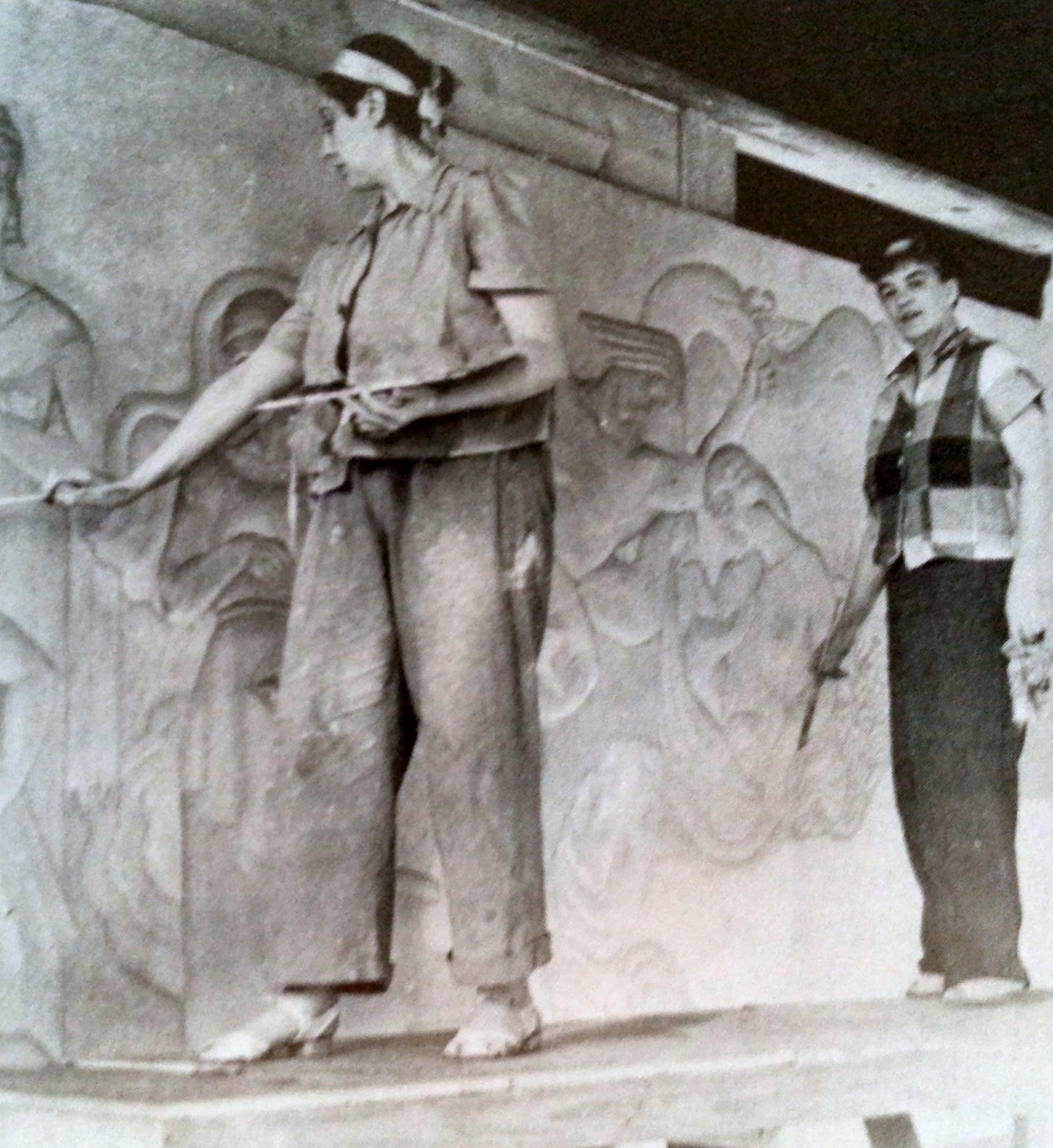
I regretted declining so much, in fact, that when McNeill suggested I join her on a motor journey to Chicago, where she would deliver her young “genius” student, Robert Preusser, in September, I readily accepted. Young Preusser would continue his art studies at the New Bauhaus, with László Moholy-Nagy, the Hungarian, German, now American, artist who had been forced by the Nazi ascendency in Germany to flee from the original Bauhaus, as had many others, some of whom had now found a more welcoming (and less threatening) atmosphere in America. Never mind that Mrs. Preusser, Robert’s not altogether congenial mother (in McNeill’s private opinion), would be among the party. She’d be returning to Houston by train, after she got Robert settled, and then McNeill and I – and the young artist, as he had time – could explore the art wonders of the “Second City,” which we laughingly boasted Houston would rival someday – a day none of us would live to see, of course!
That I’d heard Russell might have gone to Chicago would not be my reason for making the trip. But even confirmed love-hater that I had become, I could not deny, at least to myself, that the possibility of glimpsing him on a stroll down Michigan Avenue, or in a gallery of the Art Institute, was not an intriguing draw to say “Yes” to McNeill’s invitation. Hope, even crushed, endeavors to spring eternal.
Part 22: Chicago, Chicago, that Bauhaus Town
It was one of those crystalline days which may happen only in Chicago, when the heat of an oppressive summer has broken, even though it is still weeks until fall, and the air is cool and clear after a night of rain, and the sunlight sparkles off both the water of the lake and the buildings along the lake shore.
It had taken us a day or two to recover from the “jitters” of the long drive, four in the car, from Houston, via Memphis and St. Louis. I had not been back to St. Louis since my graduation from Washington University all those many years ago (many lifetimes, it seemed almost), and I wished that we could have spent more time there than the brief hour we had for gassing up the car and for lunch. Someday I would go back for a proper look around at all the many changes that had happened in the almost 20 years (gasp! So quickly passed!) since my departure. For the changed things, and for those still as they had been.
But that must wait. For this time, on to Chicago.
We introduced Robert to the New Bauhaus – known to all by that name, even though officially the Institute of Design. Only blocks from the lake, the building, said to have been an abandoned laundry, had been transformed into a modern workspace – white throughout, with great columns, huge windows – space sense from all directions.
McNeill showed Robert’s work to Moholy-Nagy, dynamo of this New Bauhaus, as he had been of the original one in Germany before the Nazis forced him, and so many others, to flee. Robert’s work, held up before the faculty, filled them with “fascination and wonderment,” as McNeill put it in her letter to Mrs. Cherry describing the thrilling encounter. (She let me read the letter before she mailed it.):
“What, from Texas?” I told Maholy “art from the byways and not the highways.” He caught my meaning, repeated it, and said, “I like that.”Materials of all mediums [McNeill enthused in her letter] – glass, wood, textile, modeling, color along with light-assistance, oh, yes, photography – the photography and glass excite me tremendously as a new medium of expression. The possibilities of light as an extension is untold.Later, taking Robert through the Art Institute – his first big show – recalled so vividly you and I in 1904, only I was the leader this time and Robert the student. As we stood before certain canvases where you and I stood before – you were with me – and tears came – my one hope – that I to him could be what you have been to me. What might my life have been had you not tucked me under your wing when you did. Please! If I seemingly cannot underestimate myself, but seem all too important, then blame yourself – your very importance to me has only made me aware of my importance to youth. We see more, hear more, feel more – and it’s great to be alive even in these war shaken times.News that the Germans had invaded Poland, that the long dreaded war had begun at last, arrived after we’d been in Chicago a few days. It was the topic of much concerned discussion the evening Maholy-Nagy had us out to his home and studio on the lakefront. It seemed the ominous culmination of all the sinister forces that had forced him to his decision to leave Germany, and the vindication of that move, which some had seen as a betrayal of the hope of sanity for the insane land left behind.
But that war was far away, though it would not stay far away for long, I feared, as the first war, the Great War, the “war to end all wars,” had not. But for now it was still far away. We could still enjoy our evening of art excitement beside the lake, seeing all Maholy’s experiments with light in his studio – again white and space – and meeting his instructors – Robert’s instructors now – in a social setting. They were a “swell bunch” as McNeill put it in her letter to Mrs. Cherry. (And one, in particular, was “gorgeous!”)
The school helped with finding Robert a place to room and board. McNeill, with the passive looking-on of Robert’s mother, selected it – what had been the parlor in one of those buildings that had been a mansion in the old silk-stocking district near the school. A widow lived there now, as she had done for decades, now renting rooms to be able to stay in the no-longer grand setting of her now only remembered grander days.
Robert’s roommate – because a roommate must be had in order to make possible a residence in even such faded elegance – his roommate was a young interior decorator of some consequence in Milwaukee, come to Chicago to learn the new style the New Bauhaus offered, already busy putting in indirect lighting and new fabrics – and eager, as soon as he saw them, to hang Robert’s paintings in their new home. I caught the roommate’s eye, and wondered if young Robert, completely “normal” as far as I had any knowledge of his nature (not that I had much knowledge of it) might be in for an education which would not involve only art.
Once we had settled Robert into his rooming house, and seen his mother onto her train back to Houston, McNeill and I drove and drove, since we had our own car.
“Mercy! But it is glorious to be alive,” she said, “when you are swallowed up in space of the lake and speed of the car on shore.”
Mercy! But it is glorious to be alive, I agreed.
We drove south along the lake to the site of the 1933 Century of Progress fair, which McNeill had visited – her first big fair since Mrs. Cherry had taken her to St. Louis in 1904, and then on to Chicago for that life-changing early encounter with art which she remembered so vividly in her letter. Seeing the site of the fair again somewhat disappointed, I could tell, since the structures remained, some of them, but the spirit, which had lifted her so high, had seeped away with the departure of the crowds and excitement of the time.
We’d thought we’d go even further south, to the site of that even earlier fair – the 1893 one, which Mrs. Cherry had attended, of course, but long before either of us had been blessed to become part of her Cherry circle. But we changed our minds. By then, McNeill’s spirits needed lifting after that minor disappointment of the now dismal fairgrounds of her memory. We could be sure that the Art Institute, grand palace of art, remembered almost in halo by both of us, would be sure not to disappoint.
Miracle of miracles, we found a spot to park the car right on Michigan Avenue, only a couple of blocks south of the Institute. With the brisk wind of the Windy City blowing off the lake, we walked in anticipation up the avenue, past the Fine Arts Building – where Jane Heap and her partner Margaret Anderson had first published their Little Review in the teens, and which Jane had brought alive in my imagination as she described those early, exciting days when I met her in Paris in the 20s. Past Symphony Hall – how we wished our visit could have included an evening there – but the season would not start till later. To the grand steps of the Art Institute itself.
We walked up the steps eagerly but slowly so that we could savor the anticipation of what we would soon be seeing, past the majestic lions – not unlike the dogs at my front porch, only more regal, and many times the size. Through the door and into the foyer, with the grand staircase ahead of us and the grand paintings awaiting us.
A tingle of excitement flashed up my spine as I came to the magnificent stair, and put my foot on the first step. And then a flood of emotion, memory, disbelief engulfed me as I heard music cascading down from the landing above – a solo cello playing a piece I’d heard many years before in another transcendent moment in another transcendent place.
McNeill must have thought I’d lost my mind as I almost bounded up the steps. I thought myself that perhaps I had. I trembled as I reached the turning, and I took the steps of the second flight two at a time. My whole body tingled, not just my spine. I gasped shallow breaths and my heart raced. I knew not just the music, not just the piece being played, I knew the soul of it also, the soul that made it the life-force of a single cellist. I could not believe what I knew – thought I must have gone over into some other world than the one I thought I inhabited. I reached the top step and saw the cellist making the music, and gave one final gasp, and felt the tears pour from my eyes and down my burning cheeks. There before me, playing the music he’d played for me those years ago, in the ancient Roman arena, in Paris …
MY CELLIST!
Part 23: Keep the Music Playing
… and in a twist unlikely enough to try the credulity of even the most devoted readers of romance novellas – and flaunt the audacity of their authors – not only My Cellist on the landing, but Clem as well – standing off to the side, watching him play, listening to his music, beaming a bit, as I had beamed that evening all those years ago in Paris, hearing the same music curling up from the floor of the antique Arènes de Lutèce, drawing me in – drawing my heart in – until there could be no escaping – even had I wanted to escape.
“Suspend disbelief,” Coleridge said. Suspend probability as well.
But probable or not, there they both were, before me now on the upper landing, a massive painting by El Greco rising up behind them through the arches, The Assumption of the Virgin, rising as high as the music.
Flooded with feelings so overwhelming I stood no chance of knowing what they were, I became one of the small audience circled around My Cellist, across from Clem, listening and watching, first one of them and then the other. They did not see me; or, if they saw, did not recognize me. Not that the passing years had changed me so much, just as they had not so changed them. All older, of course, beginning to grey, waists beginning to thicken, faces beginning to wrinkle, but still the same men we had been, eyes still sharp enough to see beyond the changes. I recognized them instantly, the music priming my ears, and eyes for those I knew I’d soon see (for one of them, at least) as I rushed up the steps. But their eyes had no reason to suspect they’d be looking at, seeing, me.
I had the advantage of them: I could watch, know those I saw, grapple with what I might say to them if it came to that, decide if it might be better (better for me, no thinking yet of “better” for them) to simply fade away and leave the past the past.
But the past isn’t past. Someone had said that, or would someday. So there was no hope of fleeing from it. Just as there had been no hope of escaping the siren tendrils of that music I’d heard then, and now heard again.
I thought I had seen them for the last time that evening in Paris when I’d glimpsed them through the window of Café Gaudeamus, sitting at the table I’d sat at so many times on so many perfect evenings with each of them separately, before I no longer had a place at what had become their table.
And later, when I left Paris to return to the States, I thought I left them behind. But I soon found that I was wrong. That past, with them part of it, stayed a perpetual present for me, everywhere I went, with whomever, later on. Not in a painful way, later on, but persistently.
Still, I never anticipated encountering them again as more than memories. Yet here they were. Here I was. Not even the most skeptical could fail to see more than coincidence in it.
My Cellist brought the music to an ethereal end (exquisite seemed too impractical a term), and nodded in appreciation of the applause. Clem applauded with the others, as did I; and I watched as their eyes met, and My Cellist smiled at him. Watching, I saw them look at each other in a way that made me envious. Had either ever looked at me in that way? Had anyone? I wanted to think so.
After a few moments, Clem looked across the landing, and his eyes, in their scan, came to rest on me. Slowly (so it seemed, though only moments more) the look of remembering, and then of recognition, and then of disbelief filled his face. His applauding stopped, hands still raised, and his eyes widened. My Cellist, seeing the change in Clem’s face, looked my way too.
I knew it was too late to flee, but, oh, how I then wanted to. I could not imagine what any of us would say when the now inevitable need for saying something came. For a few seconds I thought we might all just agree to pretend not to recognize. I half wished that might be so. Almost half wished it, but not quite.
Then My Cellist stood up, and Clem came boldly across the landing. He put out his hand to me: “I can’t believe my eyes!”
My Cellist, still carrying his cello, came up beside him: “So it is truly you?”
“Yes, truly,” I said, shaking Clem’s hand, and smiling at both of them.
“And do you live now in Chicago, as do we?”
I explained the reason for my being in Chicago, and introduced them to McNeill, who had joined us.
“Lovely,” My Cellist said. “But not the Houston lady we met with you at the Théâtre des Champs-Élysées, I think. We have been amis à paris many lifetimes ago,” he explained to McNeill.
Clem told us that he had returned to Chicago at the death of his father. The family business needed Clem to head it, as did the family. My Cellist had come with him, as a matter of course, an arrangement that all in Clem’s family, and his social circle, agreed to understand as a matter of patronage rather than partnering, which they could not have admitted to understanding.
My Cellist (I would always think of him as My Cellist, never mind that I’d known for years and years that he’d become Clem’s Cellist – or someone else’s) taught private students, and played in chamber ensembles with a specialty in modern French music, and hoped, one day, to secure a chair in the Chicago Symphony. His playing warranted such a chair, Clem declared, but such chairs were rare.
McNeill, mistress of getting to the heart of things, with her curiosity and her questions, took charge of the conversation then, and lifted the weight of the disorienting (because so completely unanticipated) encounter from the shoulders of the other three of us. I stood back half a step, deferring to her completely, listening as she wondered to Clem if Mrs. Cherry – that other Houston lady – hadn’t described the meeting at that Paris theatre those years ago: Was it at a show performed by that American dancer, Josephine Baker? Clem confirmed that it had been. Had they been back in Chicago long? A few years now. And did they both like it? I more than he, but I have my work at the business – but how we both missed Paris. I was there just two falls ago, for the Exposition Internationale. We had left already by then. Oui, Paris est magnifique, but Chicago n’est pas mal either.
With no necessity to take an active part in conversation, I stood back half a step and observed and remembered, almost not even listening. Clem and My Cellist stood close beside each other, as couples of long standing do – still mostly happy couples, anyway. Clem did most of their talking, perhaps from habit laid down in their early days “back home,” when faulty English fluency, or mid-west accents, might have been a damper on full-throated conversation by both. Or perhaps it was a long-honed meshing of personalities, a mode that worked for them.
As was his nature, and hers, after the first moments Clem and McNeill talked as though they had known each other always. I watched My Cellist, trying to suggest that I glanced back and forth between the two, but really not, seeing only him. He listened intently, nodding agreement, half whispering Oui more than once, tilting his gaze slightly down, focusing on nothing particular. It was not a demeanor I remembered for him from our Paris days; but also not one that he seemed to chafe against.
Standing in my almost isolation, half listening, watching, but only half seeing the now before me, I went back in my mind’s eye to the Madame’s garden in Paris, the room overlooking it where the three of us had known our perfect Paris bliss, not all at the same time, but all in the same place, for a while, long ago. Surely we were still too young to be captured by the old-man longing for that vanished mythical time of youth – and young love.
But no, it would appear not too young for that captivity, not me. Yet even as I yearned a bit for that time, remembered it with a glistening eye, lamented in that sentimental sappy way the passage of that time, and so much other time after it, I knew that I didn’t really want it back; didn’t really want these men back either, though that knowing would be a while in becoming certain. No, the past isn’t past, it’s always with us in the present. But those from the past, escaped from that other world, where we remember them, to join us in person in our present? Are we prepared for them?
I’d thought earlier that we were still the same men, despite the differences time had brought. Now I realized that we were all different, no matter how much the same. The time of us together, however paired, had passed; it was a new time now, and we were different men. That fact, forced before me with the coincidence of our coming together that day, had meaning beyond my understanding then; perhaps understanding would come with time.
I returned from Paris and the garden in time to hear McNeill saying: “We have a symphony in Houston too, and a good one. With chairs open for cellists, I suspect. And as for business, we are booming. The call really should now be, Go SOUTH young men!”
We all laughed at her thrust of humor, and agreed that times had changed.
Calling cards were exchanged. The suggestion floated that we get together for a dinner. But McNeill and I already had a farewell supper planned with Robert; and the next morning we would begin our return drive south. And so we agreed to make the dinner “next time,” in either Chicago or Houston, all knowing the dinner certainly would never be served.
We shook hands again, and parted. And three of us thought back to the Paris we’d always have, so different, no doubt, for each of us. The Paris of that other time, when we were those different men, now long departed.
Part 24: World on Fire
McNeill and I returned to Houston with a true case of the road “jitters” after the long drive, and with memories of many things, both exhilarating and unsettling, to work through in our minds. It was to be the last trip we would take for a long time without the specter of war hovering near. Even though the shooting war for us Americans would not come for two years yet, we all sensed that it would come eventually, and so it always hovered close, tinting everything.
McNeill returned to sad news regarding a “pal” of her son, Randolph:
“… our John – Frenchy, we called him," she said in her note, "– son of Dr. Mori of Rice Institute (don’t know how to spell the name) – has been killed in action in France. For two years he came to me almost daily in the studio and sat. Nineteen years old, so handsome and gentle. His father was so ambitious for him. He volunteered for the French navy and on the third day fell a victim.”Even as she mourned for her lost young friend, she feared for her own son, who would soon be of age to be sucked into the “blood and destruction.” And also her other boys, her art boys.
I commiserated with her that it might happen; it had happened before, as we both knew well.
“And ye shall hear of wars and rumors of wars: see that ye be not troubled: for all these things must come to pass, but the end is not yet.”That passage came to mind though neither of us were overly religious, in that way, I suspected (certainly I was not); but even so, perhaps the beauty of the language could give some comfort – and the reminder that the end – and the war – was not yet reality for most of us on this side of the ocean, for now.
I returned to a life, and a house, which both felt a little empty – or not empty, but somewhat lacking, now that I was again alone in them. I felt as though I had awakened from a pleasant dream – an oh so pleasant one – to find life much as I remembered it from before I fell asleep. Not awful, but ordinary, antithesis of the life in those pleasant dreams with Russell. Of course I knew that even if I fell asleep again, I could not recover that dream. It’s enough to hope that we might remember dreams – only the pleasant ones if we’re lucky – never mind reenter them.
And so I reentered the life from the time before Russell. Forrest had given up his studio-in-a-stable and gone back to Bay City, his hometown. Back to a closeted life – no, a celibate life, since he vowed to give up his life with other men “like him,” which his father could not have understood at all: he vowed to take no actions that might “hurt anyone other than myself,” he said.
But he had not cut all connections to those of us from his Houston life. In November, Gene and I drove down to Bay City where Gene would work with Forrest on murals for the New Texas Theatre, with the assistance of their flamboyant friend, Molly, a Bay City girl herself. The subjects of the murals – the pioneer, agricultural, industrial spirit of Matagorda – hardly seemed the likely inspirations for either artist, but “the coastline commands the horizon,” according to the newspaper description, a coastline Forrest knew well; and the design “centralized around the workman,” certainly an inspiration for both artists. I spent the days, while they painted, driving along the flat coast, through the endless almost empty stretches of marshland, watching the shorebirds swoop above the glistening water, and the occasional boat sail across the wide bay – and remembering that day, now long ago, in Seabrook (perhaps only a dream).
We all tried to believe that life went on as usual, even as we sensed the usual slipping away.
Our little band of artists continued to have success. Forrest’s painting Bread and Potatoes, which had already been shown at the Corcoran Gallery in far-away Washington, D.C., became part of the Houston Museum collection, a gift of the artist, true, but still eagerly accepted by the museum. And then, early in 1941, the museum hosted a one-man show of his work, to high praise from no less a critic than Houston’s own penetrating art discerner, Stella Hope Shurtleff, who saw, “the work of a man of vision … who gives evidence of having a future, it may not be an exaggeration to say, a destiny.”
Young Robert sent three works to the Exhibition of Houston Artists, that annual juried show of the best work made by those who were our own. Wild works, to be sure, by local standards, even wilder than those he’d shown already, building on the wild things he was learning in Chicago. But wild as they were, they won the annual purchase prize to become part of the museum collection too.
And at the very next Houston Annual Exhibition, Gene won the same prize, and also entered the museum list, for a group of three of his gorgeous still lifes of oranges and eggplants and roses, so richly colored and richly painted they seemed too rich for this poor life, more fit for an Arabian Nights or Pre-Raphaelite other world. A fourth of this beautiful group had already gone on to a life in the wide world of art when the London and New York art dealer, Duncan MacDonald, of the Bignou Gallery, bought it out of Gene’s studio (the studio he and Cardy shared), on a stop in Houston, as he toured America in search of art as yet undiscovered in the art capitals, art that could take its place there among the best. Gene’s work, so MacDonald said – and he would know – passed that test!
Some things seemed to go on as always: the sun continued to rise and set, the nights continued to go on interminably, the summers continued hot and humid, Margo continued to mount her plays – all unstoppable forces of nature in our Houston firmament.
But even so, I sensed that unrelenting thief, change, creeping toward me from all sides. With the turn of the new decade (making mine now a Queer Houston Story of the 1940s), I had reached middle age, no point in denying it. I felt it in my body – I no longer sprang eagerly out of bed in the morning, though still grateful I could get up at all!; and I felt it in my outlook – I thought of the past now at least as much as of the future.
I heard the sounds of construction in our booming city advancing toward my little acre, precursor to that day when I would no longer be able to afford to stay in Quality Hill. I’d talked already with some friends, rooted in Houston’s past almost as deeply as I, and, in the modern city, almost as irrelevantly, about moving my house, along with some others that might be deemed “historic,” to some graveyard of antique buildings somewhere out of the way of “progress.” But that was still only talk.
Forrest had departed for Bay City; Wilma had fled to San Diego, at the behest of her friend, the sculptor Mable Fairfax Karl (go WEST young woman, in quest of a new, free life!); Russell, of course, and all the hopes and dreams he embodied had gone. McNeill too left – “moved to the country for a more peaceful way of living,” back to her home ground, West Columbia, in Brazoria County, not far from Houston, but far enough that it might as well have been Mongolia when it came to the lost comforts of visits and long philosophical discussions.
And then, at the end of ’41, our world as we had known it exploded, as we had long known it would eventually, with Pearl Harbor and declarations of war!!
Then the changes came so quickly and from all directions; there was no chance of keeping up.
Over the next months, with mobilization, all our young men put on uniforms – and were gone. With so many of her leading men, and her supporting actors, and her set designers and stage managers vanished to distant places around the world, even Margo had to surrender. She left for Austin and teaching at the University in the fall.
Those young men all marched off with patriotic fervor, as so many had done in that last war, which, as it appeared, had not been the one to “end all wars.” Who knew which of these boys would come back when the war had run its course and the world had enough killing – what the world would be like then – what they would be like. Having lived through history made unavoidable the certain knowledge that some would not return.
The one solace, perhaps, would be that Mrs. Cherry had returned to Houston when her son-in-law, Major Reid, got his orders for a new posting, out of state. Her daughter, Dorothy, and grandson, Wally, would go with him, of course, so she no longer had any reason to stay in San Antonio. Even empty, the Cherry house still in Texas, still home, offered her a mooring. And, now that she would be back filling it, offered me a mooring too, a place of remembered pleasures and beauties, where the two of us could drink our tea, and talk of the past – Houston of old, Paris – and of art as we tried to help each other forget for little whiles that that past was gone, that change had stolen it.
Part 25: Of Postmarks and Smiling Spiders
I had long ago given up any hope that I’d receive another letter from Russell – the one that would make the reasons for his abrupt departure clear: I tried not to think of it as his abandonment. No, there would not be such a letter, could not be one clear enough to meet my need, so why even hope for it?
But one day toward the end of 1942, after all our young men had gone, and Margo had gone, and McNeill had gone, and Wilma had gone, and I had come to feel that the whole world I’d known had gone, I received an even less expected letter, this one with a St. Louis postmark. How I had come both to love and to fear postmarks over the years.
A letter from Clem!
It was not as though we’d become pen pals since that improbable (impossible almost, outside the pages of romance fiction) reunion at the Art Institute, now years ago. Certainly we hadn’t. There had been one Christmas card the first year, and then nothing more. I had not thought to send even a card myself, so had no grounds for complaint that there had been no more. Truth be told, I hadn’t even thought of it enough to think of complaining. Which was not to say that I hadn’t thought of them from time to time – on lonely nights, or at teatimes when Mrs. Cherry and I went back together to that Paris we’d all “always have.” But thought of a letter? Never.
This one I opened readily; no lingering in anticipation or dread.
After his greeting – more affectionate than I might have expected, but welcome as I read it – Clem wrote:
“Yes, St. Louis. Your stomping ground of old. Our Cellist (Clem, of course wrote the name, which of course I knew, but at first hardly comprehended as naming the man) has secured his cello chair at last, with the St. Louis Symphony. He pronounces it in the French way, much to the consternation of the locals, and sometimes of me. My family sold the business, and so, with nothing in that line to keep me in Chicago, and with a stake to set us up for the future, I had no reason not to join him in Saint Louie. So here we are.“We have an apartment in a semi-posh building in the Central West End – the Hawthorne, it’s called, built in the ‘20s, so probably after you left for Paris.“St. Louis is not Paris or even Chicago, as you will know, but not a bad place. He’s in heaven with his music, which, as you can imagine, makes life pretty heavenly for both of us. And we’ve met a few real doozies to pal with. One fellow in particular, now mostly in New Orleans, though back to St. Louis to visit his “harridan” (his word, not mine) mother. He writes plays, which are just beginning to take off. Attended Washington U, but long after you departed. (Can we be getting old?) Calls himself Tennessee, though what he has to do with that state is a mystery. Says he might have a chance with a woman director there in Houston, his agent says so, anyway. Margo something. If you know her, put in a good word. Even though you don’t know him. For an “old” friend?!“And if you ever make it to St. Louis, come visit us. Come stay with us; we have room. We’d both love that.”Wow! A letter to send me reeling, whether Clem meant it to or not. Me visit them? I laughed a sardonic laugh at even the suggestion. Clem, who could be a bit obtuse when it came to anticipating the feelings of others – and perhaps, even his own feelings – might not have considered how impossible such a visit would be. But My Cellist? He must know. So perhaps Clem dashed off the idea without even consulting him – just to round off a letter with the real intent of helping his Tennessee friend, an implied tit-for-tat: help my friend/bygones will be bygones. Which in itself might make a cynical spurned lover of the past wonder about his motives – had his letter been read by a cynical spurned lover of the past – instead of by me.
No, impossible for many reasons, not the least that Margo had departed, so I could not fulfill my side of the tit-tat transaction. And more impossible still because of the rawness still painfully there as I remembered that one lover had left me (abandoned me, not avoiding the term this time) for selfish “family” reasons incomprehensible to my heart, even if my mind might have entertained a sliver of understanding. And that the second lover had deserted me for the first. Some betrayals are too blazing to burn up pride, even if hearts might be able to be blind to them.
Heart, that old deceiver, with its web of heartstrings. Like Redon’s smiling spider, cocooning us in silk so that sucking us dry will be easier. By now I knew the trick and would not be ensnared again.
All tosh, of course. Of course I would be ensnared again! I remembered those first days with Clem, in Colorado Springs, when he despaired for his young dying wife, and I could give him some whisper of comfort. The days in Paris when we gave each other more than whispers, until he vanished. The days with My Cellist while the music played. And then the dark days, weeks, months, years, after I saw them together through the Gaudeamus window, and the music died. (Breaking the illusion with a bald anachronism, which time, however, will show to be not an anachronism at all. Sentimentality knows no shame.)
But it was New Year’s Eve, and opening night of our Houston Stage Canteen, which some of us had planned and built in the basement of the old Auditorium Hotel downtown, as a safe place offering some respite from the unsafe world they now lived in to the new boys in town in place of all our own boys now in other towns around the world – call them “boys” even though old enough to be in uniform, to be killed, to be dying on battlefields. I had joined the effort to make the Canteen a reality with my enthusiasm, and a little of my money. And so I would go to the opening night. I would put my own concerns on pause for the event; or I would try.
Many that I knew would be there: Lorin, stationed for now at nearby Ellington Field, who had painted the mural decorations – on a circus theme. Gorgeous little Gertrude Levy, a latter-days addition to our theatre circles, first with Margo’s company, and now that Margo had gone, with others – only 18, but such a beauty; I suspected she would be the death of equanimity for so-called “normal” Houston men for decades. She would likely be accompanied by that almost as gorgeous leading man, Albert Horrocks.
Who else would be there? Almost easier to list who wouldn’t be, from among the movers and shakers of Houston society now that war had limited the justifiable occasions for celebrating while others died. It would be THE event of this holiday season, giving those of us who were not in uniform, not risking death, a chance to put on our own dress uniforms of another sort and march (strut) for a few hours as though we too were doing our part. As I suppose we were, in a way.
Part 26: Farewell Party at the Stage Canteen
No chance of rain. Temps near 60. Parking a car likely a nightmare, with the crush. So not even a question: I would walk the few blocks to the Auditorium Hotel for the preview party at the brand new Stage Canteen, sure to be the “gayest spot in town,” according to the papers (though they may not have fully grasped all the meanings; or perhaps they did). This would be a rare chance for us civilians to party in the Canteen, those of us not in uniform.
We’d planned our Stage Canteen, patterned on those already opened in Hollywood and New York, but this one all ours, as a place for the young soldiers who so recently had put on the uniform, and been shipped far from home, often for the first time. At the Canteen they could spend off-duty hours in a welcoming, safe spot: no alcohol, no dark corners in smoky bars abounding with temptations to debauchery. Because some civic (and moral) custodians already foresaw potential dangers, evil dangers, with so many naïve – and some not so naïve – young men abroad in the world without mom or preacher nearby to keep them on the “straight and narrow.” A clean, well lighted place, as Ernest wrote in one of the spare stories that had made him famous since those days when I’d known him as an aspiring writer (though inattentive husband to Hadley) in Paris in the 20s.
I might not have gone to the party at all, except that Lorin had painted the murals, on a circus theme, intended to transform the drab basement into a festive recreation space. I had not seen Lorin for some time, since before he, and most of the other “boys” of our Houston Art Bohemia, put on their uniforms in that great patriotic rush of enlistments that followed Pearl Harbor – uniforms that made them all look so manly – Lorin certainly so, if the photo of him in the morning paper a few days before could be believed. The picture made him look so much more a man than the boy-man I’d known those years ago; no less sweet in personality, but no longer tentative in person. I wanted to see the grown man in person – and in uniform, I admit it. As the artist (along with Ed, his newer friend and former window-dresser boss at the Fashion Department Store) likely he would be there.
I pushed through the Canteen door into a bright room filled with revelers in finest feathers, at work making merry this special evening, a gray A-list of Houston civic citizens – not the cream of society, perhaps, but those who felt a mission to work toward what they saw as betterment for our city. Exactly the crowd I should have anticipated, but somehow hadn’t. Lorin’s murals surrounded me on the walls, but I did not see Lorin, nor any of the other intimates of the life I had built in Houston since coming “home.” With all the others gone their different ways, it seemed that I alone survived to remember that life.
From the stage, the fast and furious music of the Ellington Field Jive Band; on the tiny dance floor, simulating a railed-in circus ring in keeping with the decorative theme, couples (boy/girl couples only, of course, and all white) cutting a rug with the latest dance steps – steps I had long since failed to learn.
In a while, the crowd parted – nothing Biblical, only the currents of flow around the room – and I saw Lorin far on the other side, ebullient as he basked in the praise of his murals from the circle around him. Murals that created “a circus in miniature,” according to the newspaper write up: “… amusing decorations done with skilled artistry. Brilliant-hued tigers and lions, caparisoned horses, clowns, figures of aerialists, and even a ferocious gargantua behind the bars, adorn the walls bordered by red and white canvas.”
Slowly I made my way across the room, in his direction, but not toward him, so that perhaps he would not notice, saying a word or two to many as I went, becoming an actor playing a part that called for nonchalance.
As I came closer I heard him talking, in the sweet happy way he had when not overshadowed by the troubling things of life: “Who would have thought that the Army would order me to design sets? Amazing! They even want me to do sets and costumes for an original musical comedy to tour bases all around the country. Maybe even overseas. The book is not very good – I’m being kind – but the music is very, very good – several numbers that you’ll love. I’m only a private, so I couldn’t say NO, of course. Already I know, when the Army asks, privates say YES. Not that I thought of saying NO even for a minute. To tell the truth, my commanding officer at Ellington Field is a lot less commanding than Margo ever was.” He laughed, and the sparkle of it melted me.
Seeing him again, so close, manly in his uniform, bubbling happy, as he had not been after that troubling talk that last morning at my house, I felt a surge of desire, as much for all the men I’d ever desired – as much for Clem, My Cellist, Russell, the Lorin from then – as for the Lorin I saw standing just over there, now. And also felt a longing to be desired, by him and them, as ultimately I was not. A desire to be desired that lives apart from sex or love, seldom thought of, but always present from birth to death, I suspect. And for most of us – perhaps even the most desired – seldom satisfied.
Ed stood beside Lorin. I saw the backs of their hands touch briefly. Most of those in the circle would not have noticed, or would have thought nothing of it if they saw. I saw. I knew that I would not find the desire I pined for, there, that evening.
As I walked the few blocks through the mild night back toward my house, I thought back to those times with Lorin; and those with Russell; and those with so many others before them, in New York and Paris. Not so many, in fact, but more than a few. I thought back to them with a tear.
I sometimes (often!) suspect that in my constant rumination on life and love, I plumb the shallows of sentimentality, more often than going for depth. But how much better are seriousness and depth, really? Have they saved the world yet? I read once about a young man who died of melodrama. I was touched but thrilled. The fact that the text actually said “melanoma” made even death seem almost mundane when I realized my mistake. After all, it might not be such a bad thing to die of melodrama.
Even without champagne, and a day early, this would be my New Year’s Eve for 1942. It had not been the youthfully (can we call it that) innocent (I blush to say it) New Year’s Eve at Wilma’s not so very long ago, when I first met her band of gay boys, and first saw Lorin. Or the New Year’s Eves in Paris; or the truly innocent ones still further back. But even the most delirious deceiving heart could not raise hopes of a return to New Year’s Eves like those. Older and wiser as I had become (remarkable how older and wiser is an ever-moving target), I now knew not to wait for the return of such past innocence. Youth had long-since flown.
“Old time is still a flying,” no denying it. But I hoped that perhaps I might still have at least a little time left for gathering rosebuds, even if slightly wilted ones. I was not dead yet, either from melodrama or anything else. I still had a future.
Such was my cri, or at least whimper, de coeur – perhaps that whimper Eliot mentions in his poem.
And yet, as I walked past the mirrored kiosk on the street in front of Levy’s Department Store, and caught the eye of a young man in uniform, “combing his hair,” a young man here to take the place of one of our own young men in uniform, perhaps gone to wherever this young man came from, to replace him for a while, and as the young man’s eye quickly glanced away toward another young man, also in uniform, also from someplace else, my whimper-de-coeur trailed away into a resigned, and somewhat humiliating, whisper. I picked up my pace a bit to get back to my empty house sooner.
New Year’s Day, I went to tea with Mrs. Cherry.
“St. Louis?” she said, a bit as though she’d misheard me.
“Yes, St. Louis. You know I went to college there, to Washington University, back when it was almost new – and I was too. I haven’t been back in decades really. McNeill and I stopped there briefly when we took her young Robert to Chicago, to the Neu Bauhaus. But otherwise, not.
“But I’ve had a letter from my old friend, Clem. The fellow you met at the theater in Paris, the Josephine Baker night. Do you remember?”
She said she did.
“Baker is originally from St. Louis, you know. But that’s neither here nor there. Clem and My Cellist live in St. Louis now, and he suggested that I visit. At first, of course, I thought that preposterous, impossible. Perhaps you know why.”
She said she did.
“But then I thought, Why not? Perhaps I’ve done all I need to do in Houston, at least for now. I know that I’ll never leave it completely behind, just as I’ll never leave Paris. The past is not past so long as we’re here to remember it, to continue living it in our present. But sometimes the past can be too present. I’m beginning to feel that – in my house out of the past, and even in this city primed for the future. With almost all of those who made the city home for me again after I returned, now gone – except for you, of course, chief among them in easing my return – but with so many gone, and stuck as I feel, almost drowning, in that past, and since I now have friends in St. Louis, even though friends with whom I also have a past, I thought, Why not? It might be just the goose I need to get me looking towards the future once again.”
She agreed it might.
And that night, when I got back to my empty house, I wrote Clem a reply, which I would post first thing the next day: “I accept your invitation. I hope you meant it. A new year, a new adventure. I’m on my way!”

